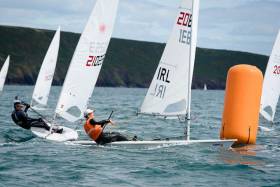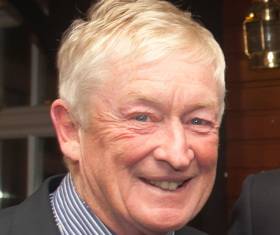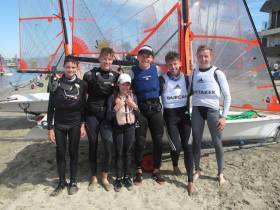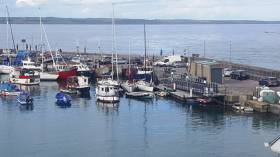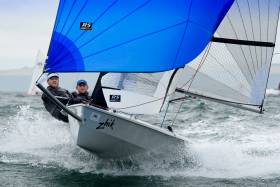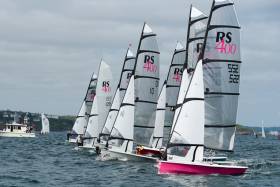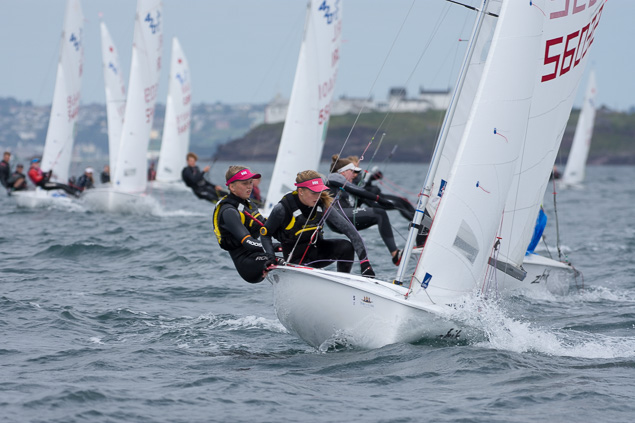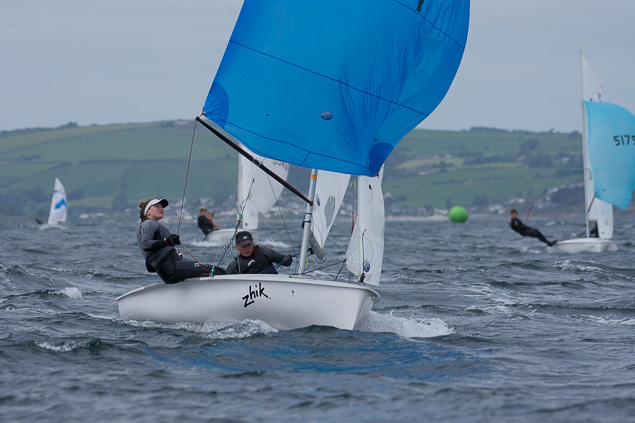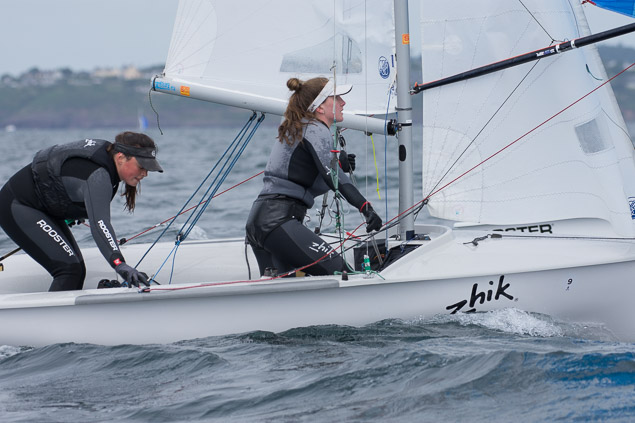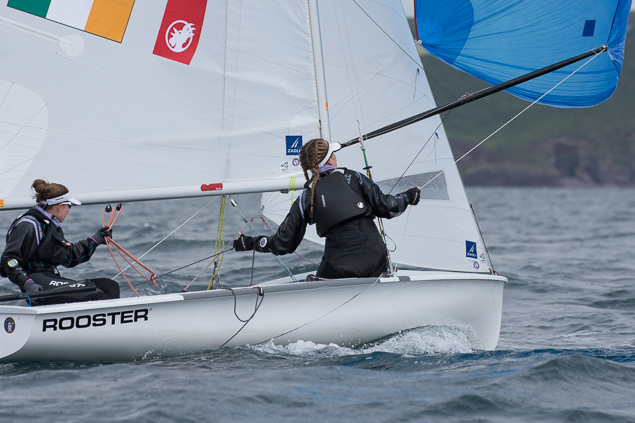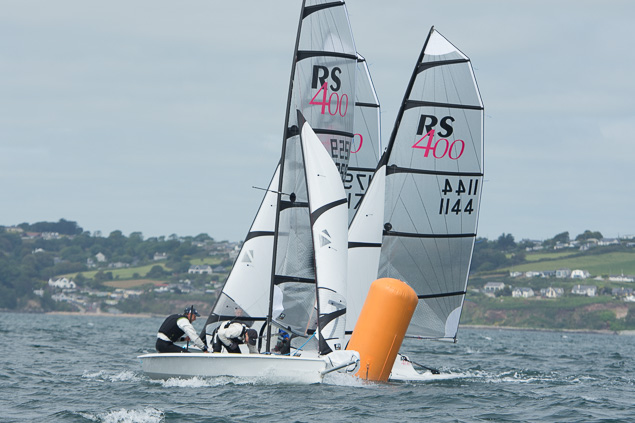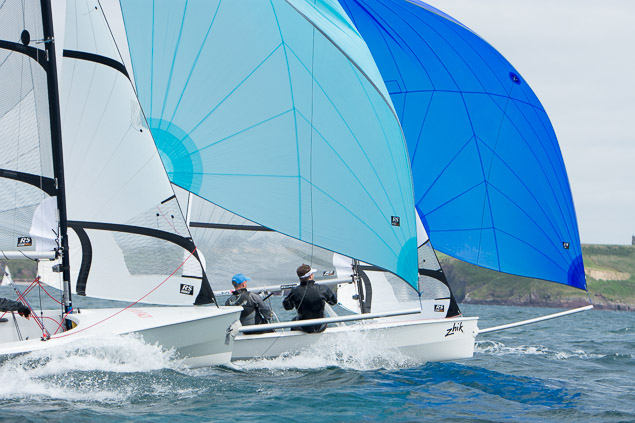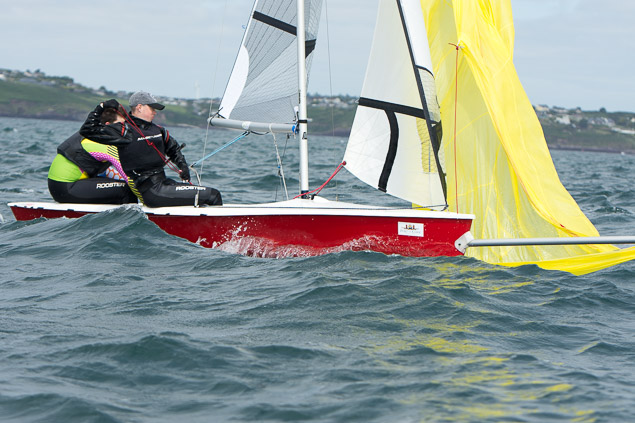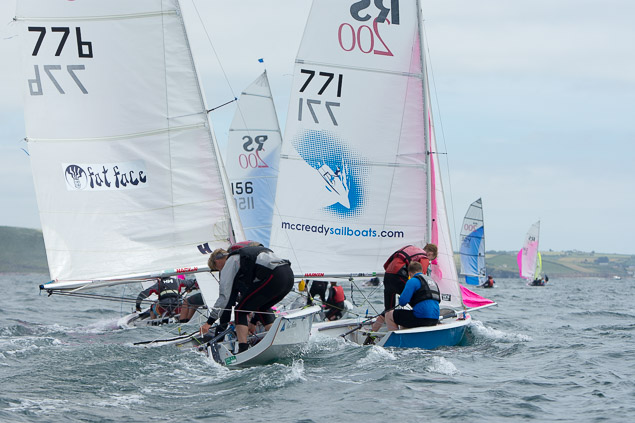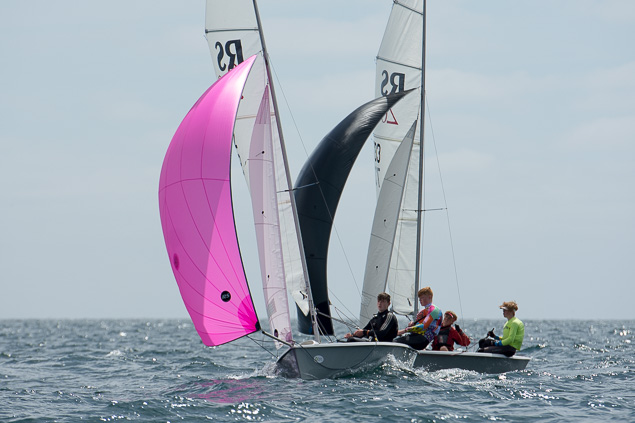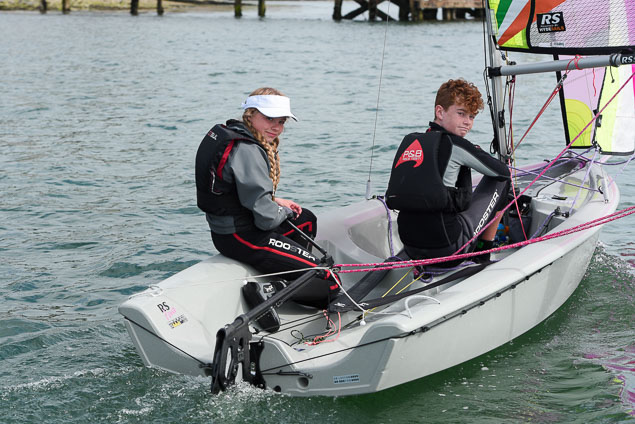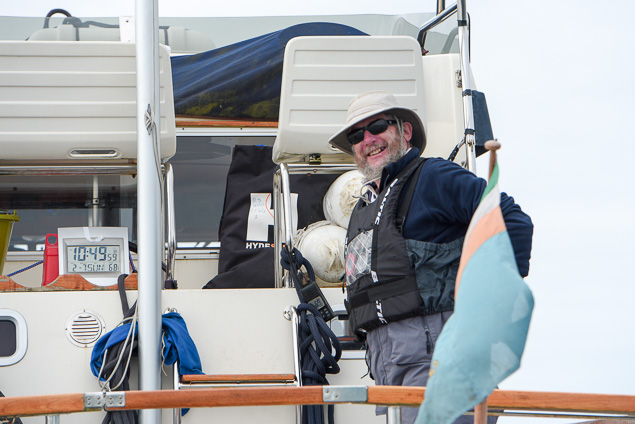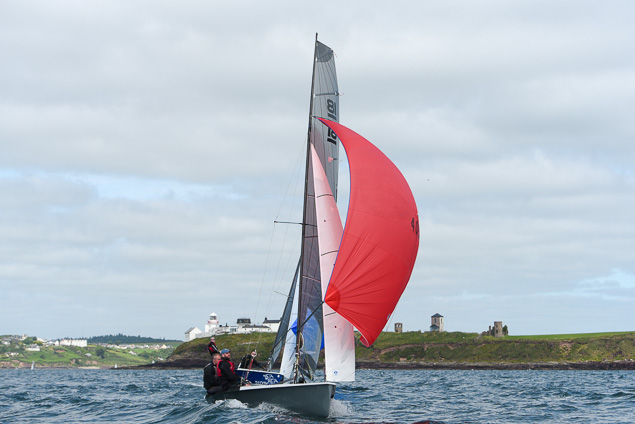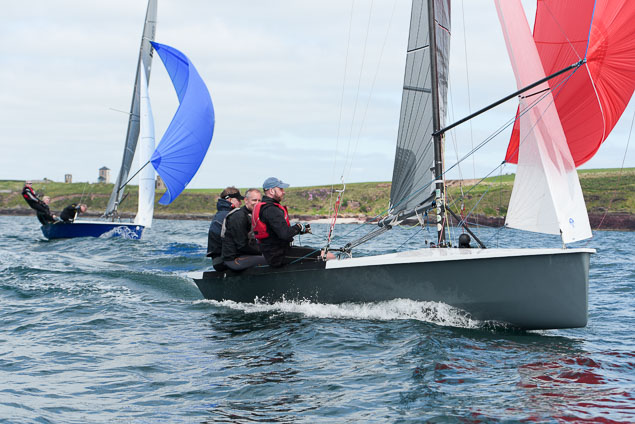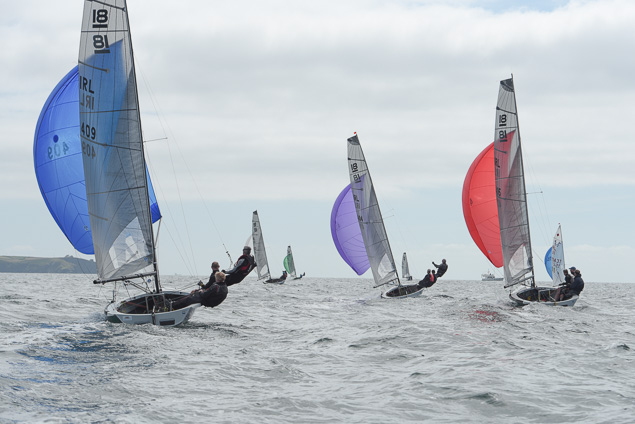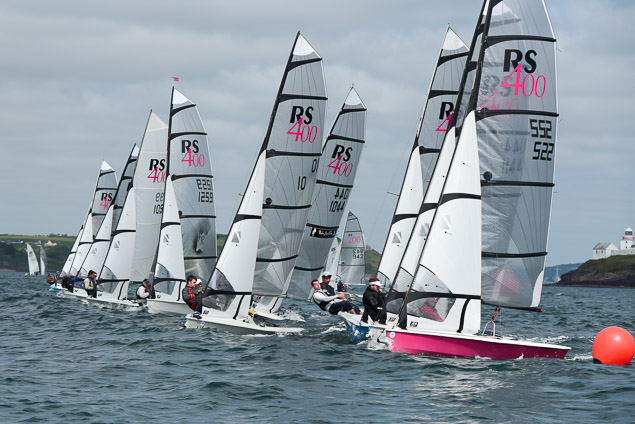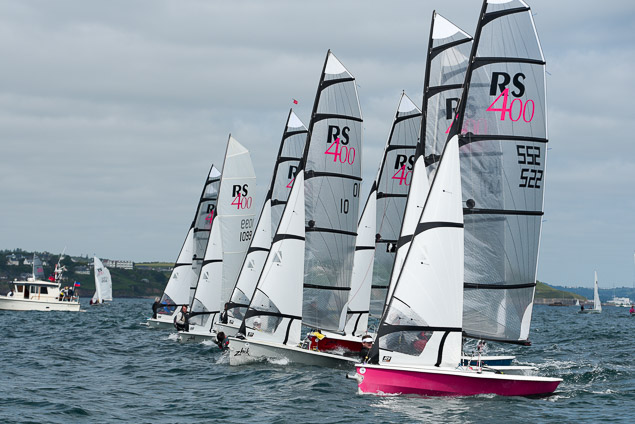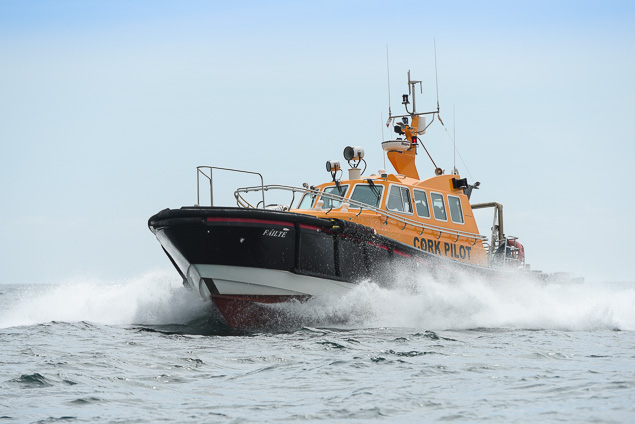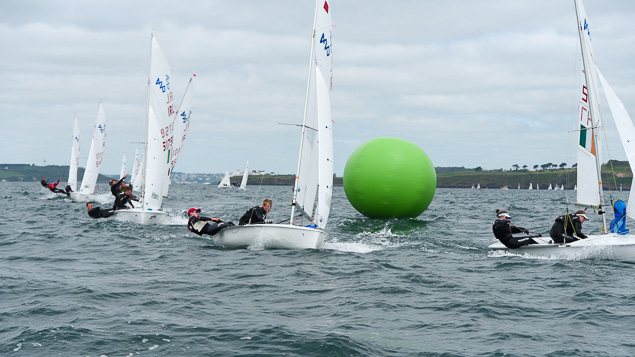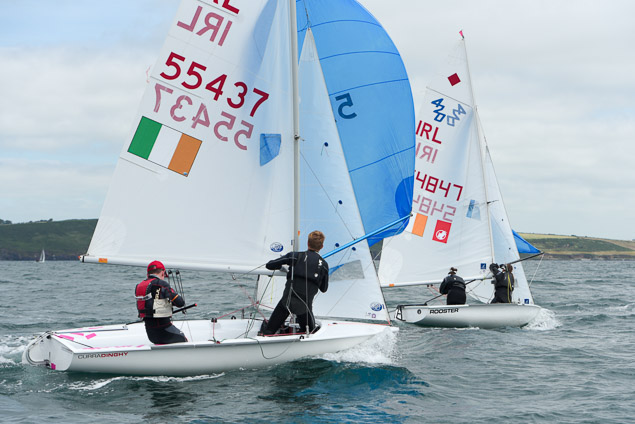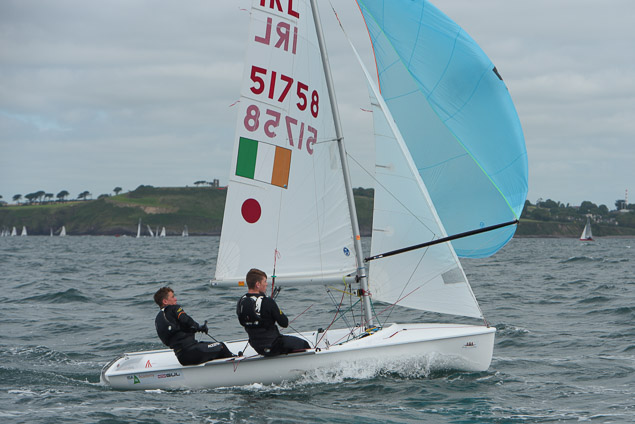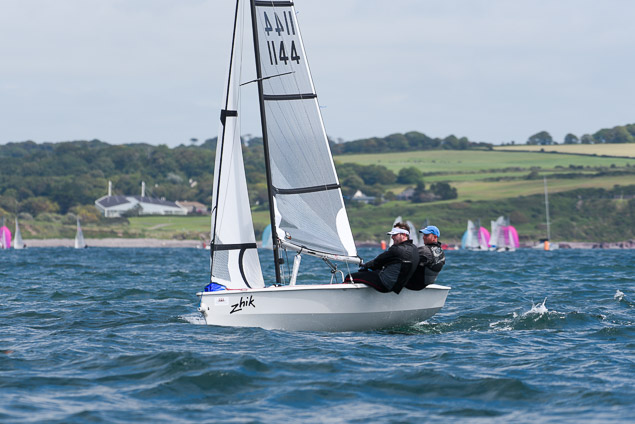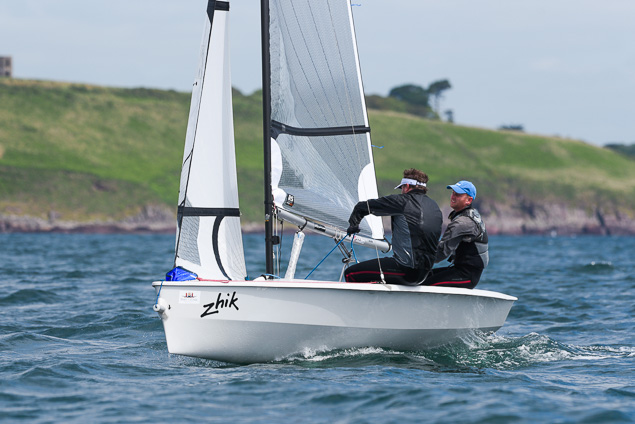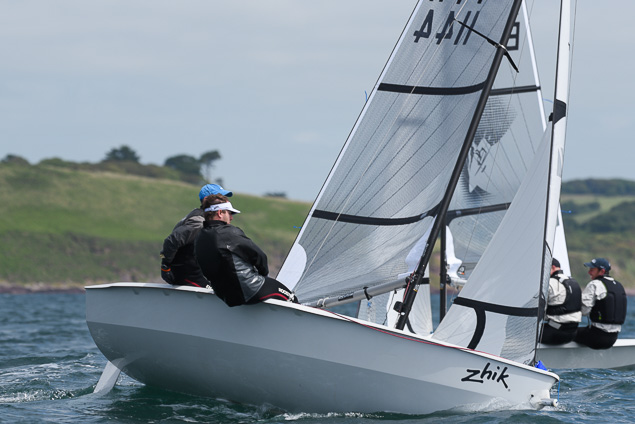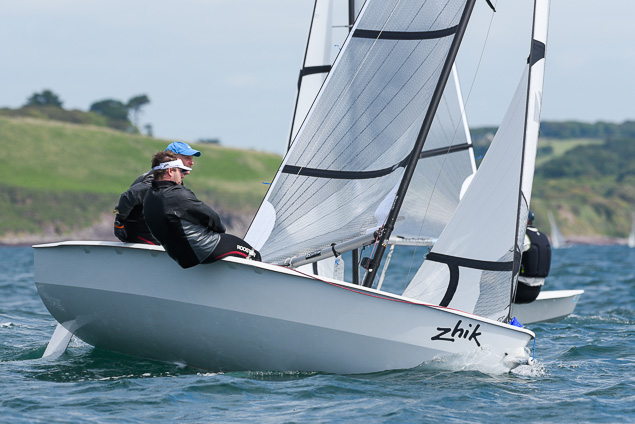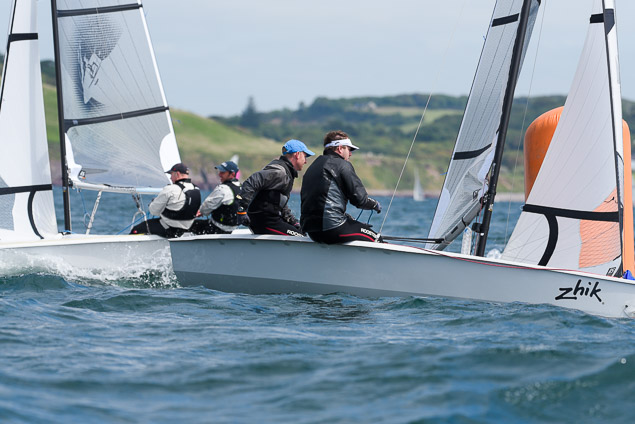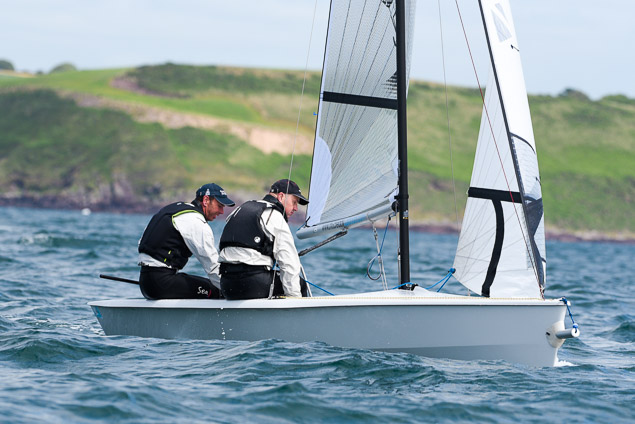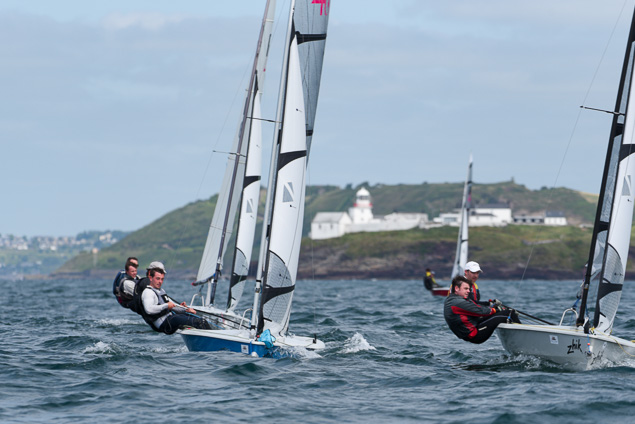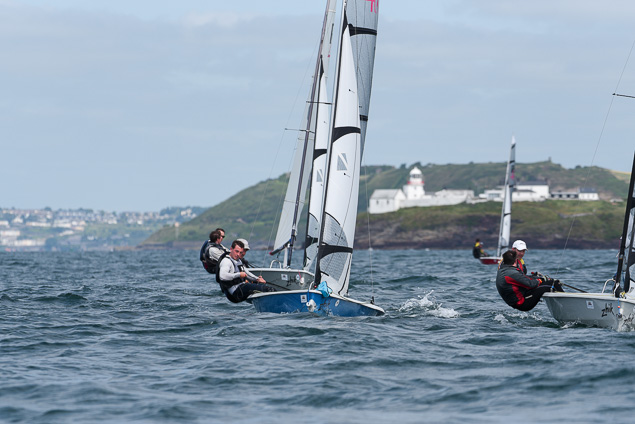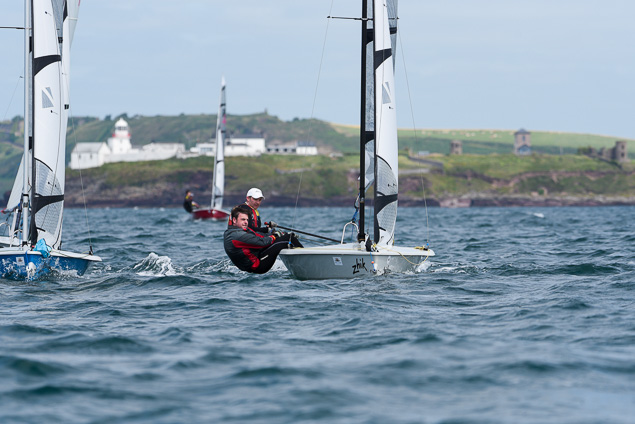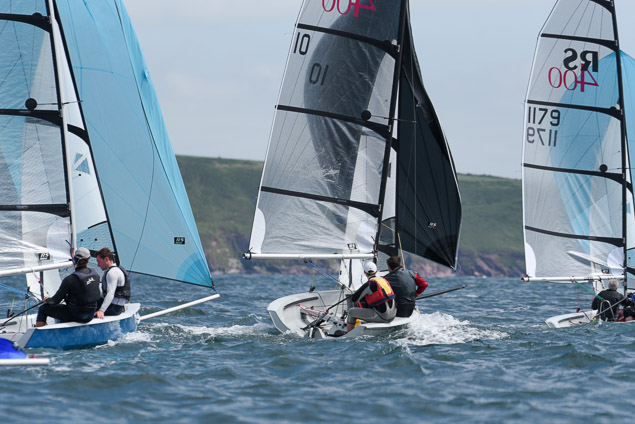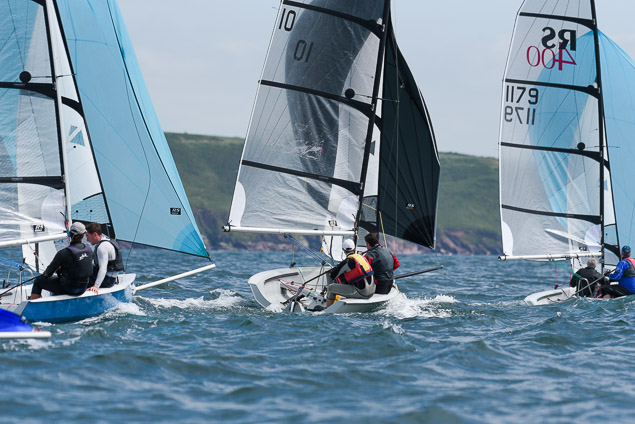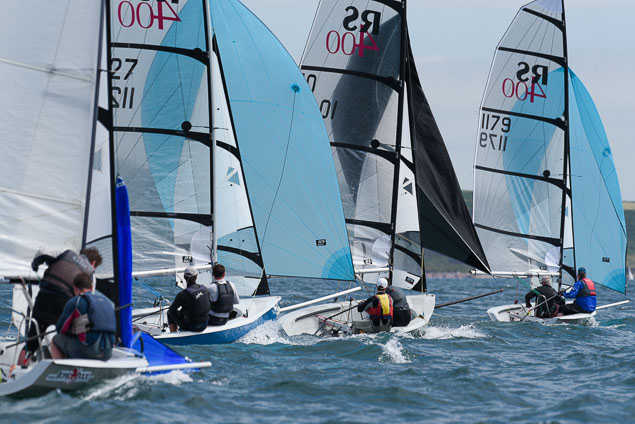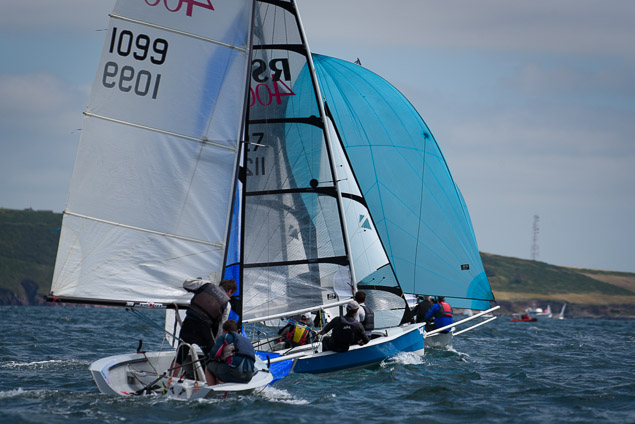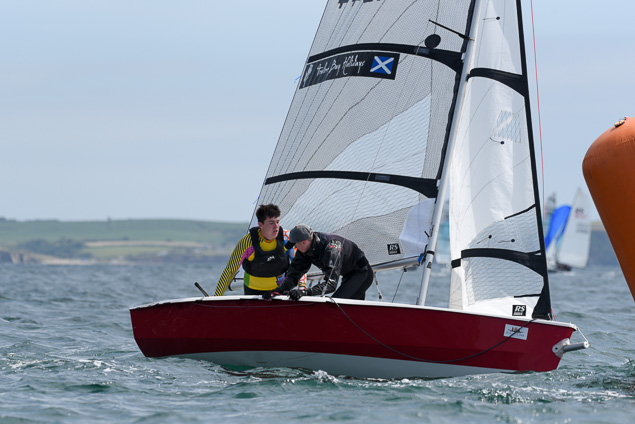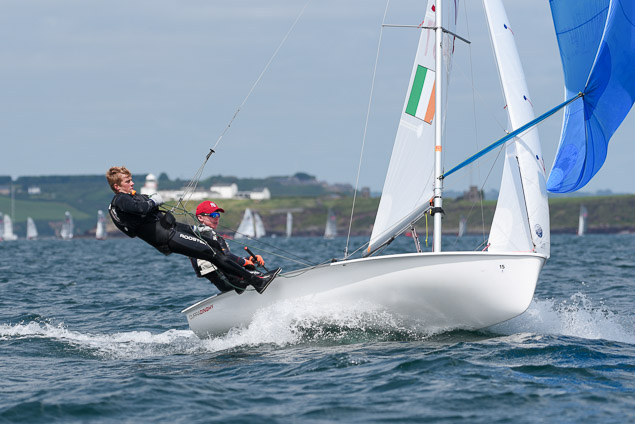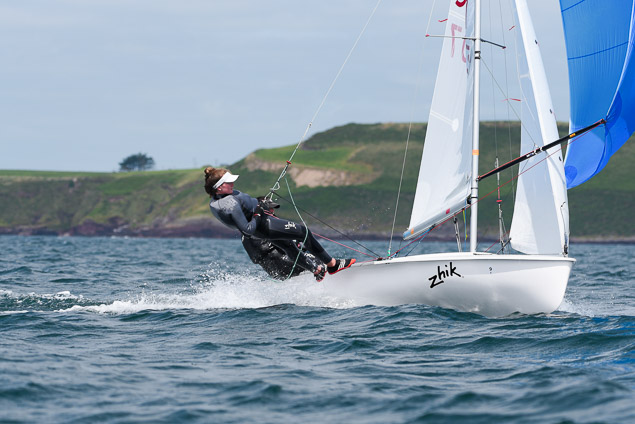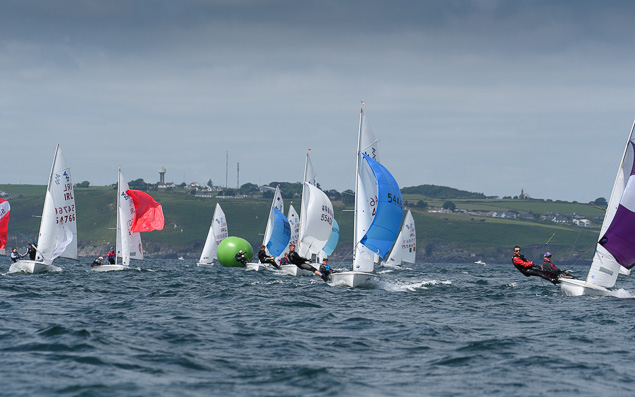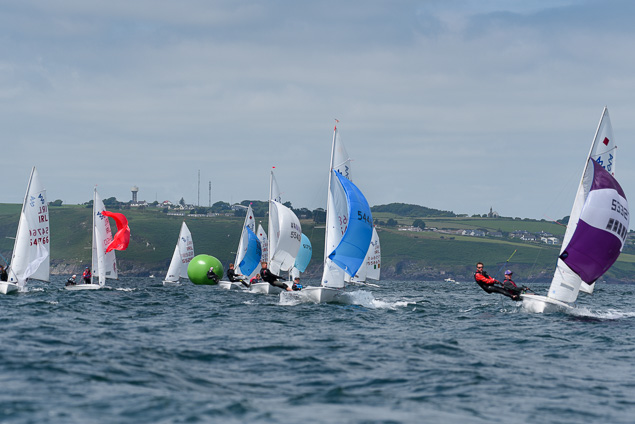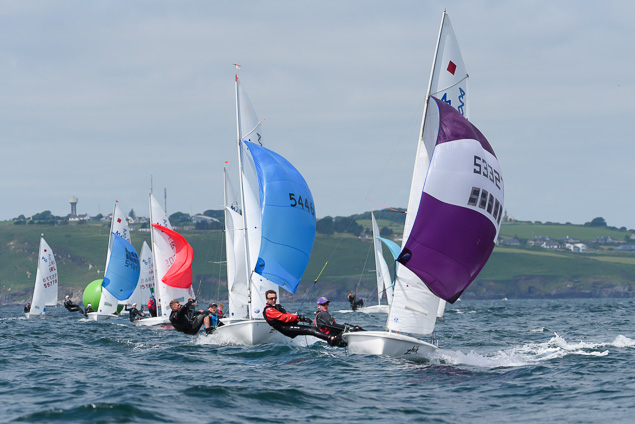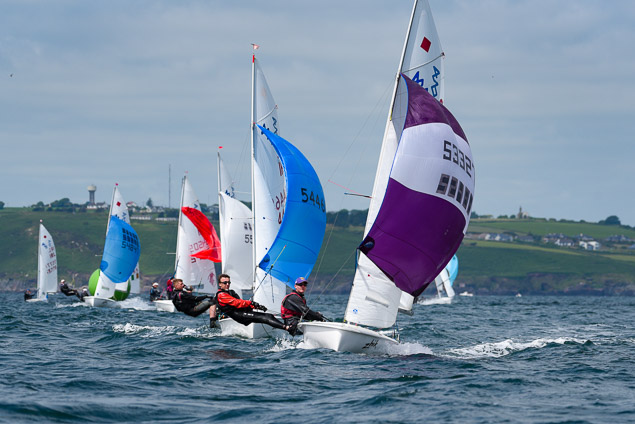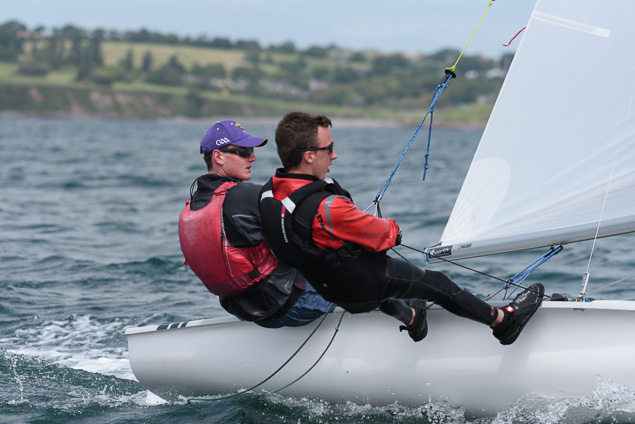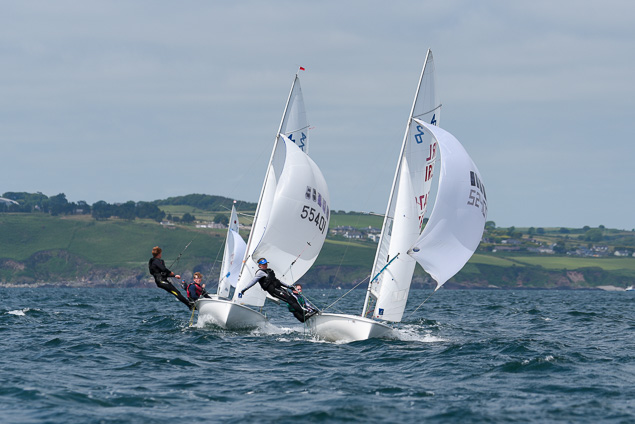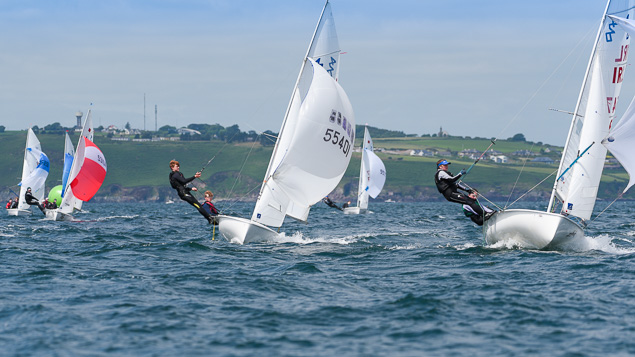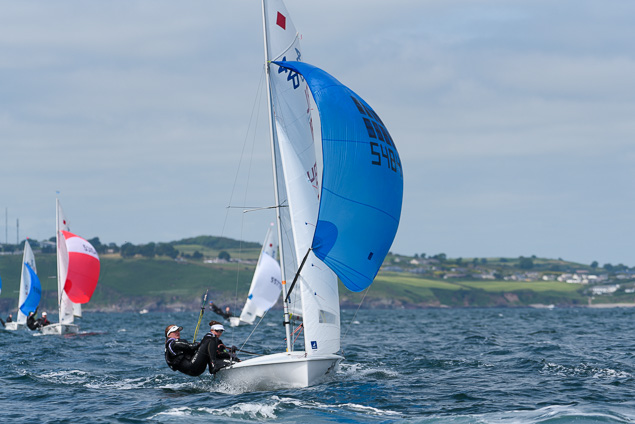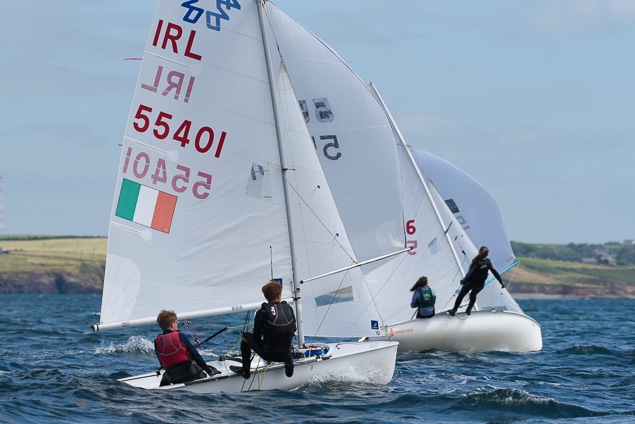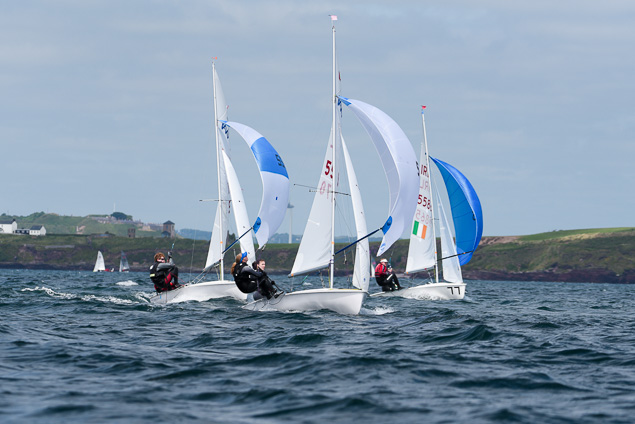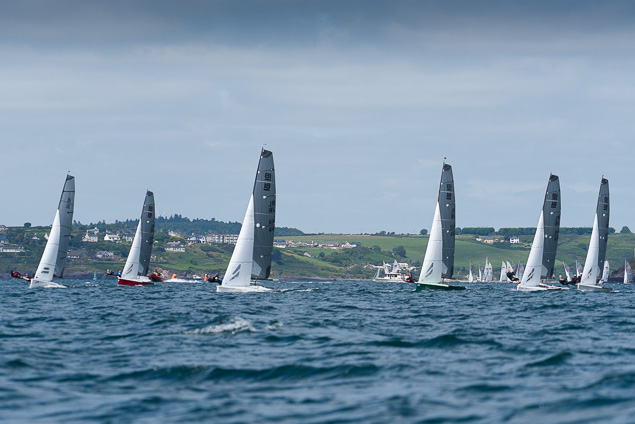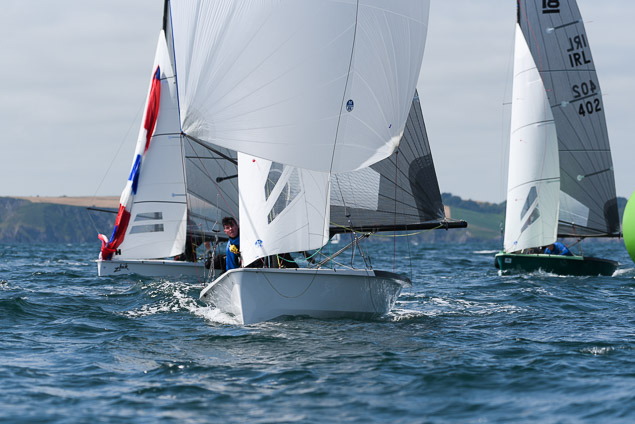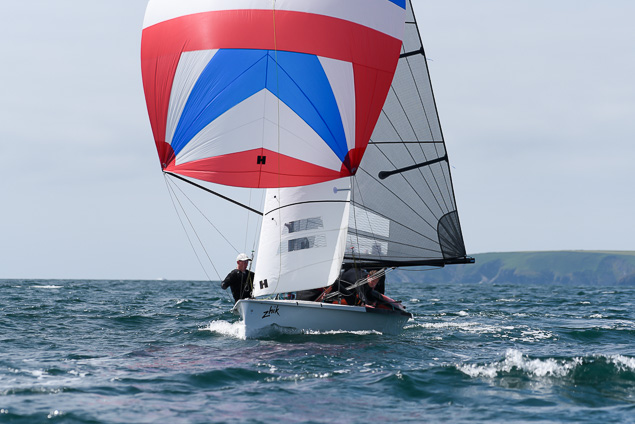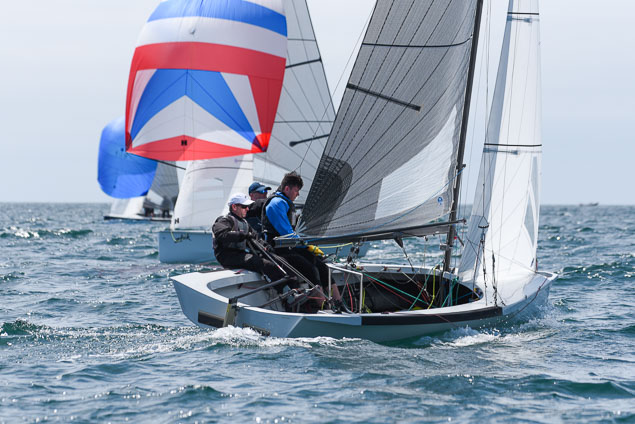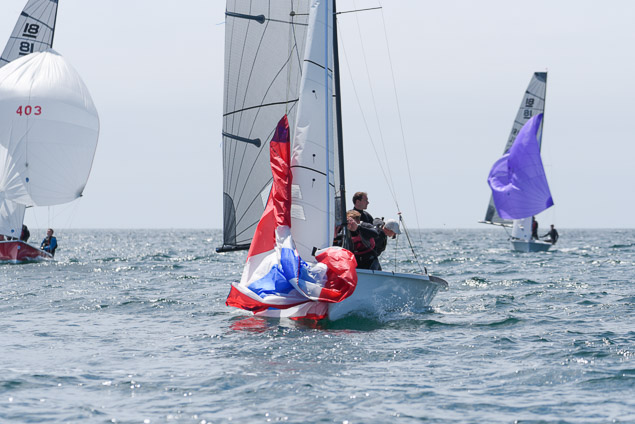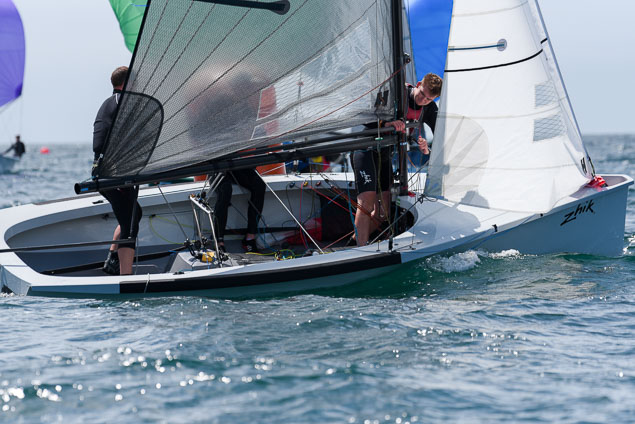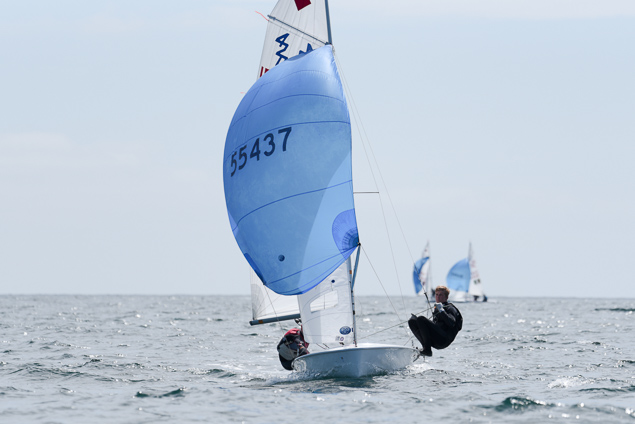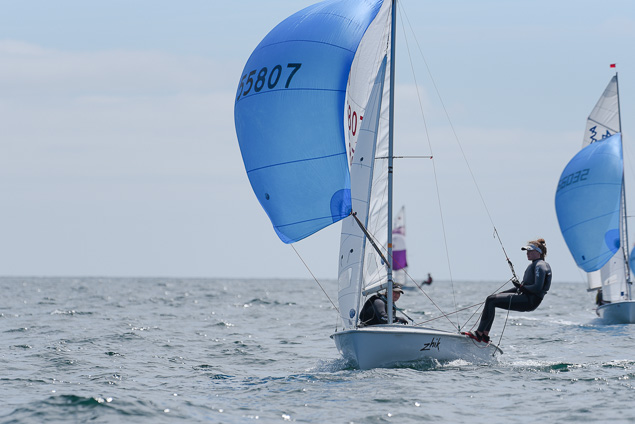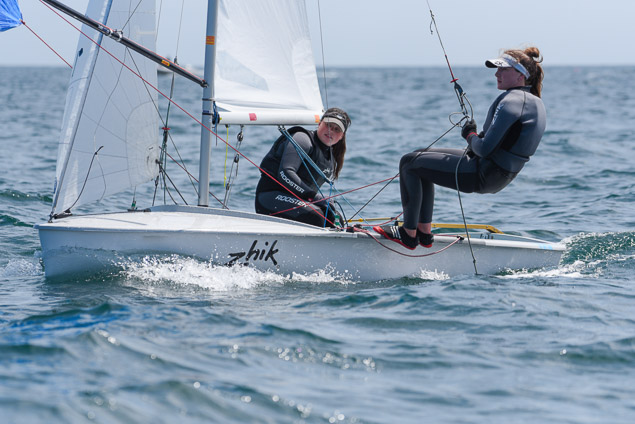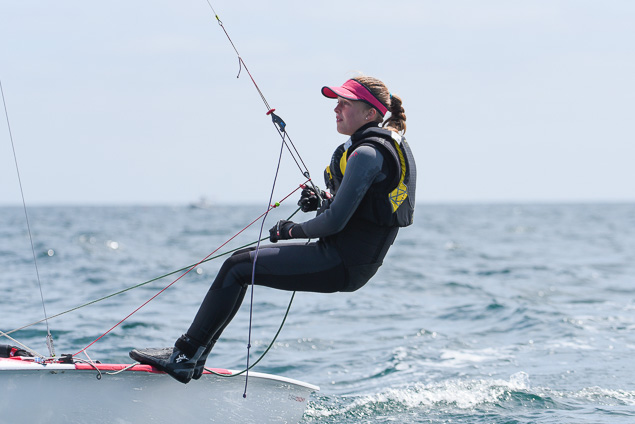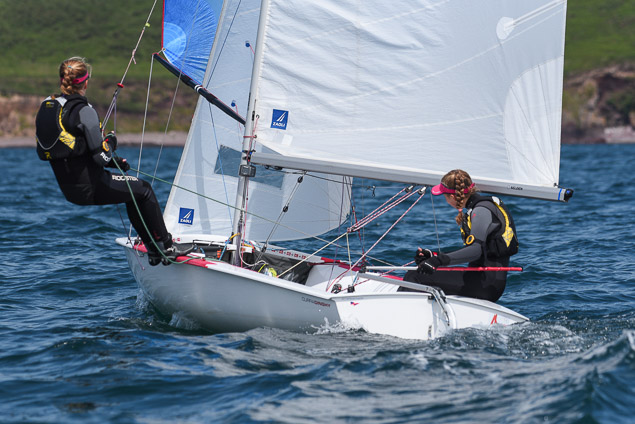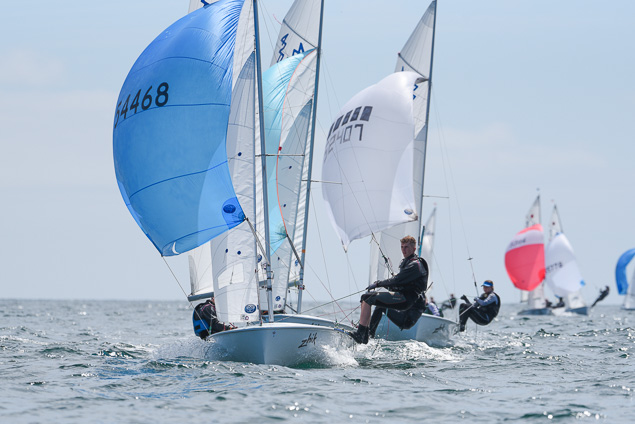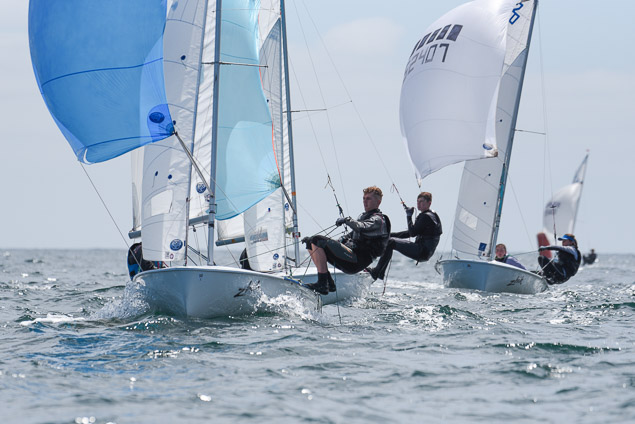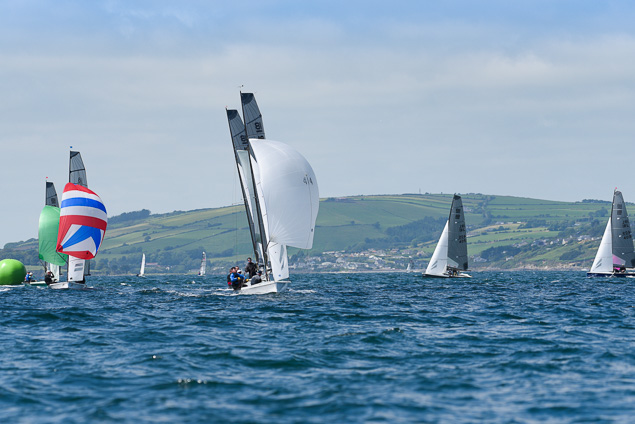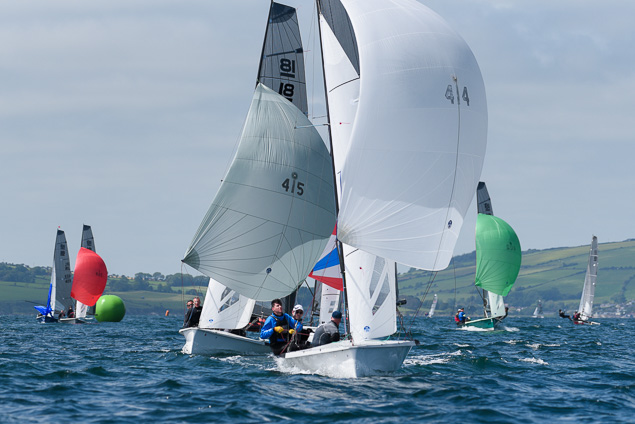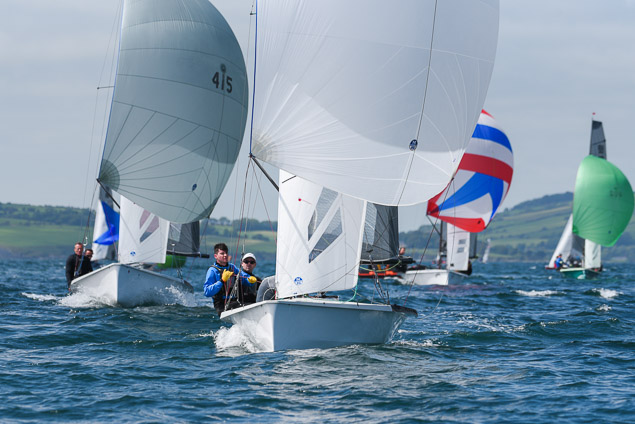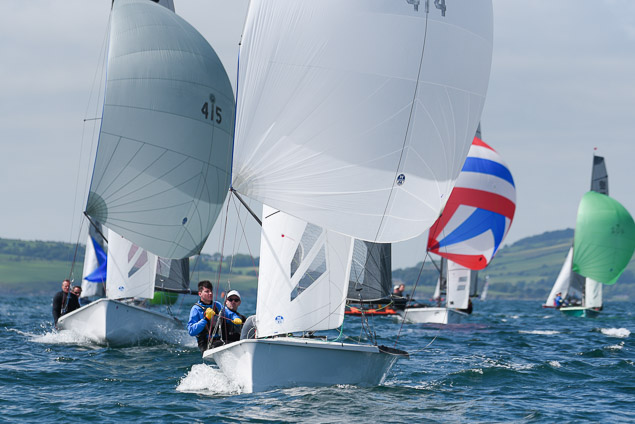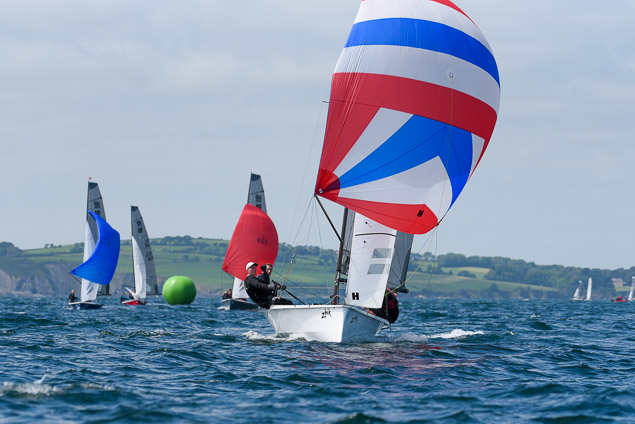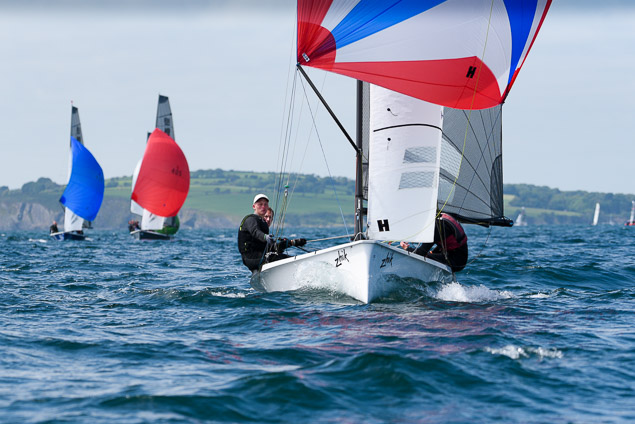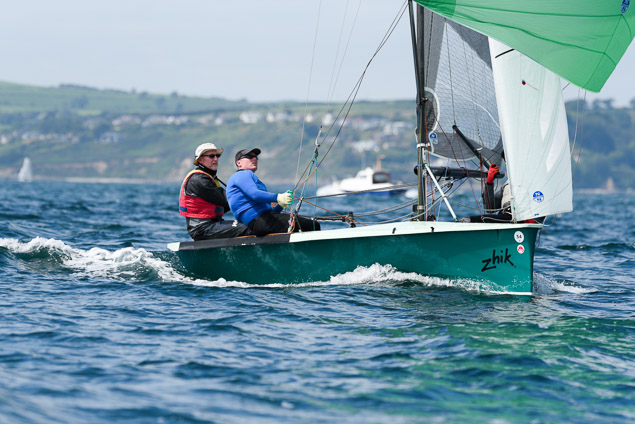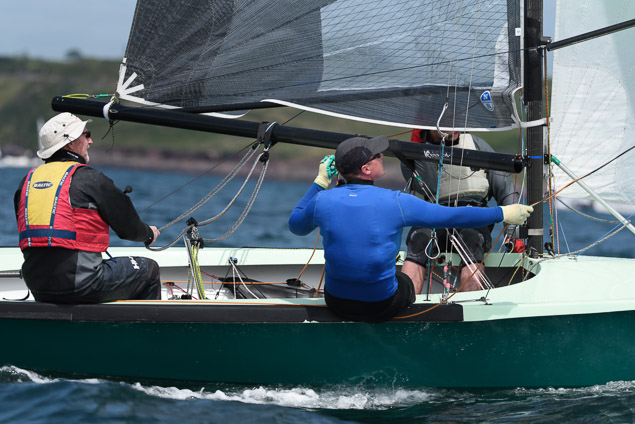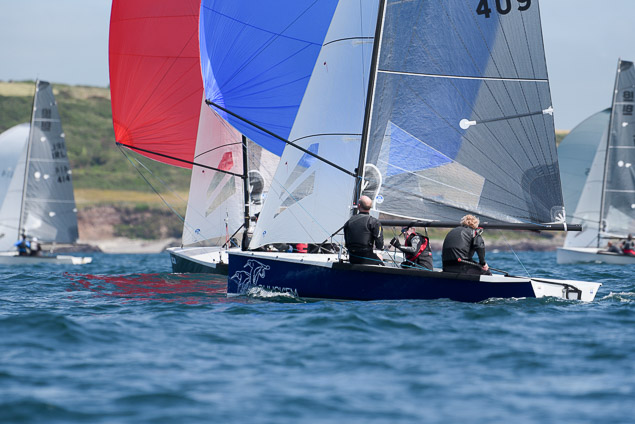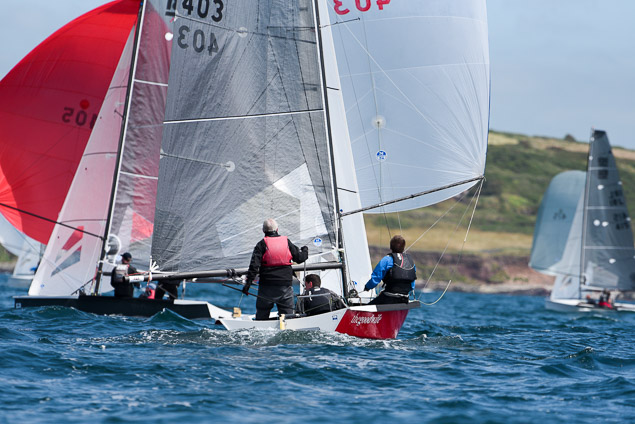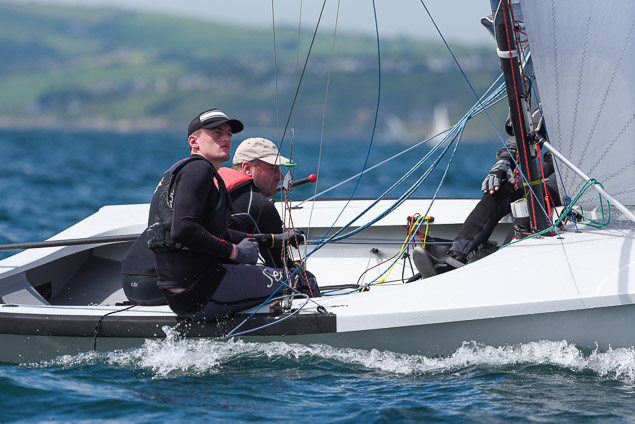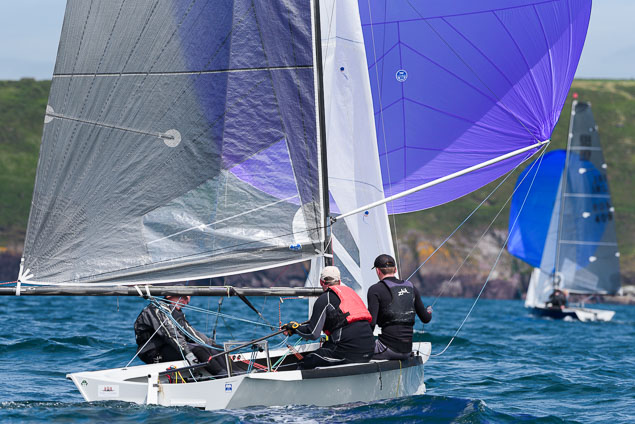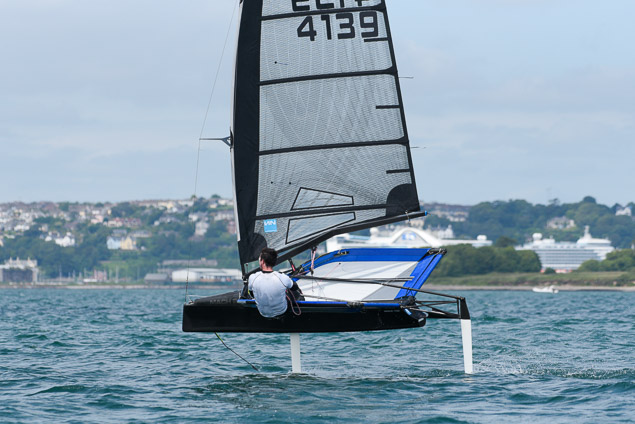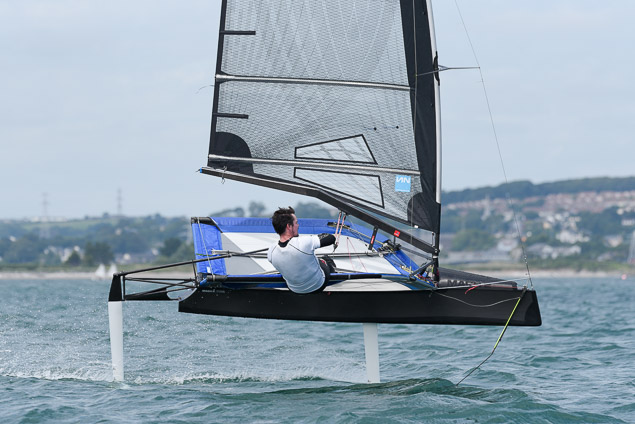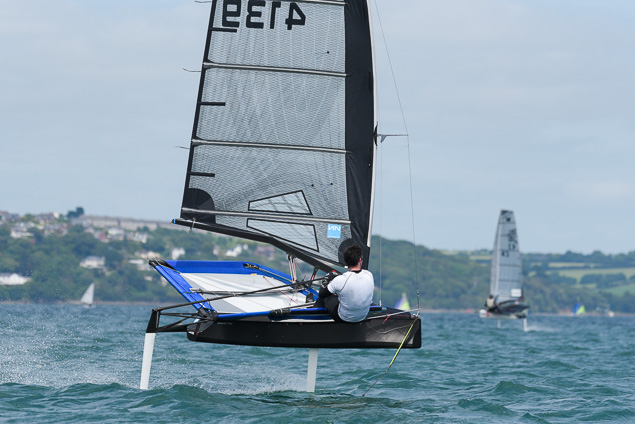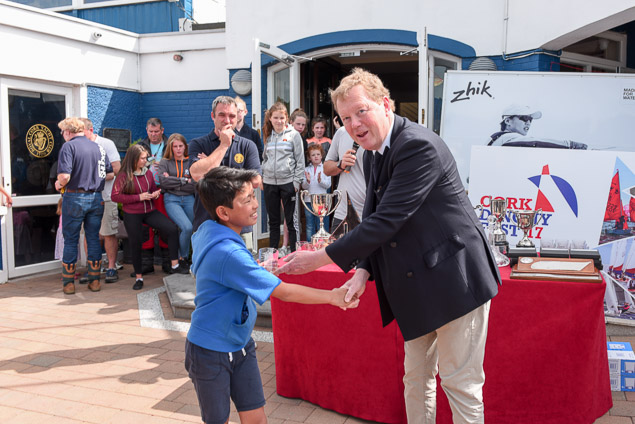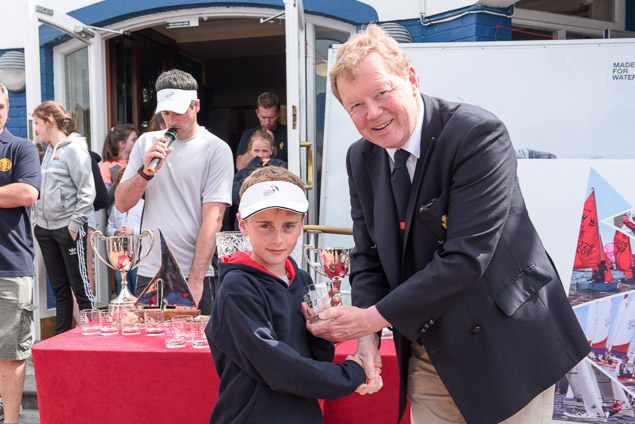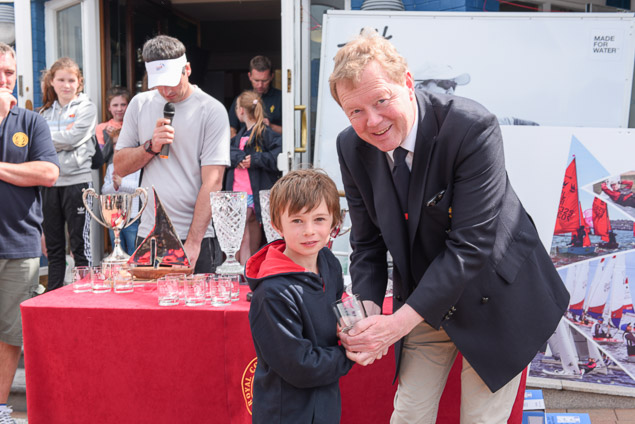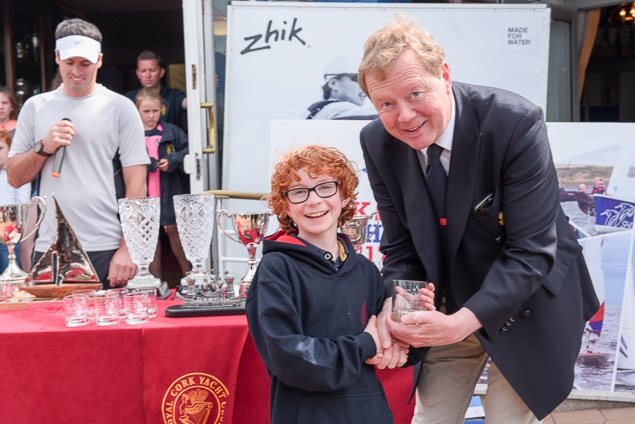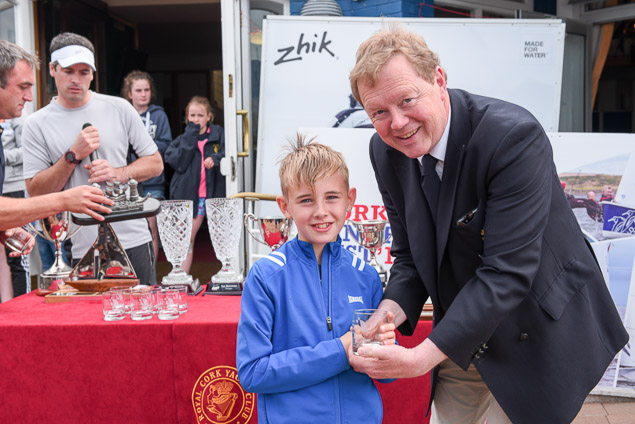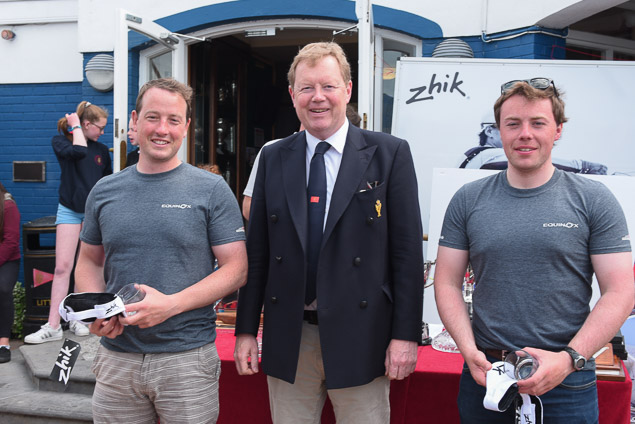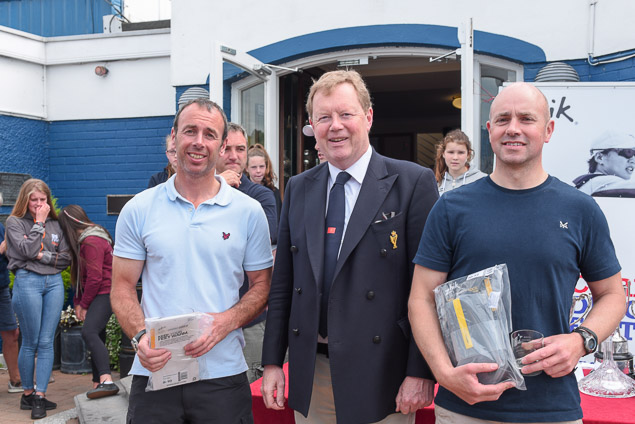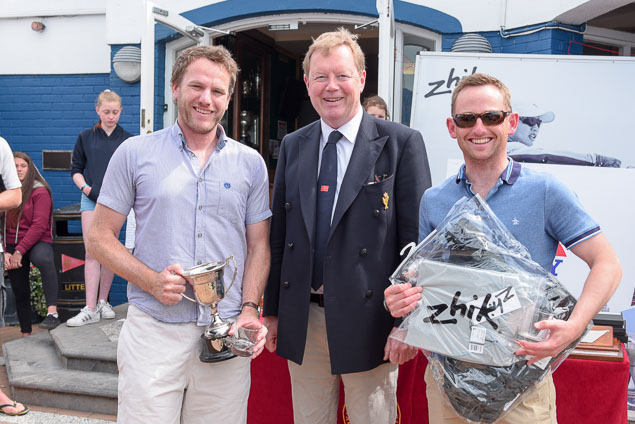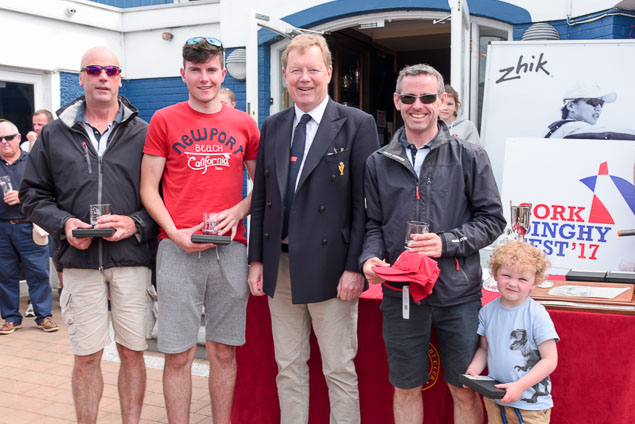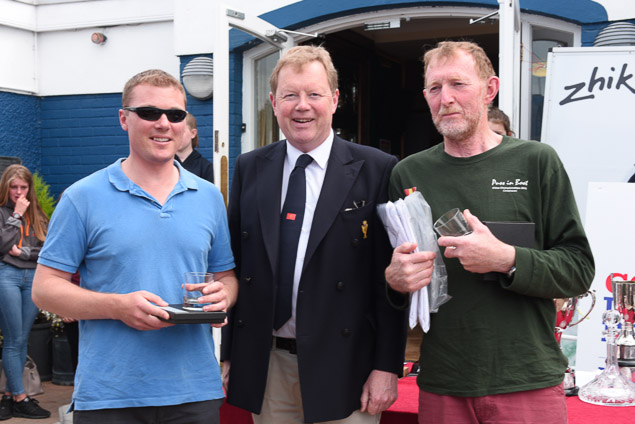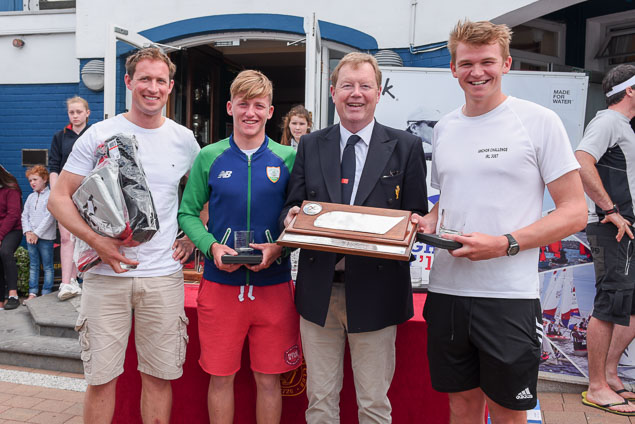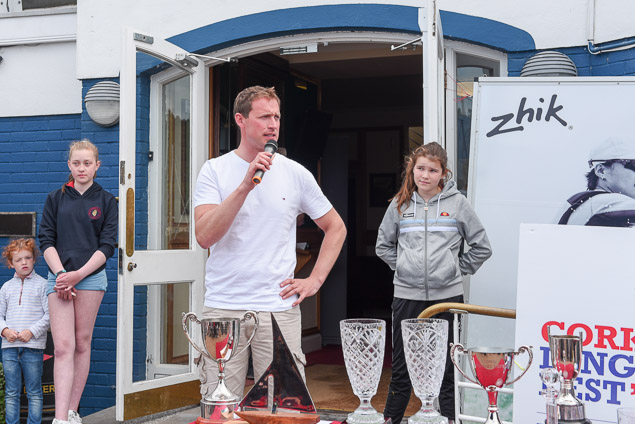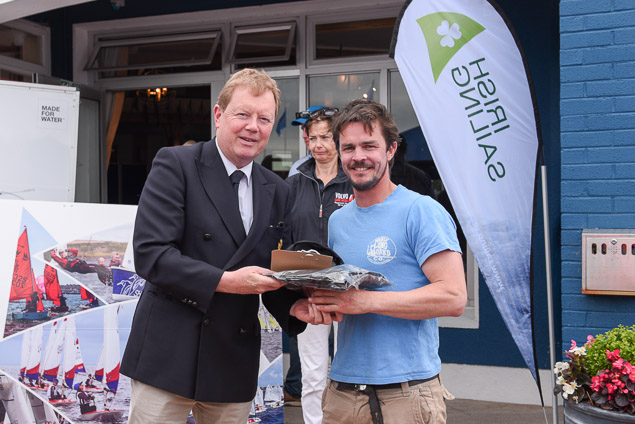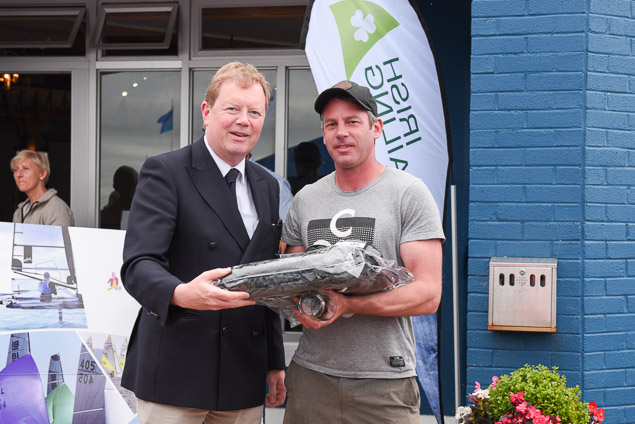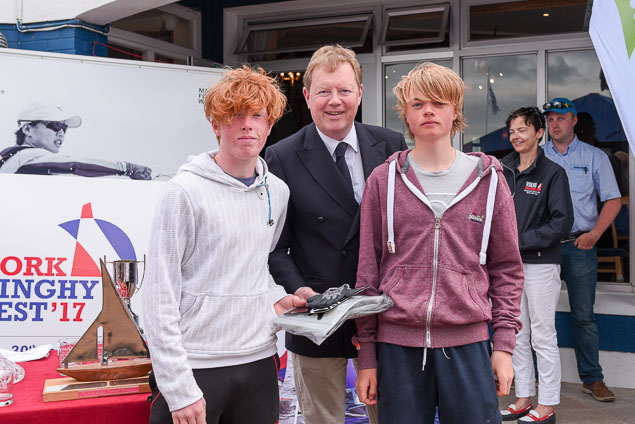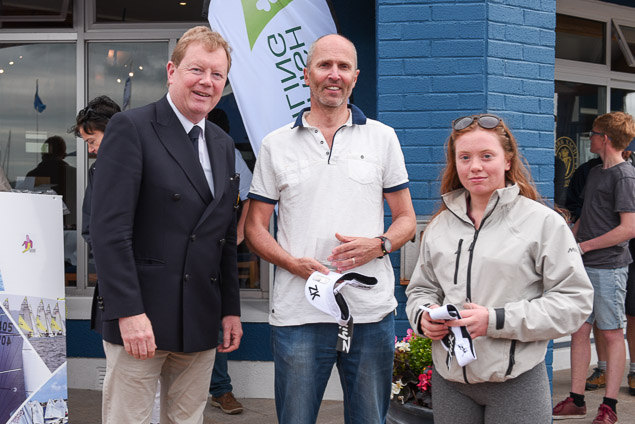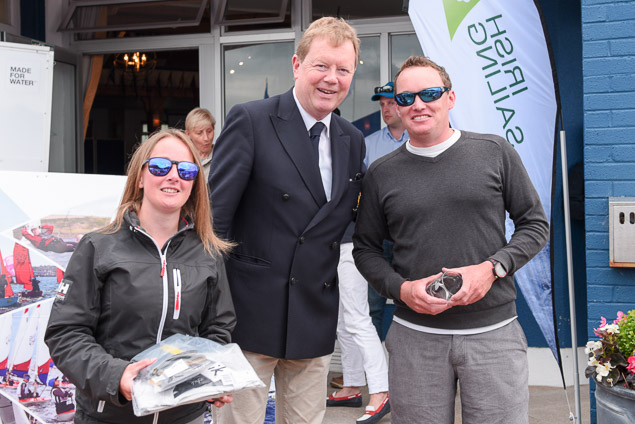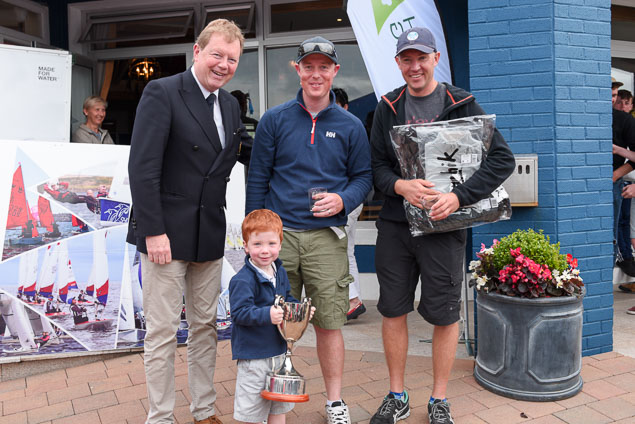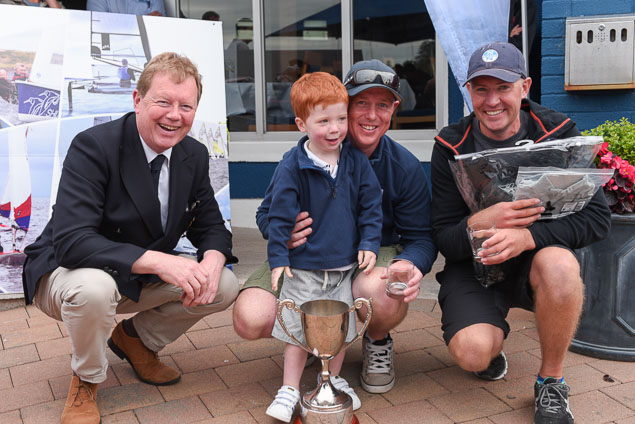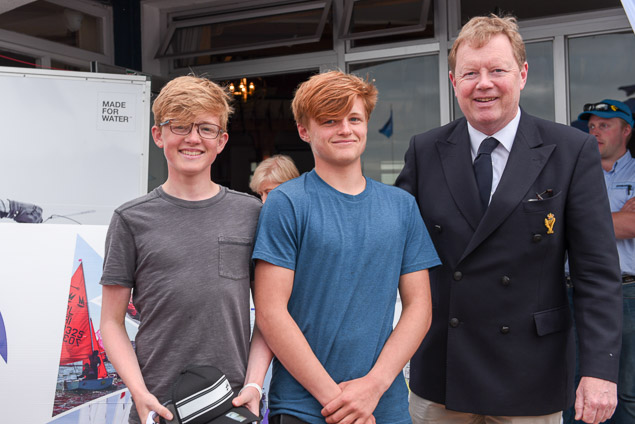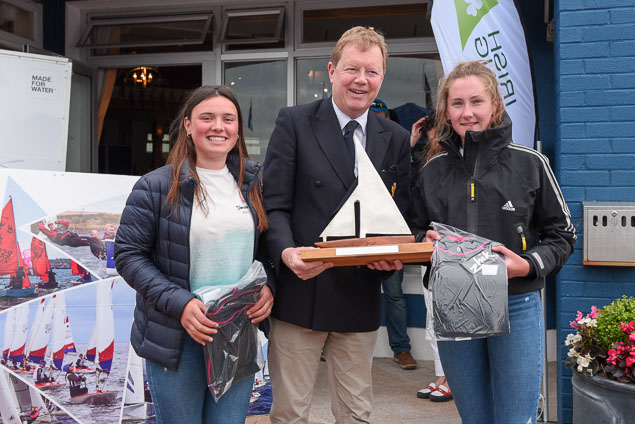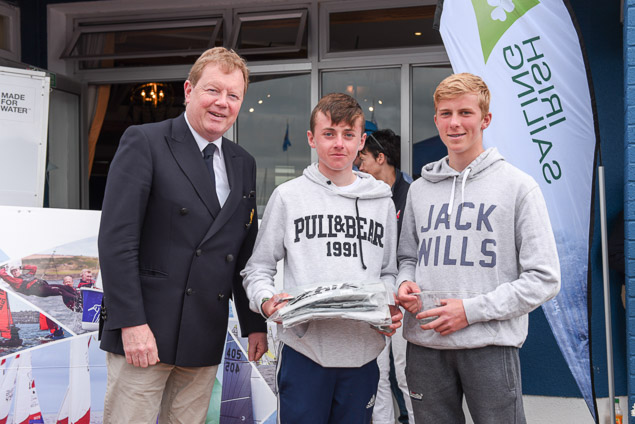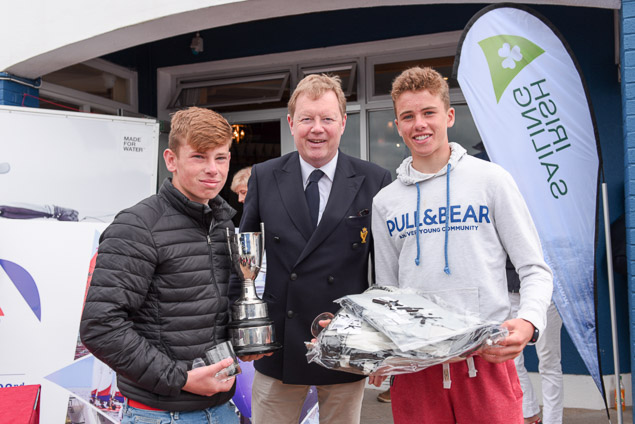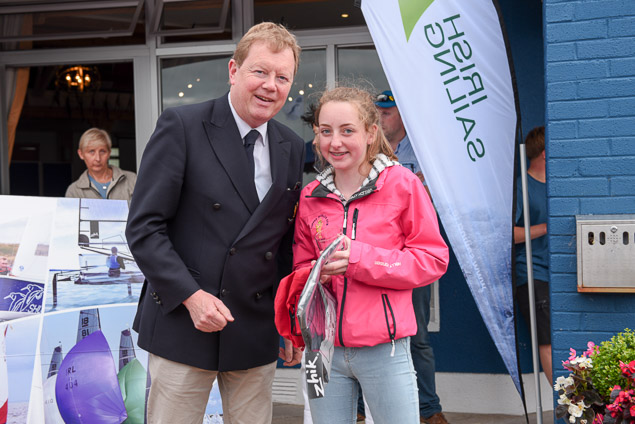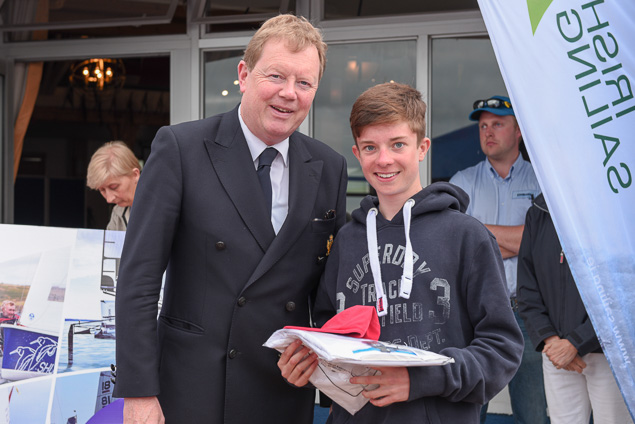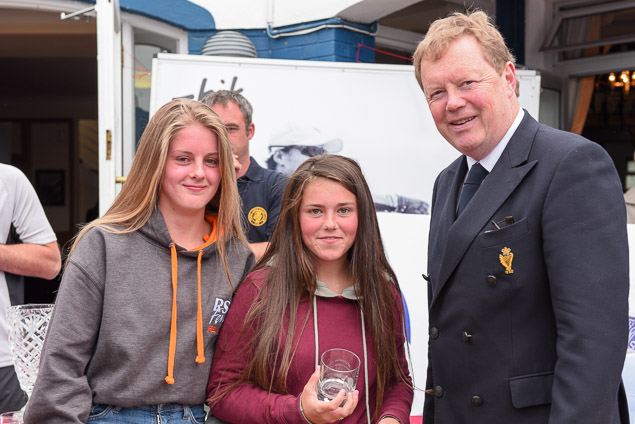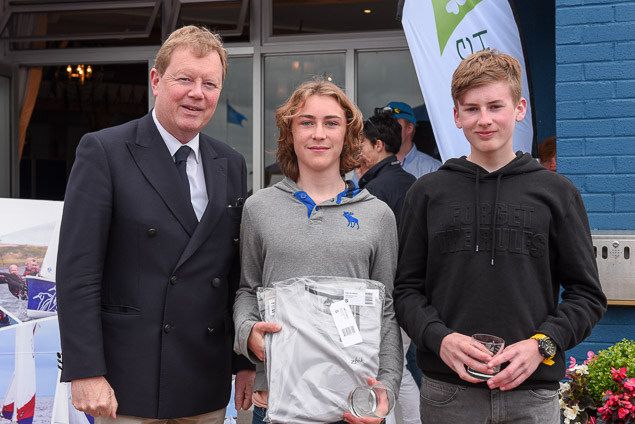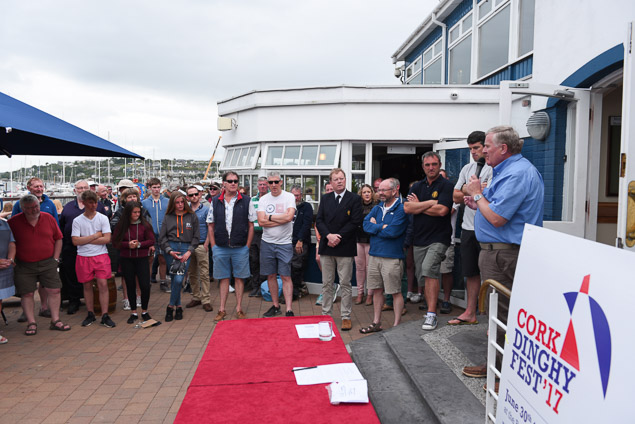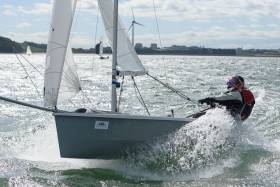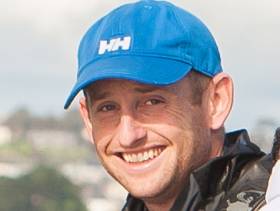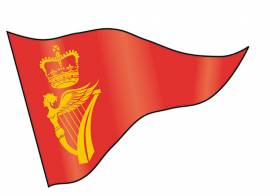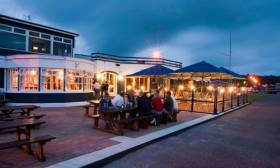Displaying items by tag: Royal Cork Yacht Club
The scoreline's impressive but it belies the fact that on the water the National Yacht Club's Finn Lynch is not getting things all his own way at Royal Cork Yacht Club's Laser National Championships. A string of wins came to an end in race six this morning when Tokyo 2020 rival Liam Glynn, the former Topper World Champion, took the gun but it was business as usual in races seven and eight as Lynch built a six–point advantage over the Ballyholme YC man. Royal Cork's own Nick Walsh is third but some 17–points off Glynn.
Although Johnny Durcan made the tough decision to sit out the Laser Radial Worlds in Medemblik, Holland after day two (he was lying thirteenth after the first day) the Cork helmsman, who is recovering from injury after a capsize in California, was in fact back in action at the Nationals today, on the third day of competition in the full rig division, and counted a 3,4,2 to be right up there with Olympic trialists, Lynch and Glynn. See the standard rig results here.
Race officer Peter Crowley sailed the combined fleets in a westerly breeze outside Cork Harbour today.
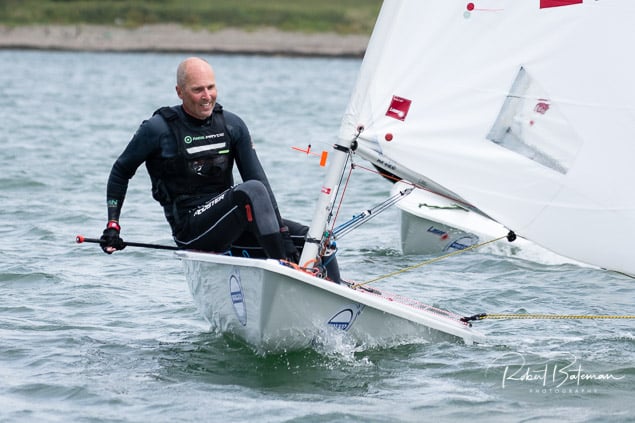 Sean Craig moves up to second overall in the 32-boat Radial fleet after eight races sailed Photo: Bob Bateman
Sean Craig moves up to second overall in the 32-boat Radial fleet after eight races sailed Photo: Bob Bateman
Royal Cork's Luke McGrath stays top of the Radials and he has 20–point margin over Sean Craig, a recent Radial rig convert, who has moved into seconf place. The Royal St. George multi–champion is now four points clear of club mate Patrick Cahill on 36 points. Read the Radial results here.
In the 4.7 fleet, Jack Fahy also maintains his overall lead with a seven point cushion and in a show of strength for the Royal St. George Yacht Club, another George helmsman is second with Tom higgins counting 18–points. Third is Michael Carroll from Kinsale YC. 4.7 results are here.
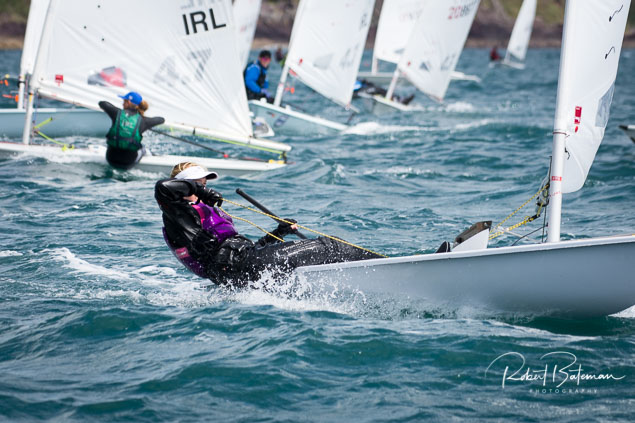
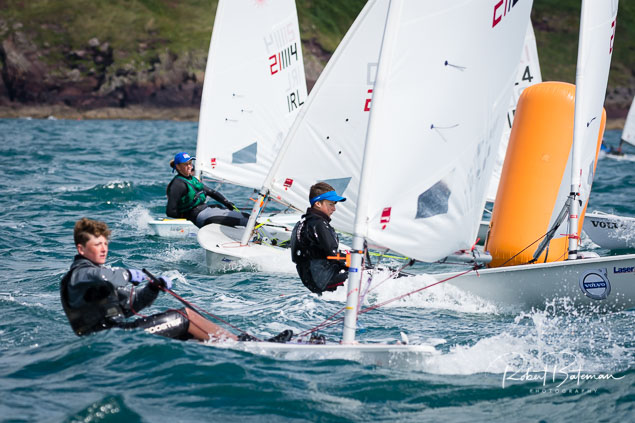
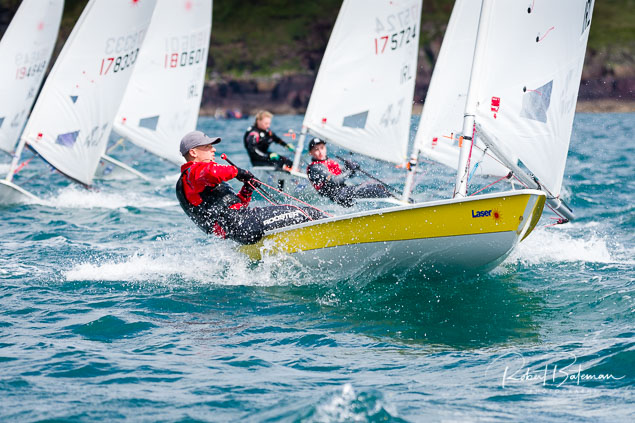
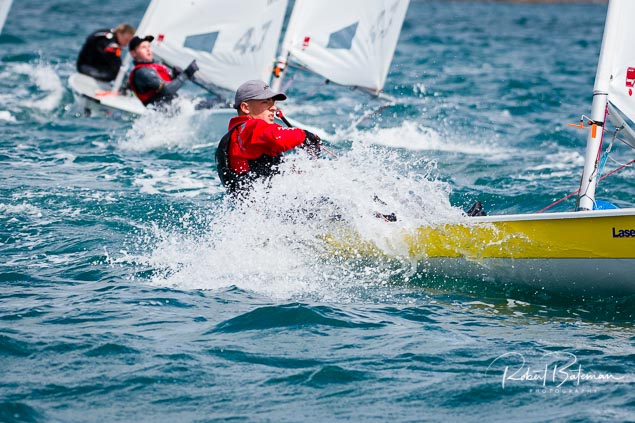
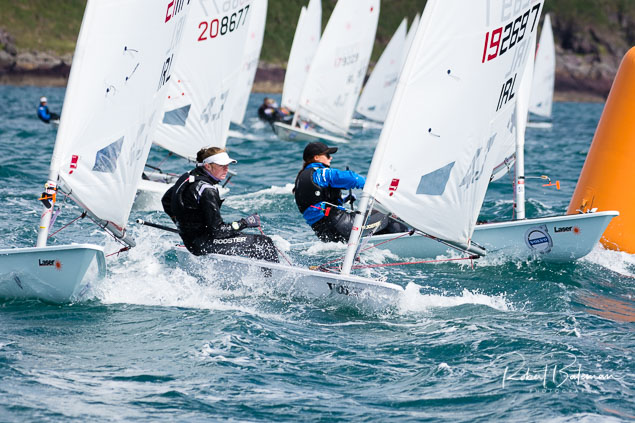
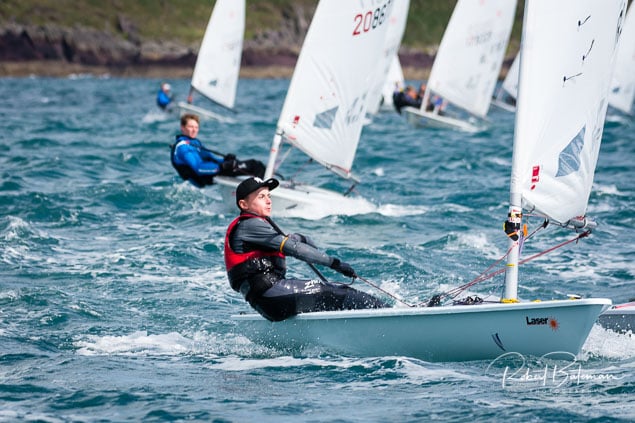
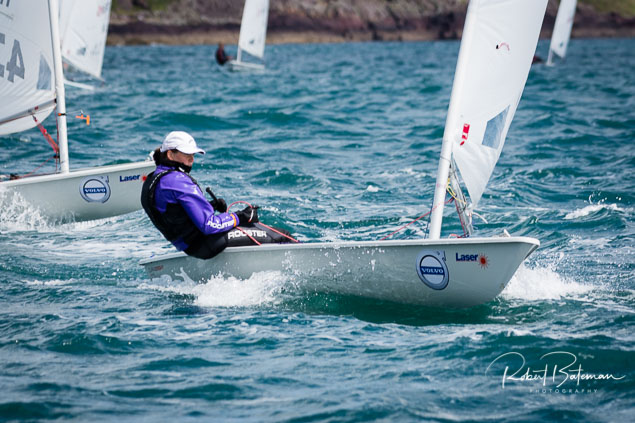
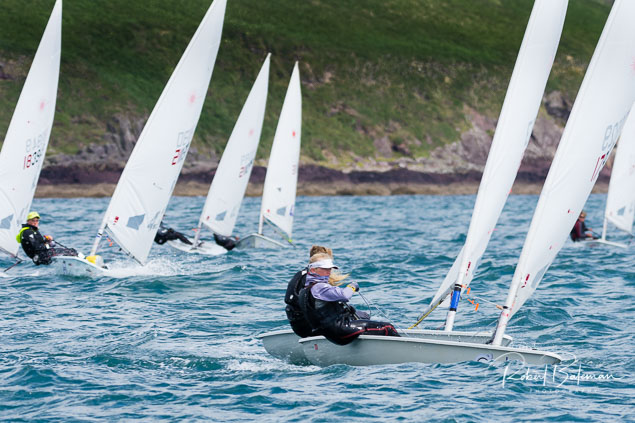
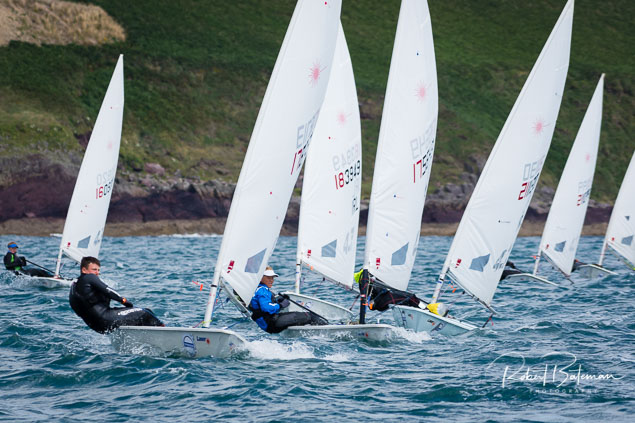
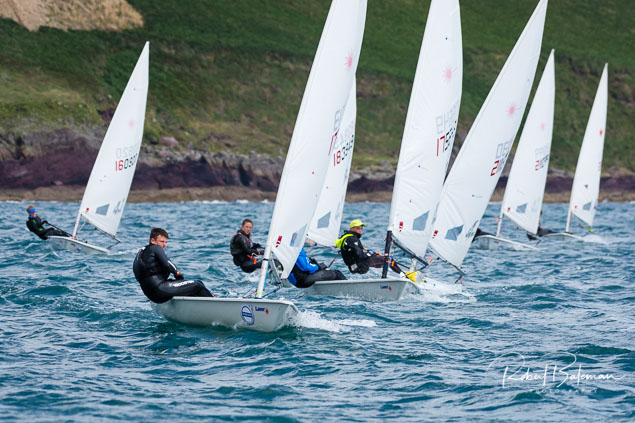
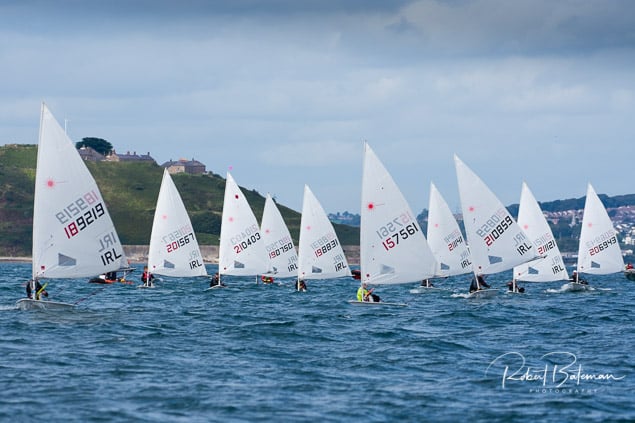
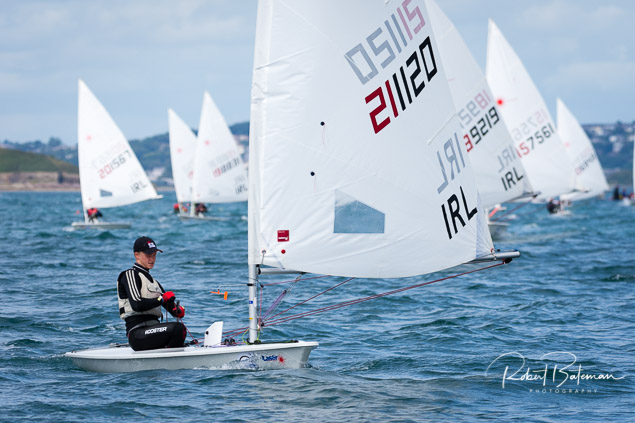
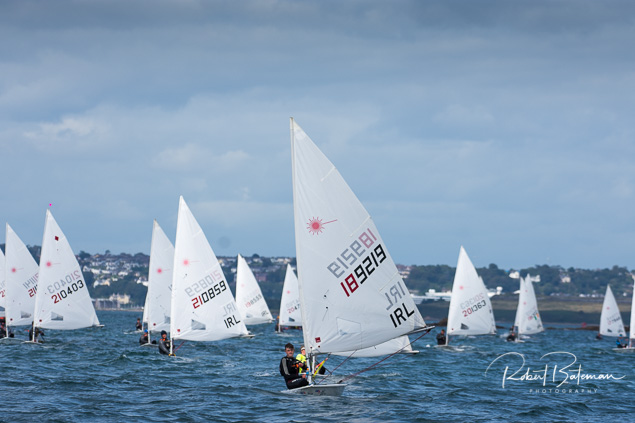
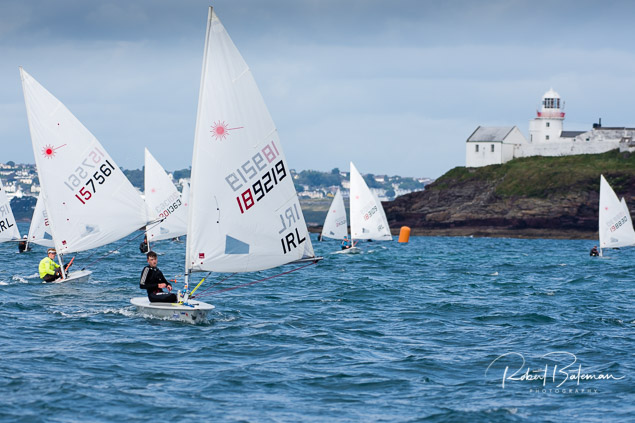
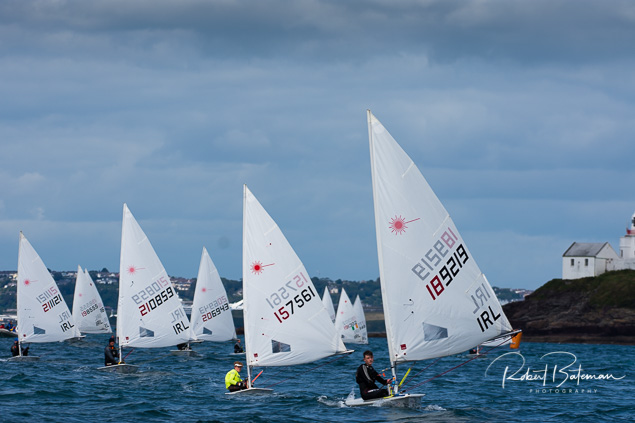
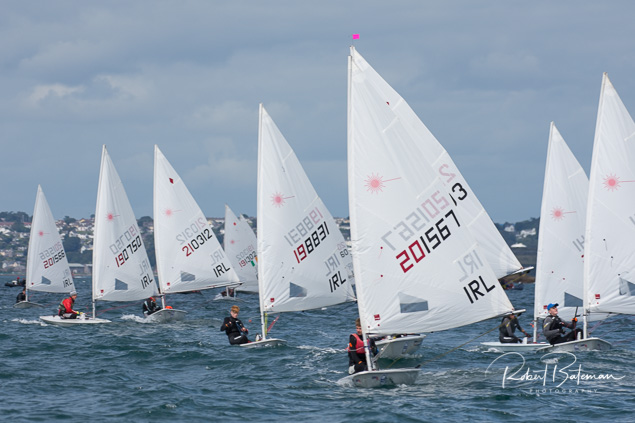
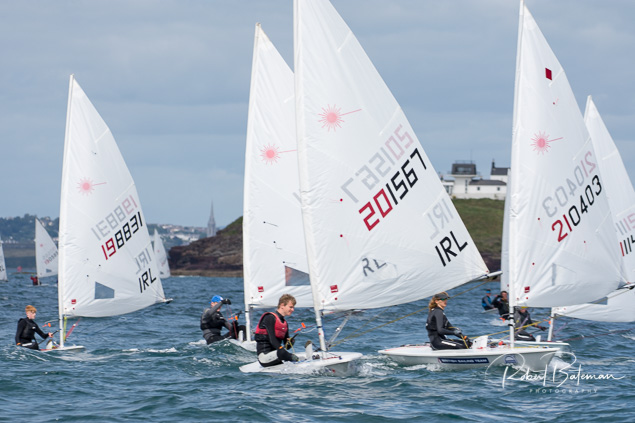
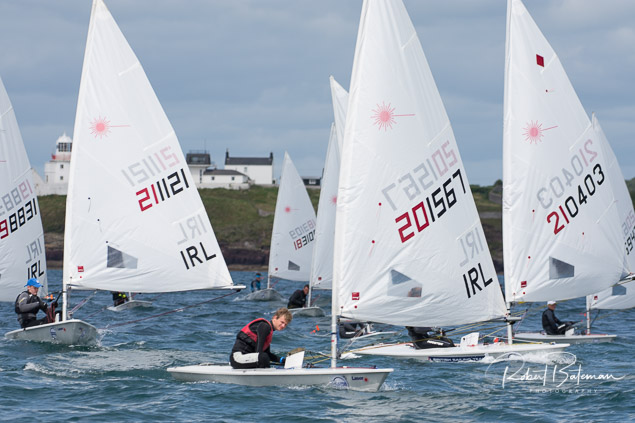
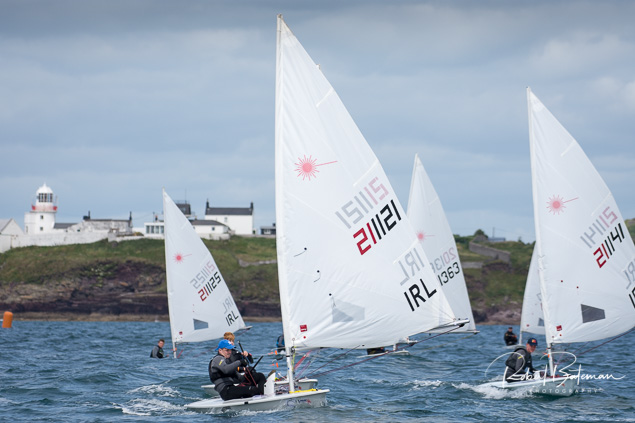
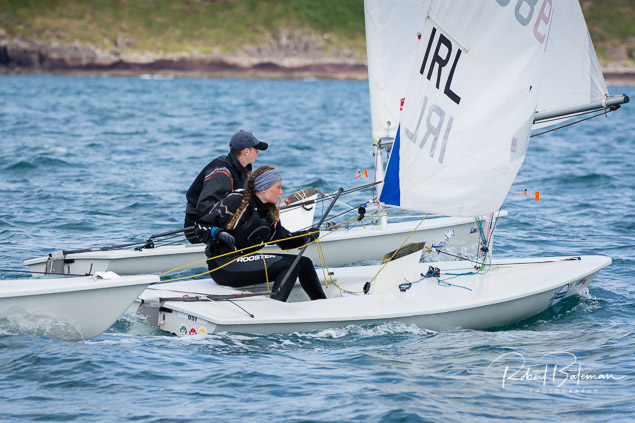
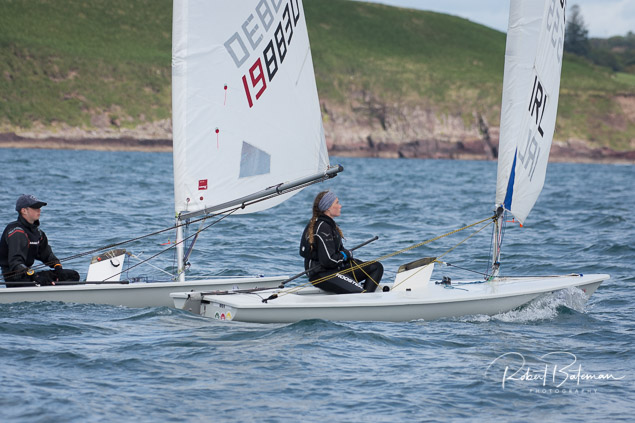
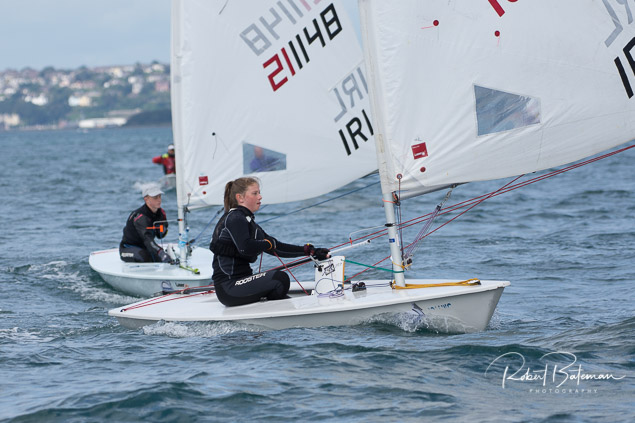
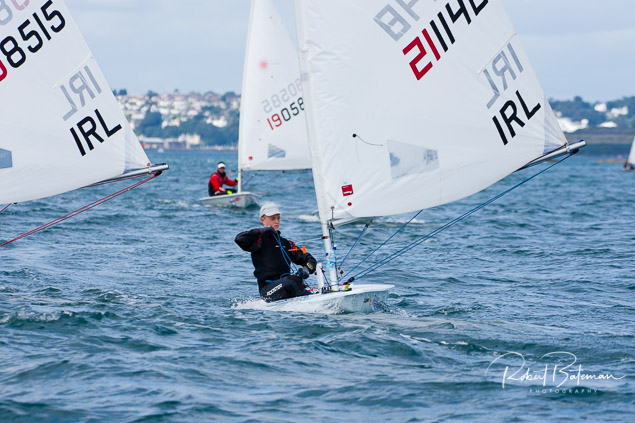
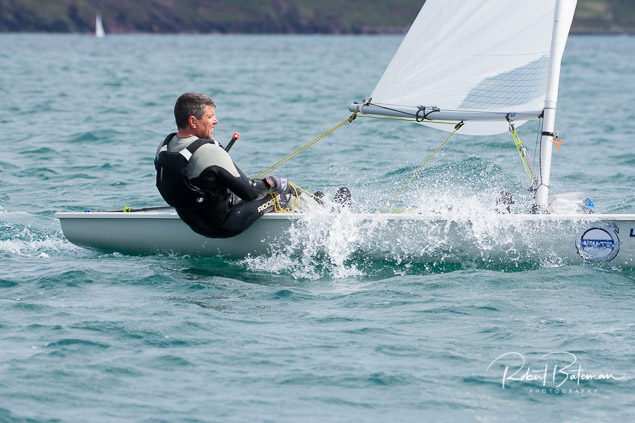
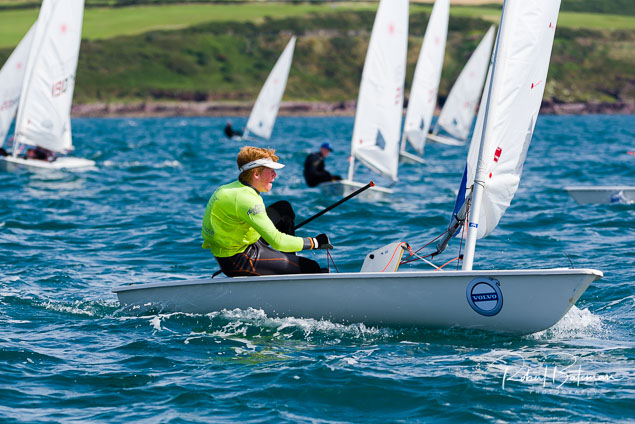
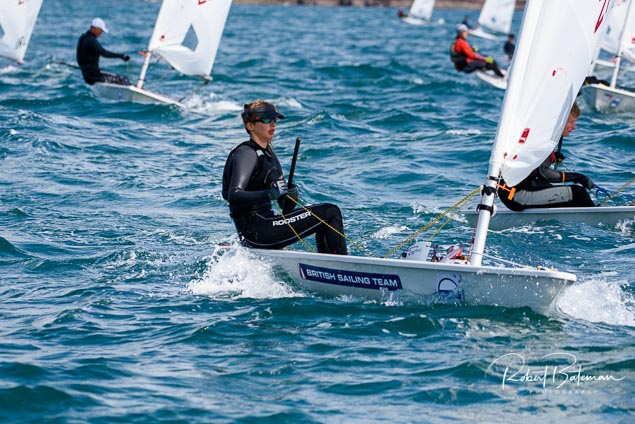
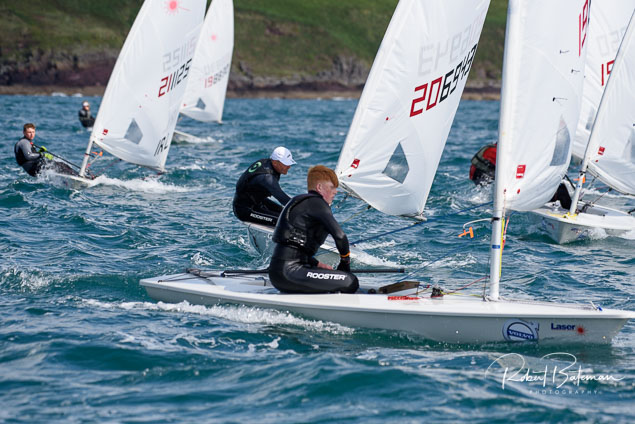
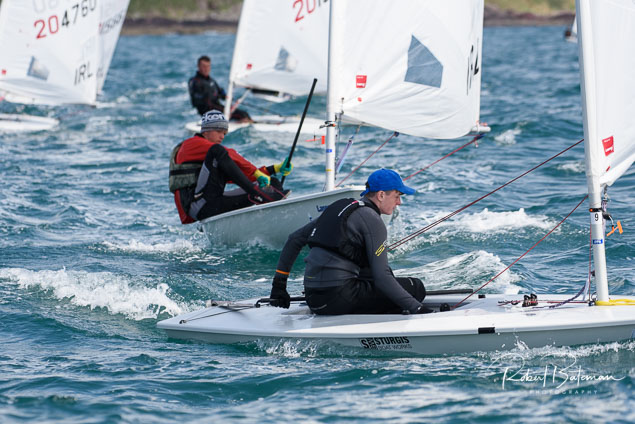
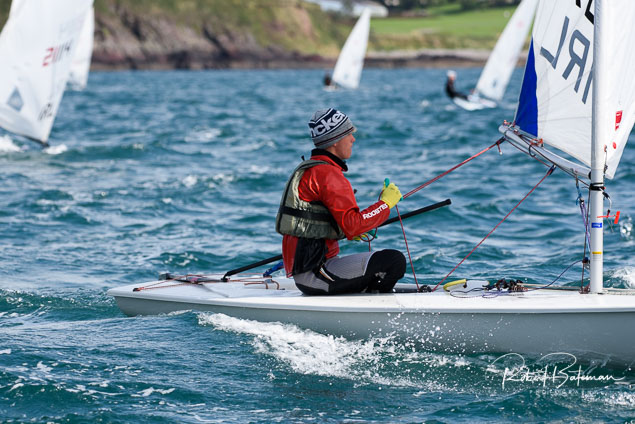
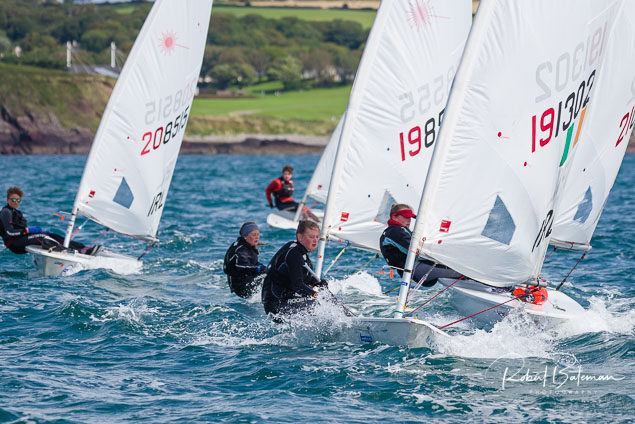
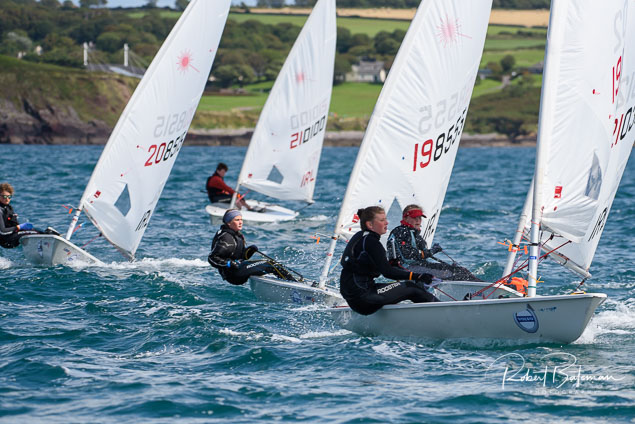
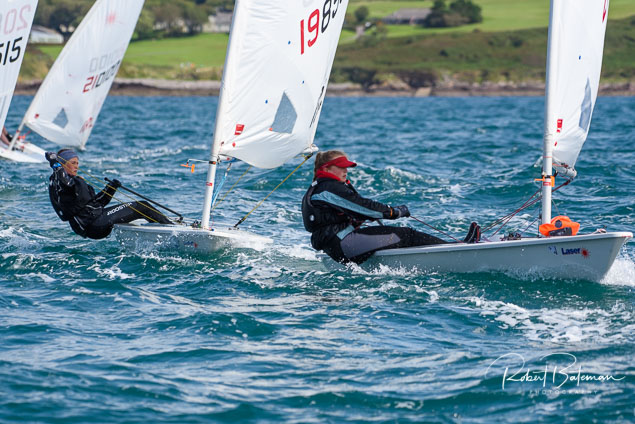
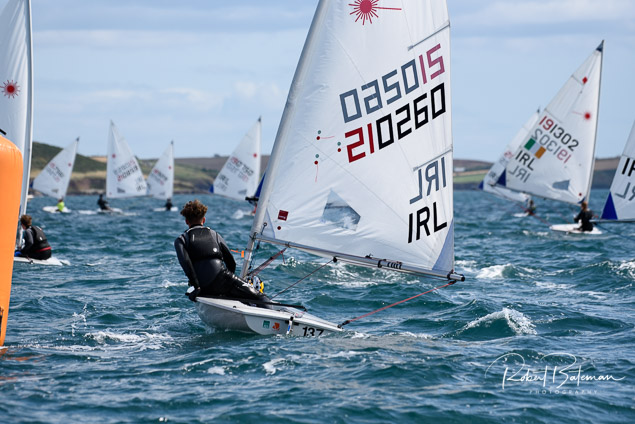
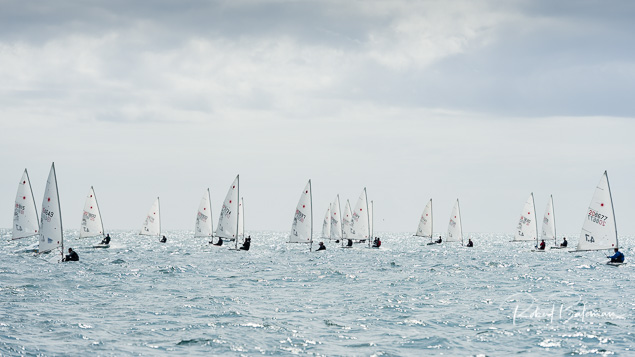
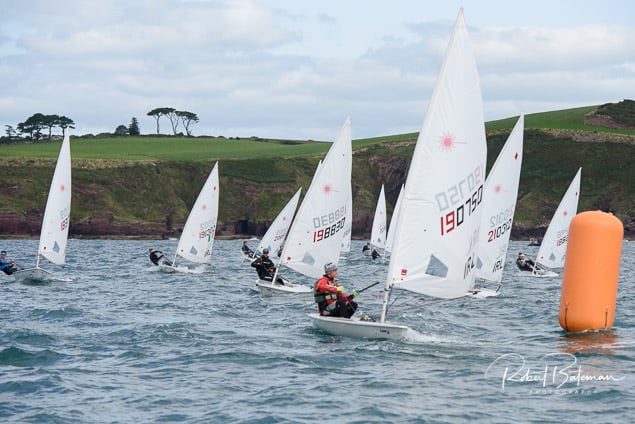
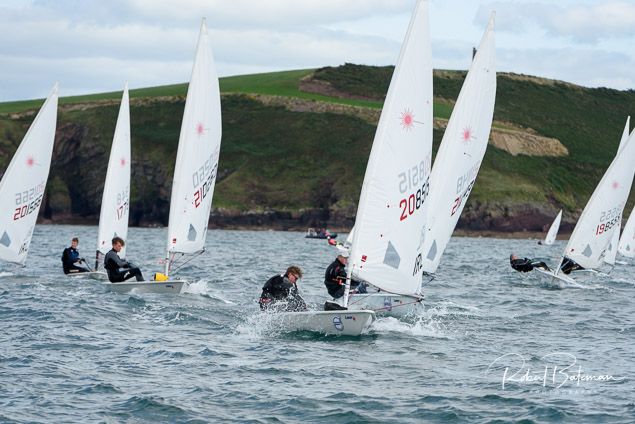
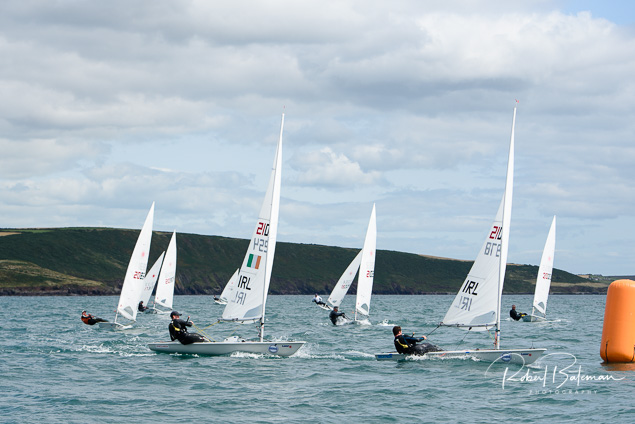
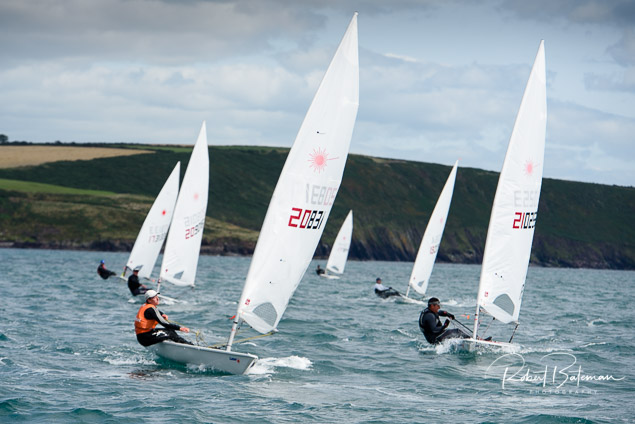
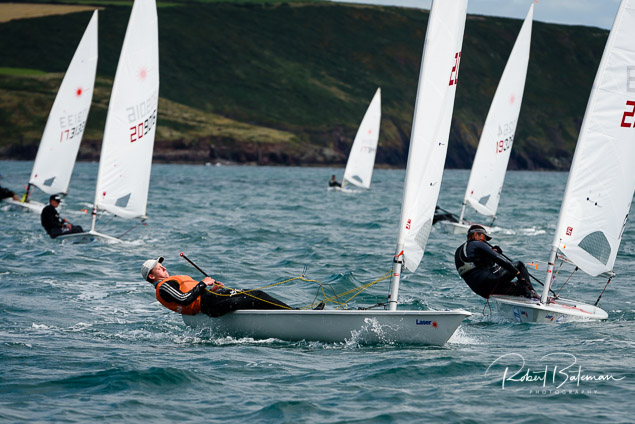
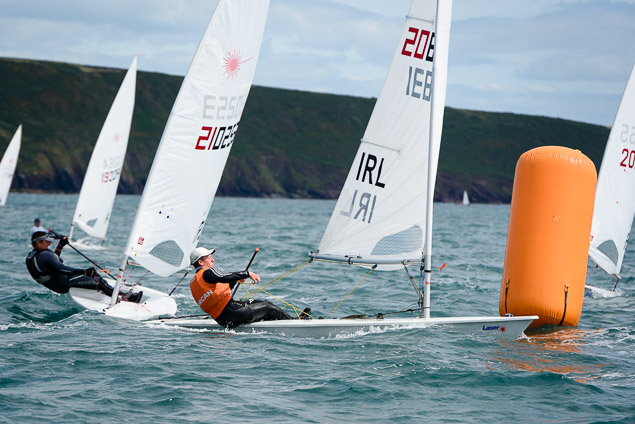
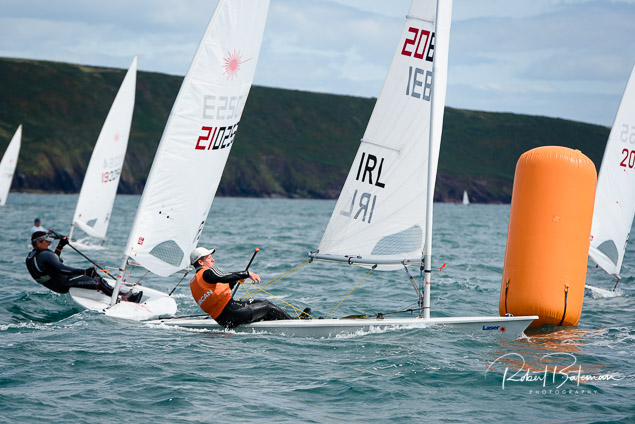
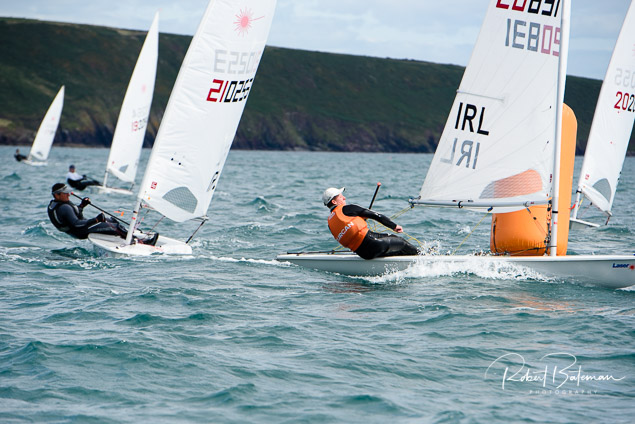
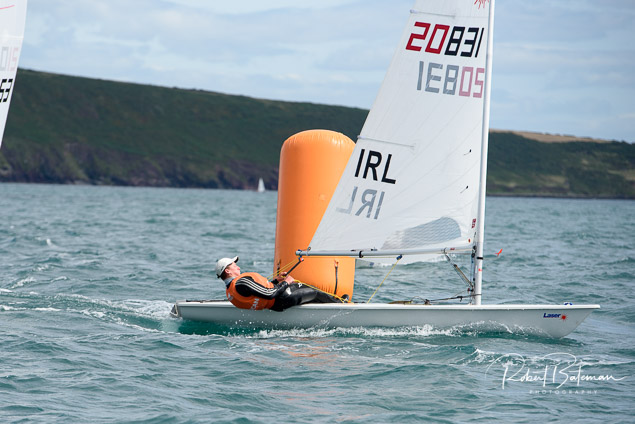
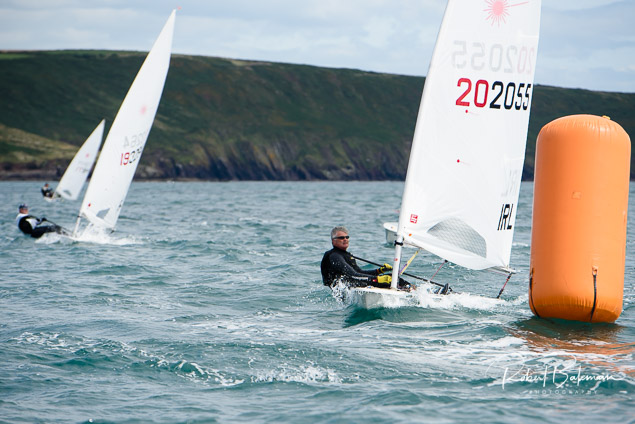
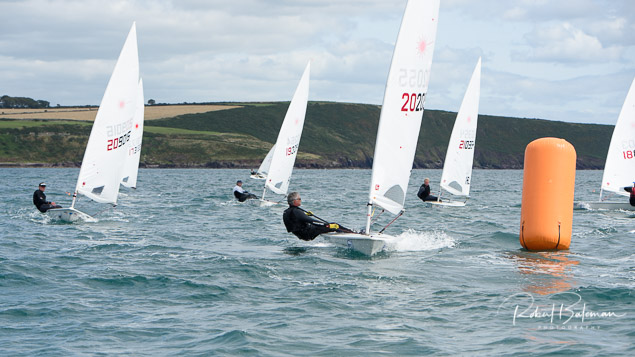
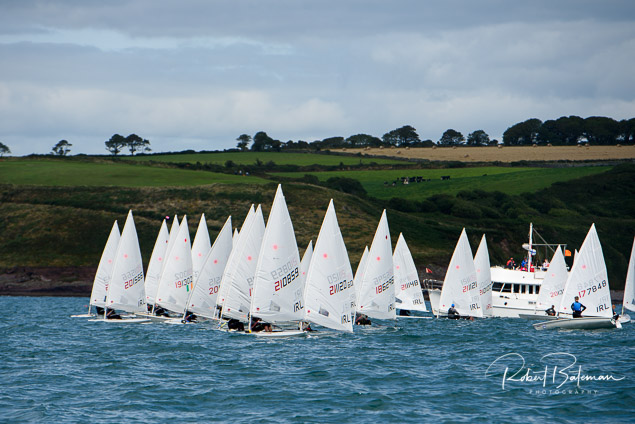
As announced at the recent National 18 Championships, the Cork N18 class are hosting a big party in the Royal Cork Yacht Club on Saturday, 9th September in recognition of Dom Long's 35 years of service to the class.
This will be run in conjunction with the Sutton Book event with guests from Sutton Dinghy Club racing N18's for the day.
There will be plenty of on the water action both sail and power along with a function in the club on Sat evening.
'I Stopped Breathing & Passed Out': Royal Cork's Johnny Durcan Recovering in Hospital After Capsize Accident at 29er Worlds
Royal Cork's top youth sailor Johnny Durcan has been involved in a serious incident competing at the 29er world championships where he was trapped under his skiff dinghy during a capsize. The top Laser sailor is recovering in hospital in Los Angeles after he ended up 'getting stuck beneath the water'.
Durcan has described the 'hectic end' to the championships on social media and relates how, after his '[trapeze] harness was caught, it led to 'drowning and total respiratory failure i.e. 'I stopped breathing and passed out'.
The Cork Harbour ace was one of two Irish 29ers competing at Long Beach, California, the other boat sailed by his twin brother Harry and Harry Whitaker, also of Royal Cork Yacht Club.
Durcan admits 'things were looking quite bad because I was under the water, unconscious for a while but thanks to the many sailors on the course who jumped out to help, I'm still here and kicking'.
It is understood, his 11–year–old helm Lola Kohl, from Christiansted, St Croix in the USA, raised the alarm and fellow competitors and coaches rushed to Durcan's assistance.
CPR was performed on the Irish youth champion. He was rushed ashore from the race course and an ambulance brought him to hospital immediately.
'My fellow competitors helped save me. And that's something that makes sailing the sport it is.' the Cork youth declared on Facebook, posting this photograph below from his hospital bed.
Parent's Yvonne and Tom Durcan were one of the first to post a comment online in response: 'One seriously relieved Mom and Dad xxxxxx'
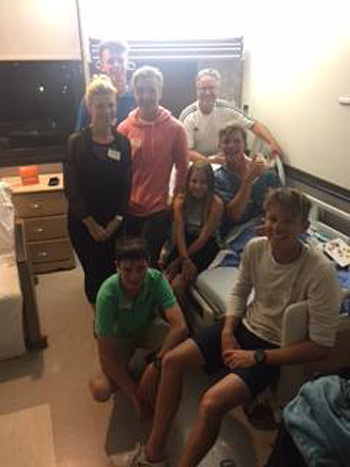 Johnny Durcan surrounded by well–wishers is recovering in an LA Hospital after a serious capsize incident at the 29er Worlds at Long Beach, California Photo: Facebook
Johnny Durcan surrounded by well–wishers is recovering in an LA Hospital after a serious capsize incident at the 29er Worlds at Long Beach, California Photo: Facebook
We wish Johnny a speedy recovery and the Irish 29er team a safe trip home – Ed.
Rounding Ballycotton Lighthouse on Saturday afternoon was satisfying, after a long beat from Crosshaven in the restored Royal Cork Ballycotton Race.
Over the 15-mile course which took about three hours a Northerly breeze veered through to an Easterly whisper and then - nothing. Coracle set the pace from the Grassy start line. As the course pulled rounded Roches Point the Easterly wind kicked in intermittently. Altair hugged the coast and as the white sails of Loch Gréine, Plumbat and Luna Sea followed this line those flying spinnakers no long benefited from the big sail. Passing Power Head the fleet split with the majority heading out to sea to avail of a tidal push while Altair and YaGottaWanna hunted breeze and wind lifts inshore.
As the fleet closed on Ballycotton Lighthouse Altair pulled a lead over Coracle, rounding Ballycotton Island and heading for the finish in what was becoming a very soft breeze, Coracle and YaGottaWanna rounded as the wind died further, with Loch Gréine and the kites of Cavatina and Scribbler II edging to the finish line. Plumbat and Luna Sea, in whitesail. without the option of a kite and no wind had to retire.
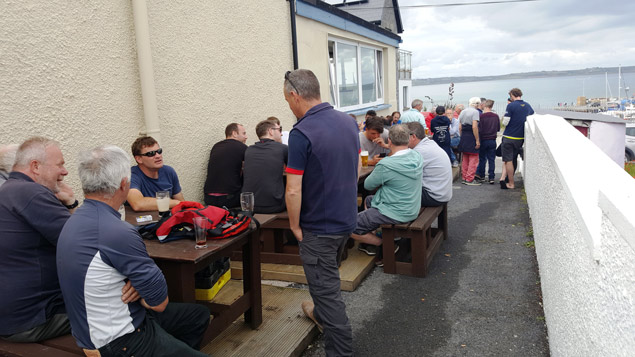 Relaxing in Ballycotton after the sailing
Relaxing in Ballycotton after the sailing
Results: IRC – 1st Altair (K.Dorgan/J.Losty); 2nd Coracle (Kieran Collins); 3rd Ya Gotta Wanna (David Lane/Sinead Enright). ECHO – 1st Loch Gréine (Tom/Declan O’Mahony); 2nd Scribbler (Tom/Cormac MacSweeney); 3rd Cavatina (Ian Hickey). Gas Rigs Trophy/ECHO and Paddy and Peg Walsh Trophy/IRC– Altair. Jim Donegan Trophy, Best Family Boat – Coracle.
This is a race which was traditional and the RCYC Cruiser Classes are interested in getting more boats involved in coastal racing. It has invited those interested, boatowners or potential crews to make contact with the club.
Alex Barry and Richard Leonard successfully defended their RS400 Southern Championship crown this afternoon at Royal Cork Yacht Club. The dinghy duo were just one of many winners at the second edition of the multi–dinghy championships in Cork Harbour that attracted over 100 boats.
The three day event produced some very tight racing in spectacular conditions for the centreboard classes as illustrated in Bob Bateman's RCYC Dinghy Fest Galleries on Day One, Day two and Day three (including prizegiving).
As reported in our Dinghy Fest preview, also running as part of the weekend was the RS 200 Euro Cup & Irish National Championships, the National 18 National Championships, the RS Feva and RS 400 Southern Championships plus a PY fleet an Optimist fun Fleet and a demo Moth fleet.
Barry and Leonard beat Belfast Lough's Gareth Flannigan and David Fletcher of Ballyholme Yacht Club for the top prize after six races by one point in a 12–boat fleet.
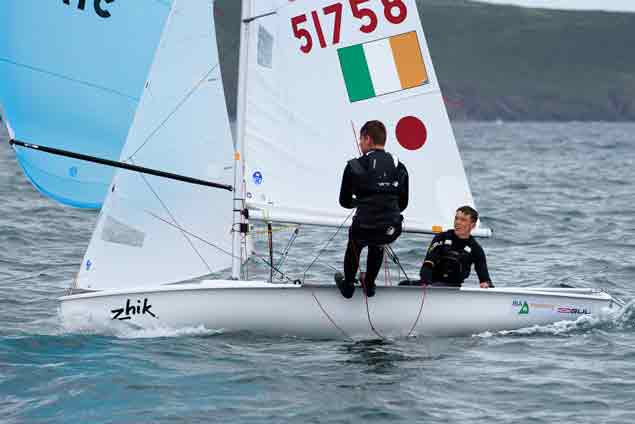 Geoff Power and James McCann, 420 National Champions. Photo: Bob Bateman
Geoff Power and James McCann, 420 National Champions. Photo: Bob Bateman
This month's Kiel Week top ten performers, Geoff Power and James McCann were winners of the 15-boat 420 Irish Championships after nine races but only by a single point from Kinsale Yacht Club's Micheal O'Suilleabhain and Michael Carroll. Third were Dublin's Kate Lyttle and Niamh Henry from the Royal St George YC.
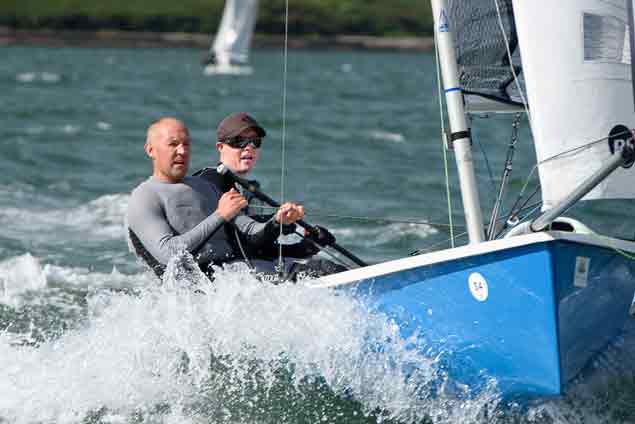 Neil Spain and Shane Hughes were RS200 Euro Cup and Irish National Championships winners. Photo: Bob Bateman
Neil Spain and Shane Hughes were RS200 Euro Cup and Irish National Championships winners. Photo: Bob Bateman
In the biggest Fest fleet, Neil Spain and Shane Hughes of Howth Yacht Club were winners by three points after nine races in the 21–boat RS200 fleet. Greystones Sailing Club's Marty O'Leary and Rachel Williamson were second and RStGYC's Sean Craig and Rosemary Tyrell were third.
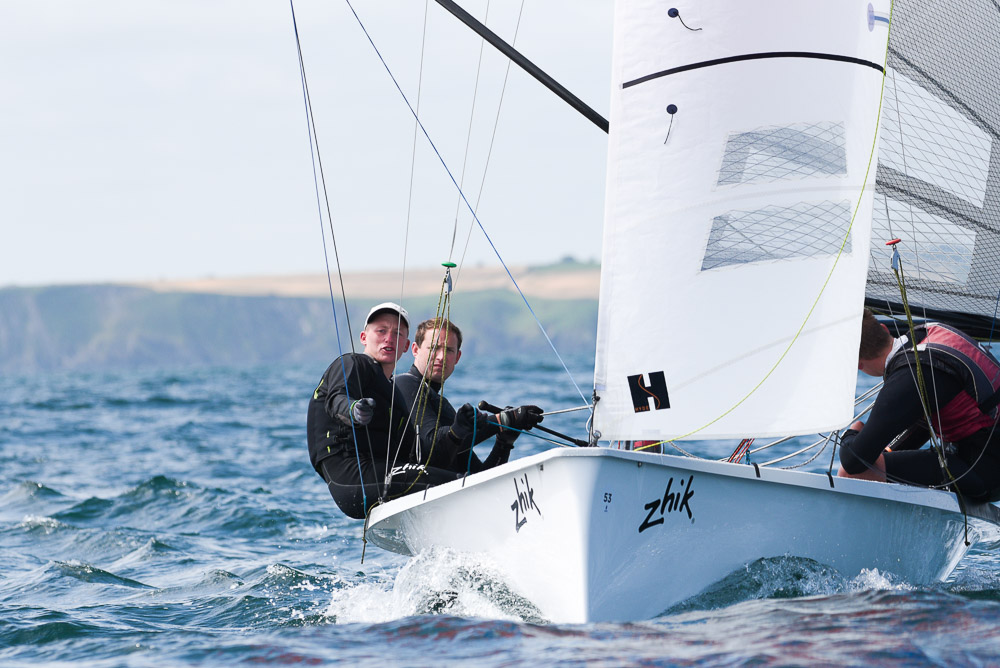 Charles Dwyer was the winner of a nine–boat National 18 fleet
Charles Dwyer was the winner of a nine–boat National 18 fleet
The National 18 fleet did not make double figures for its national championships on home waters which is somewhat disappointing given the hype around its new Morrisson design. Royal Cork's Charles Dwyer beat Tom Dwyer with Ewen Barry of Monkstown Bay Sailing Club third.
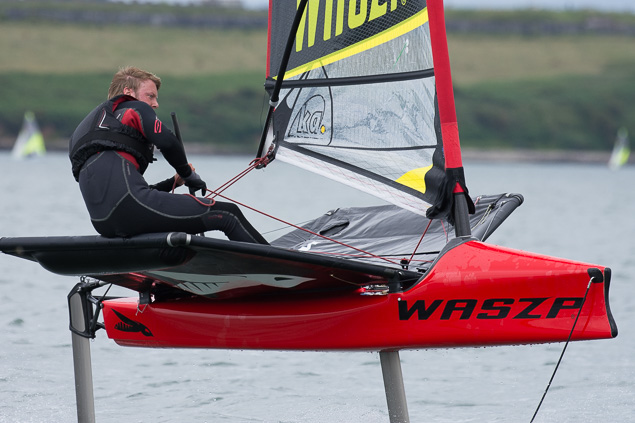 John Chambers on the new Waszp foiler Photo: Bob Bateman
John Chambers on the new Waszp foiler Photo: Bob Bateman
Rory Fitzpatrick beat Neill O'Toole in a battle of the Moth's with John Chambers WasZP debut third of three foilers in the weekend's 'Extreme fleet'.
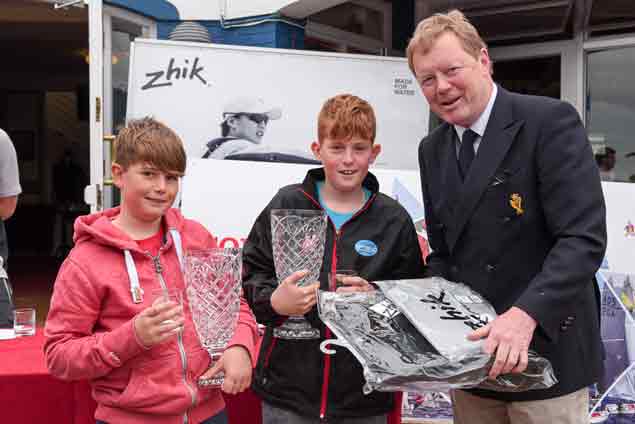 Harry and Simon Pritchard were RS Feva Southern Championships winners. The pair were also crowned Dinghy Fest 2017 Champions on the basis of their scoresheet: six race wins out of six! Photo: Bob Bateman
Harry and Simon Pritchard were RS Feva Southern Championships winners. The pair were also crowned Dinghy Fest 2017 Champions on the basis of their scoresheet: six race wins out of six! Photo: Bob Bateman
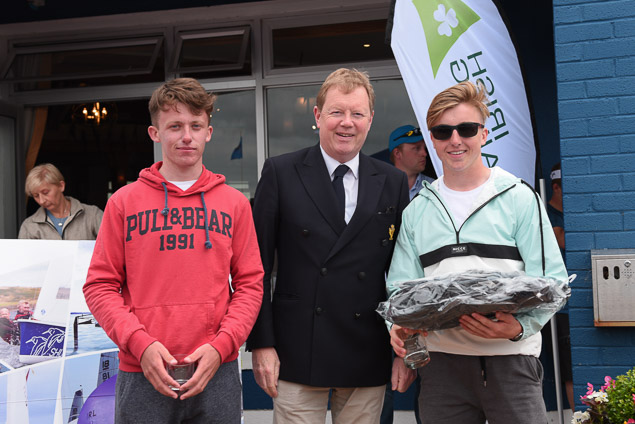 Harry Durcan and Harry Whitaker won the Dinghy Fest mixed dinghies fleet Photo: Bob Bateman
Harry Durcan and Harry Whitaker won the Dinghy Fest mixed dinghies fleet Photo: Bob Bateman
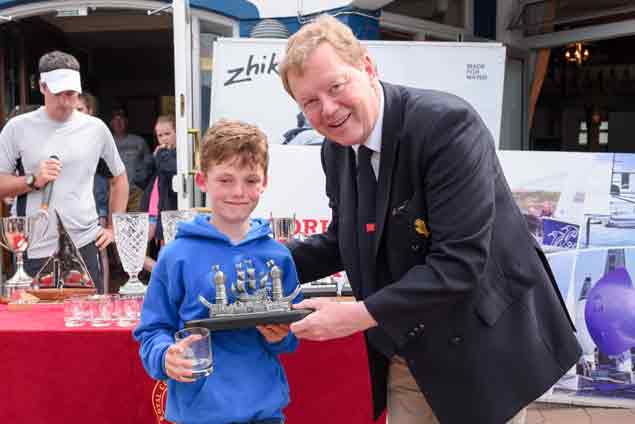 JP Curtin, the Optimist Fun Fleet Winner. Photo: Bob Bateman
JP Curtin, the Optimist Fun Fleet Winner. Photo: Bob Bateman
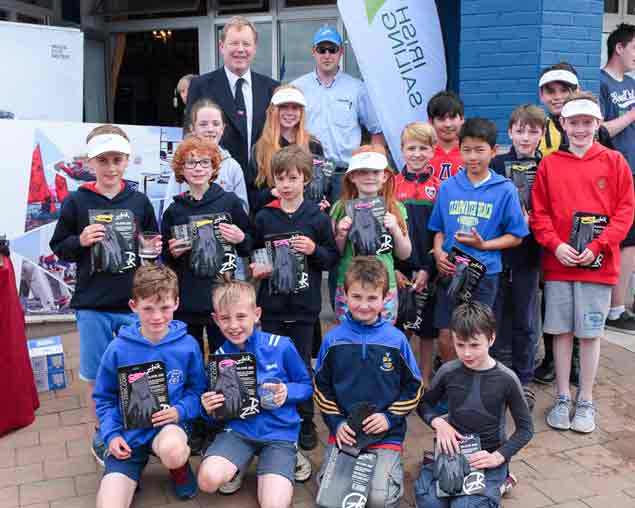 The Optimist Dinghy Fest fun fleet Photo: Bob Bateman
The Optimist Dinghy Fest fun fleet Photo: Bob Bateman
Results are here
Dinghy Fest Photo Gallery at Royal Cork – Day One
The 2017 Dinghy Fest opened today at Royal Cork Yacht Club. A delayed start due to high winds saw 420s and RS200s race at 3pm.
Bob Bateman captured the Cork Harbour action.
Racing continues tomorrow
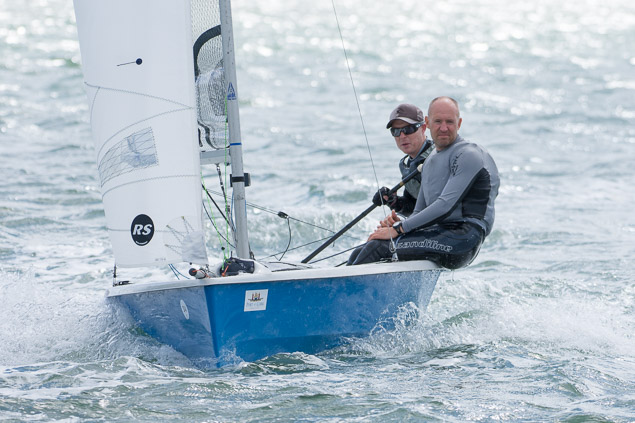
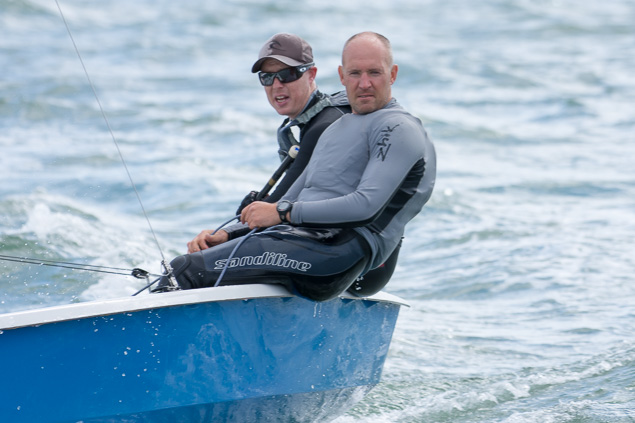
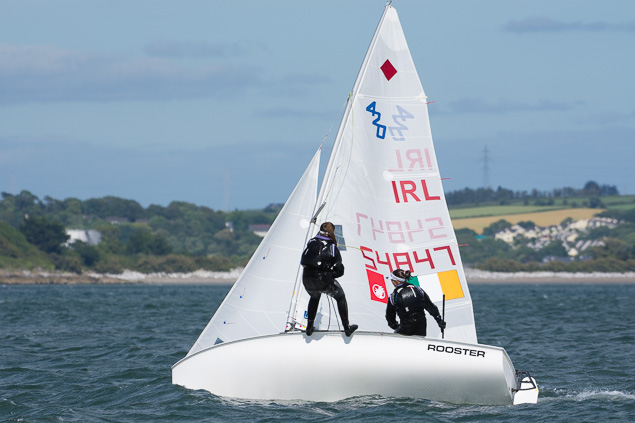
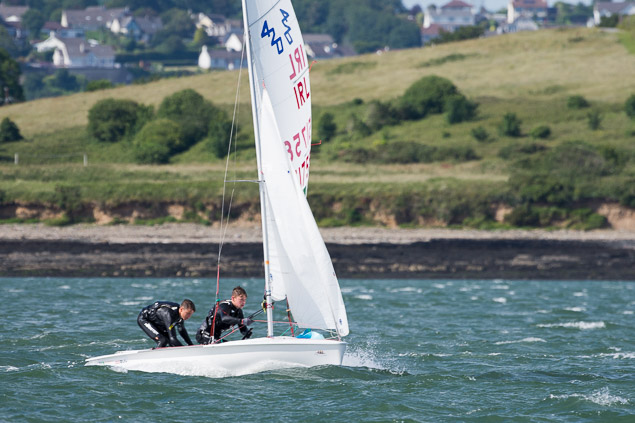
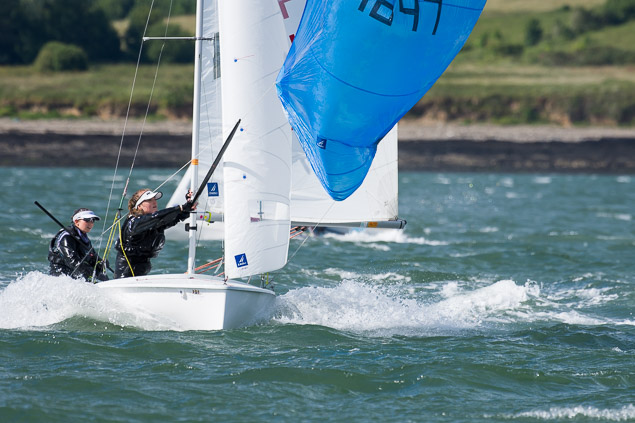
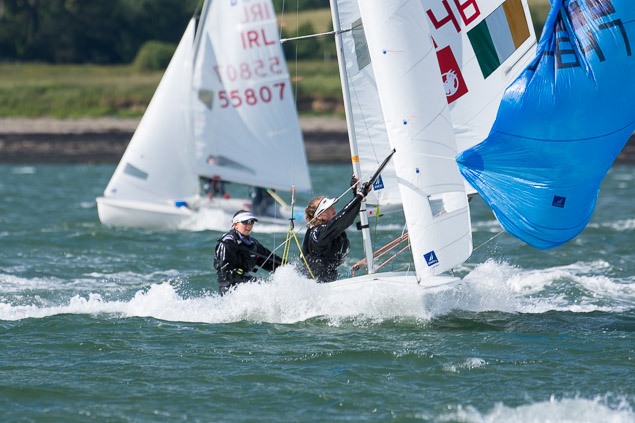
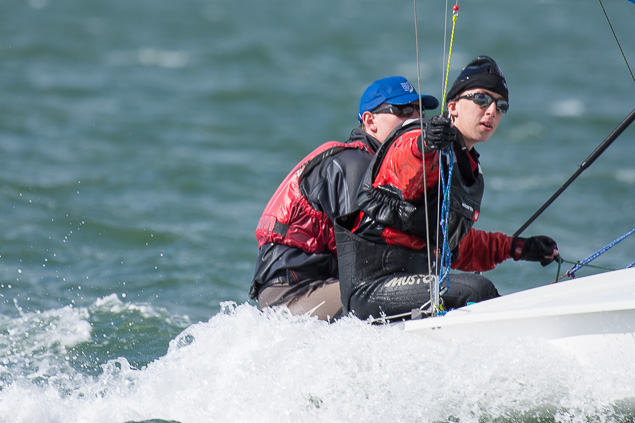
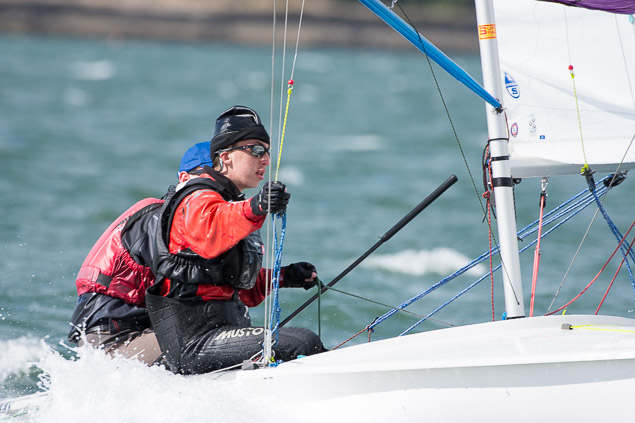
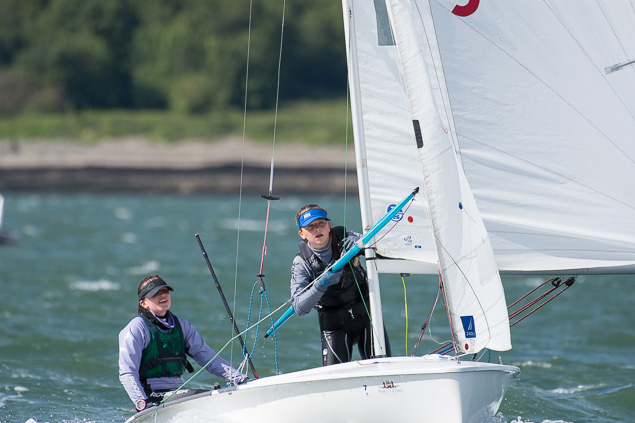
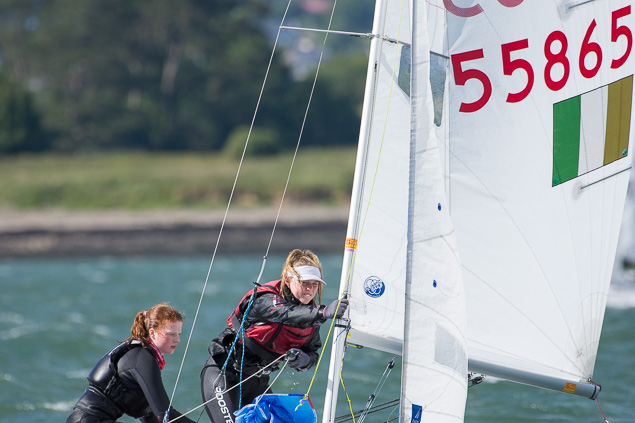
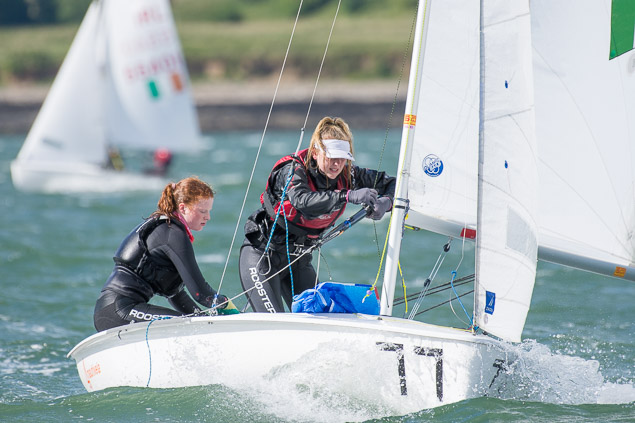
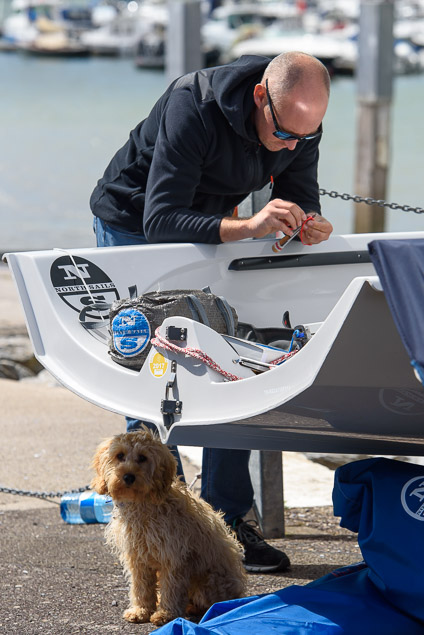
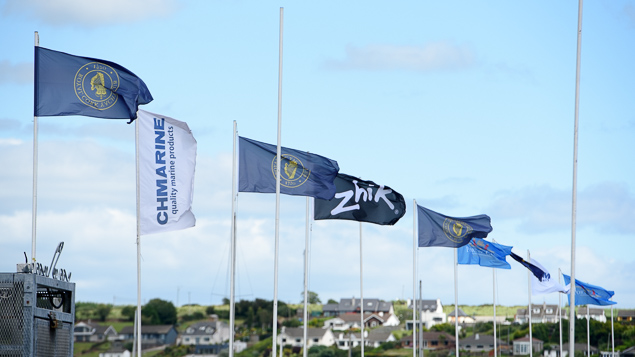
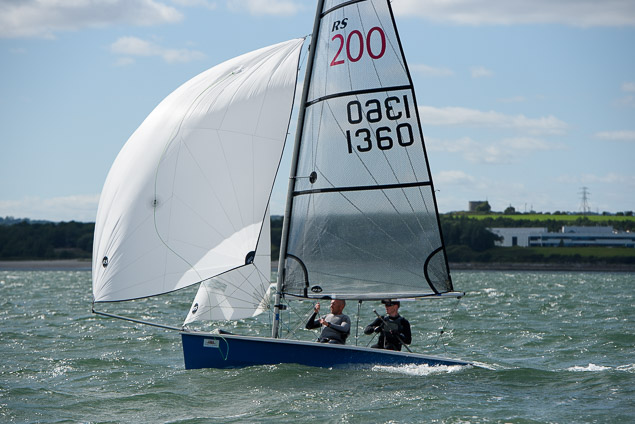
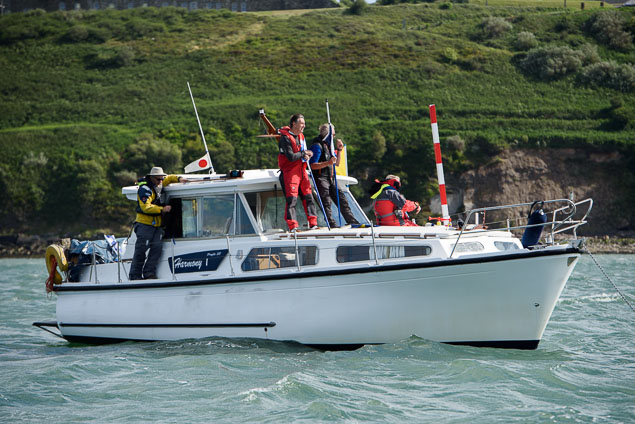
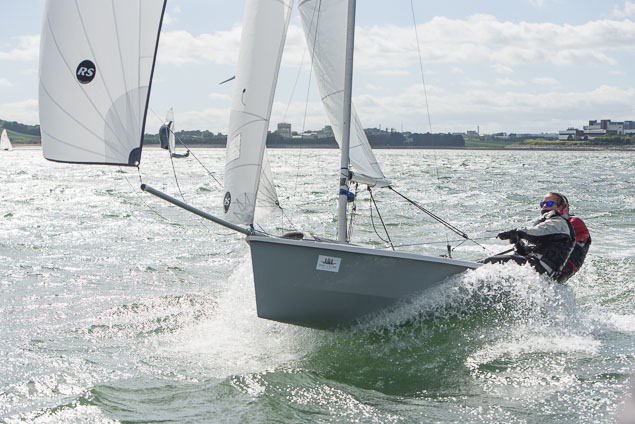
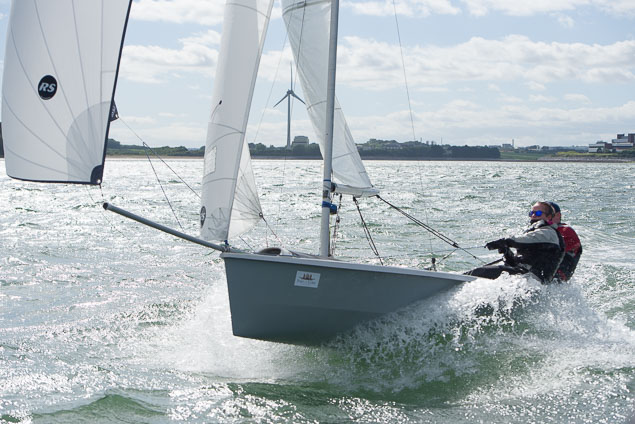
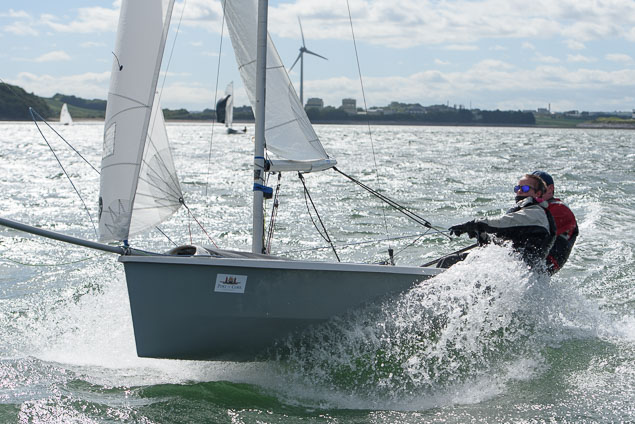
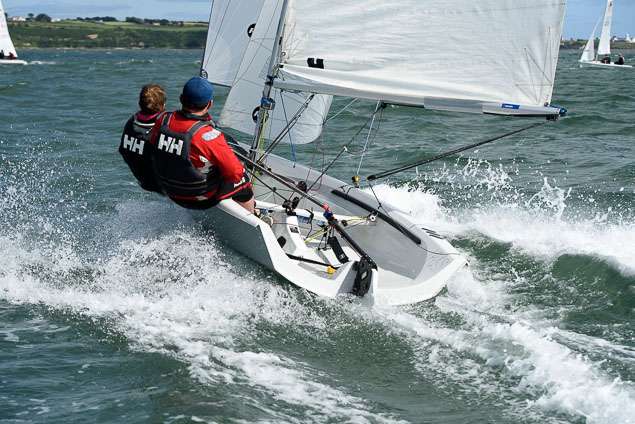
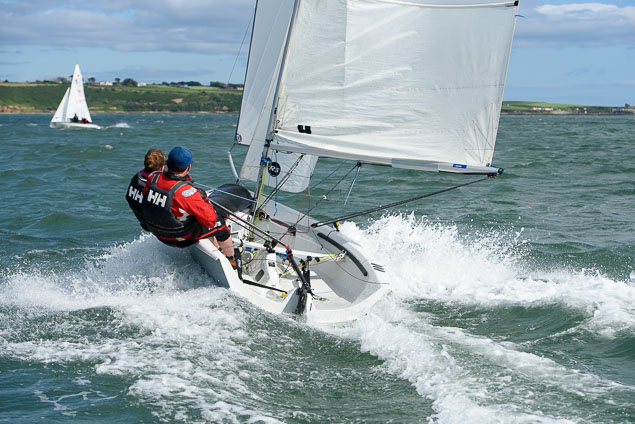
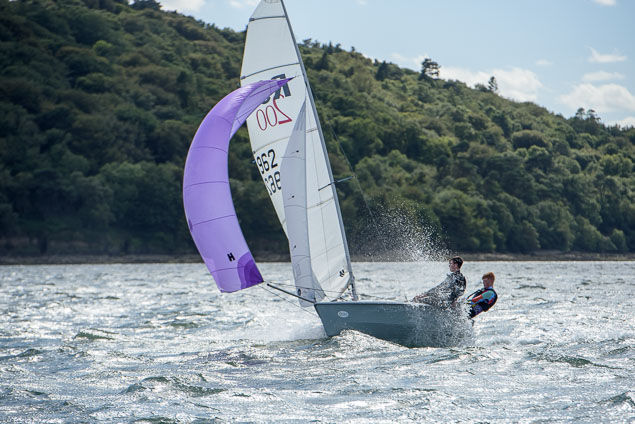
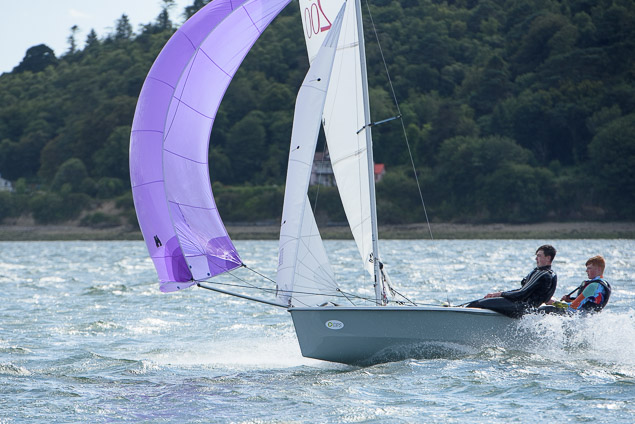
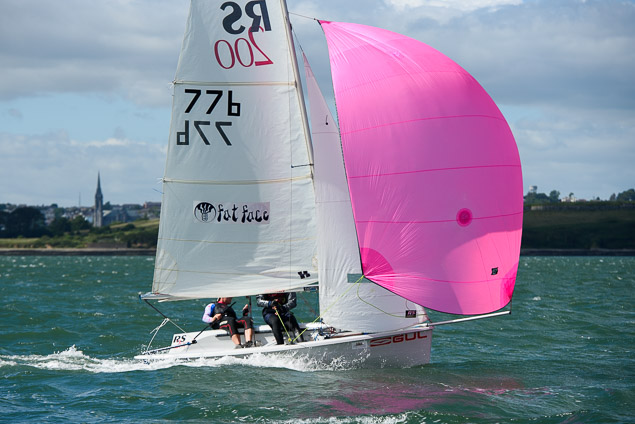
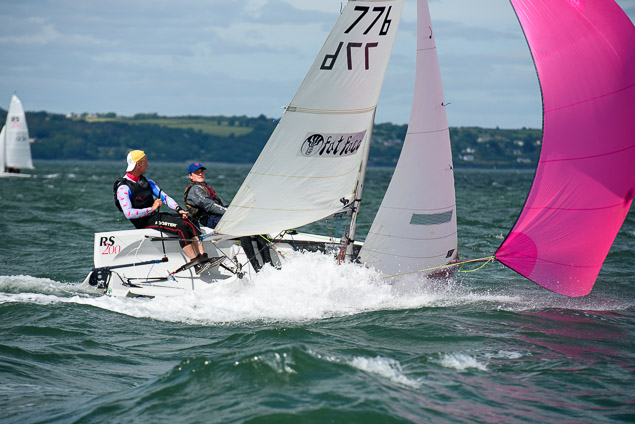
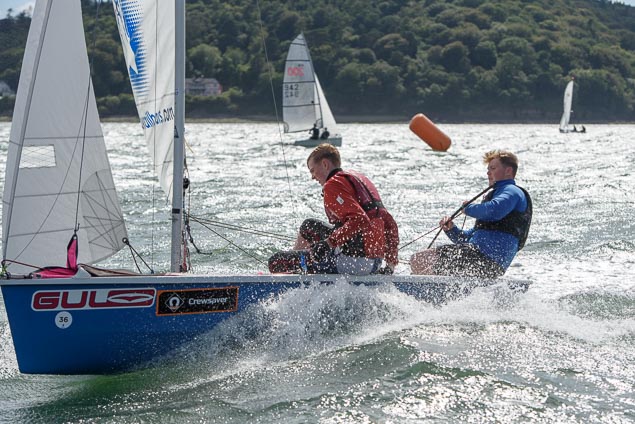
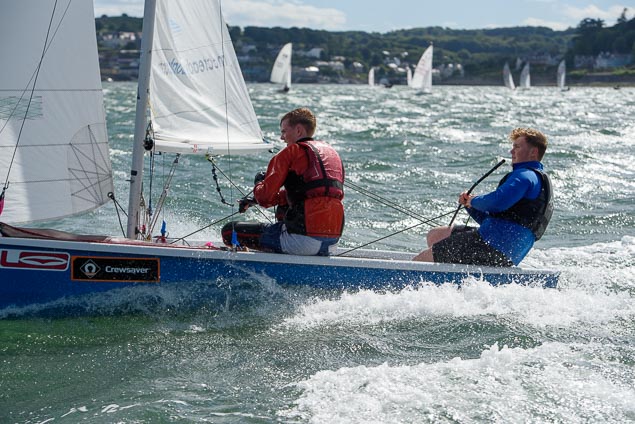
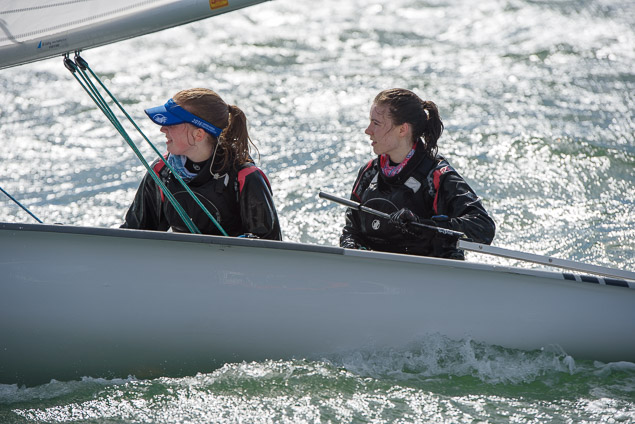
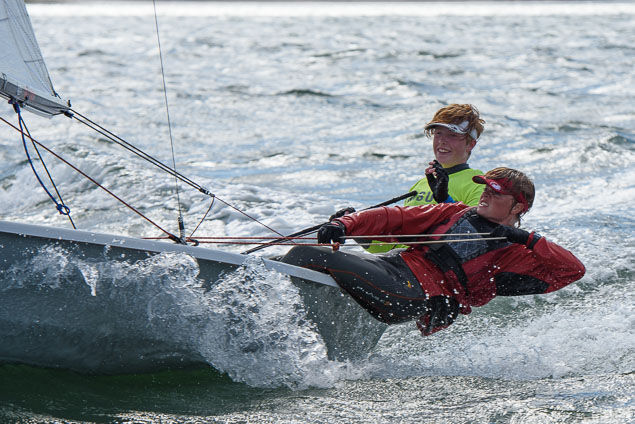
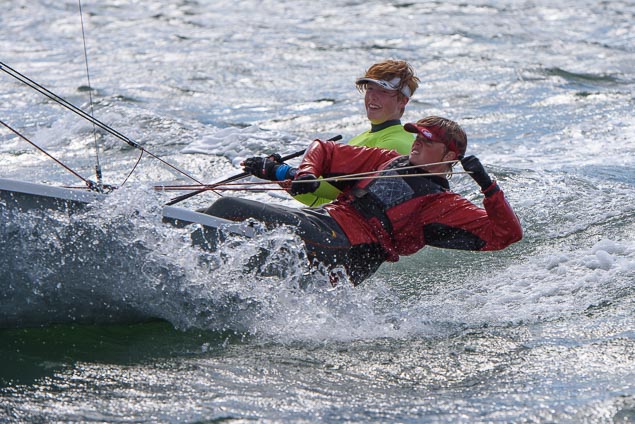
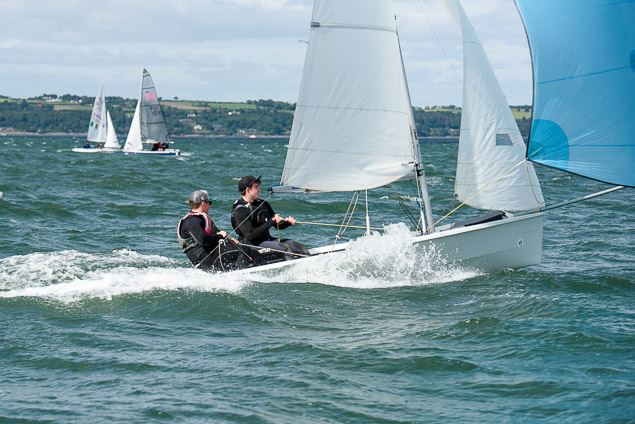
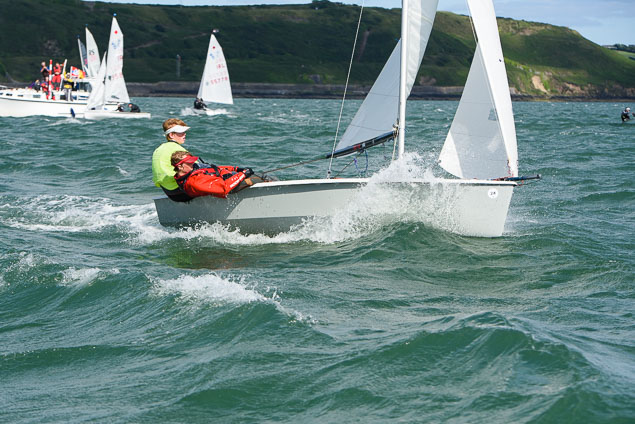
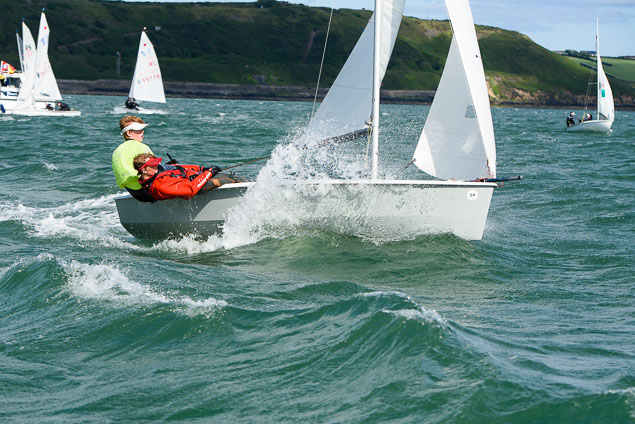
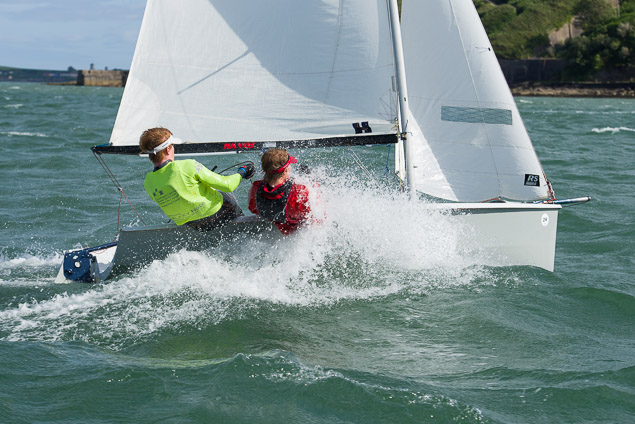
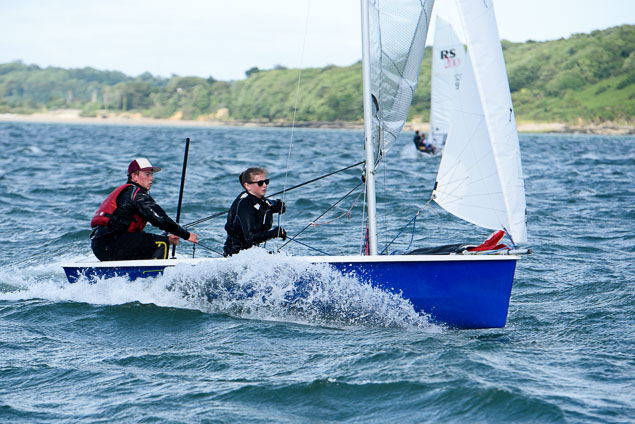
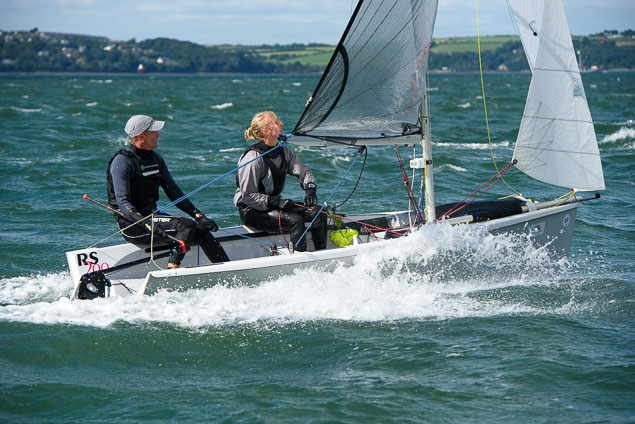
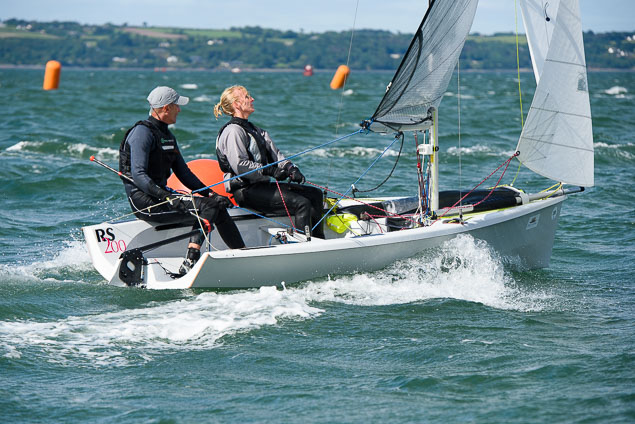
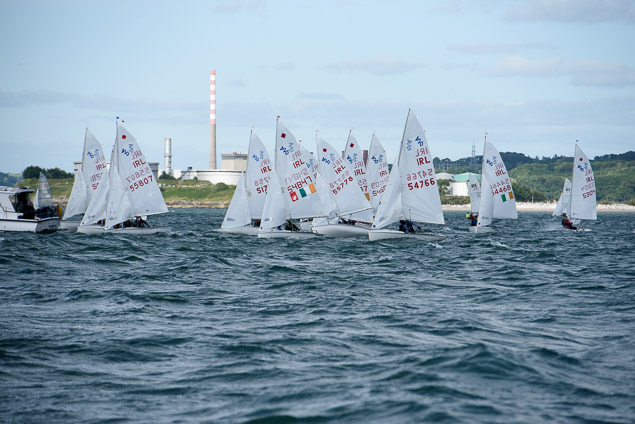
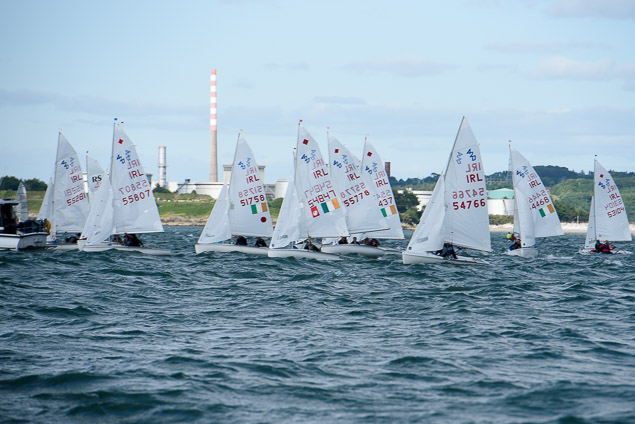
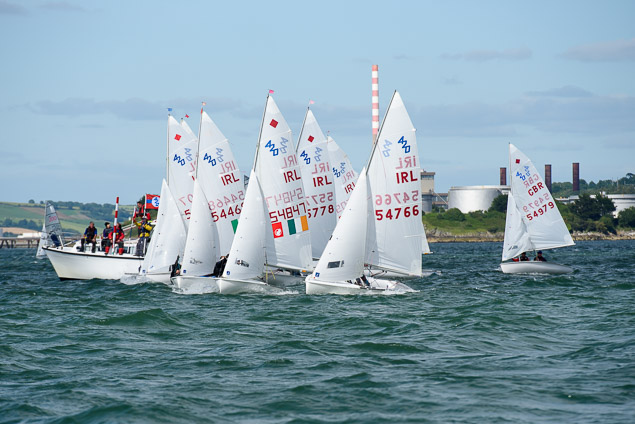
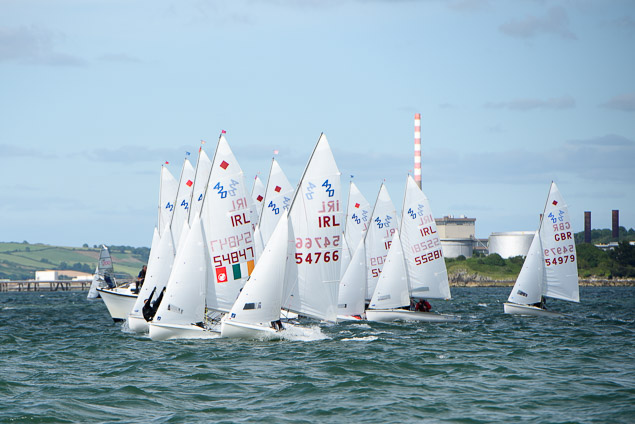
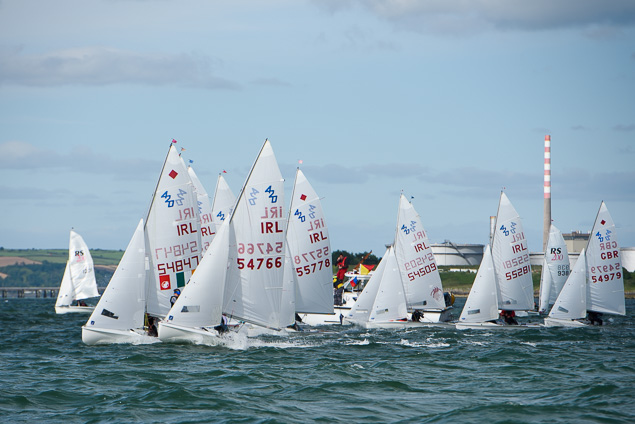
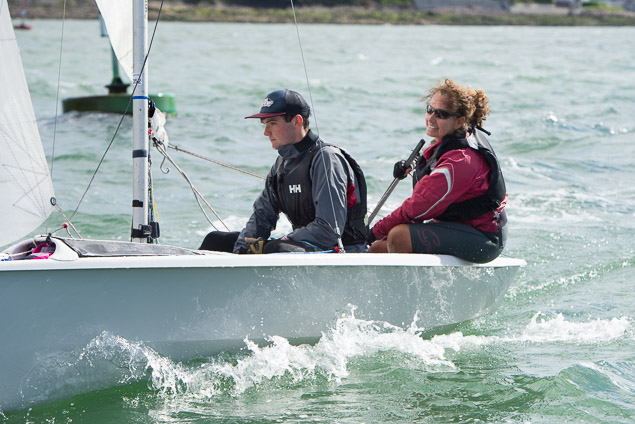
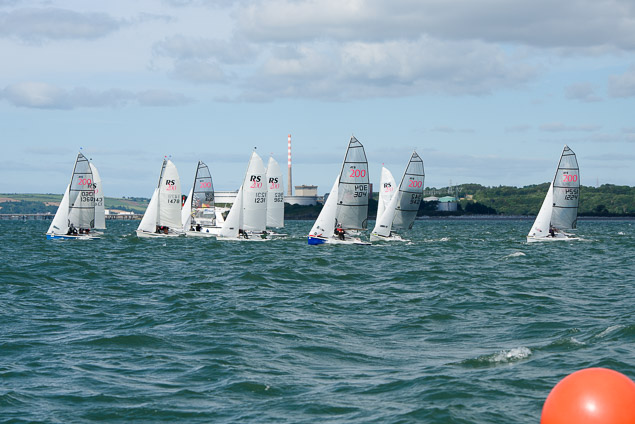
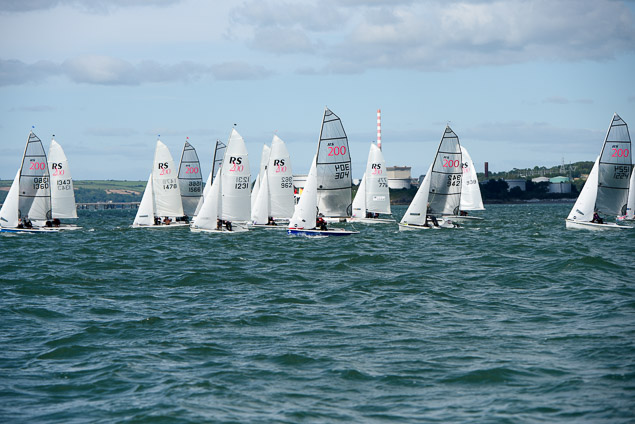
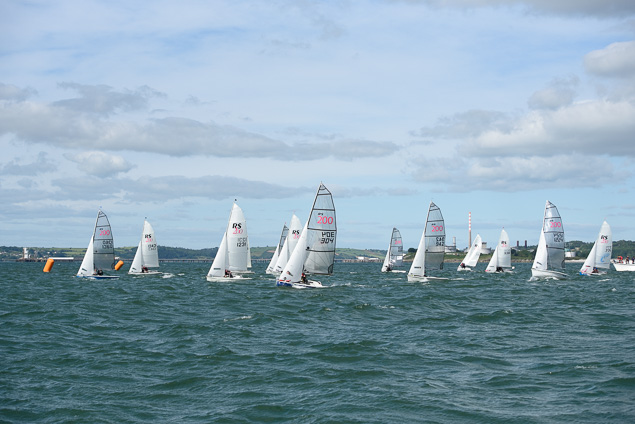
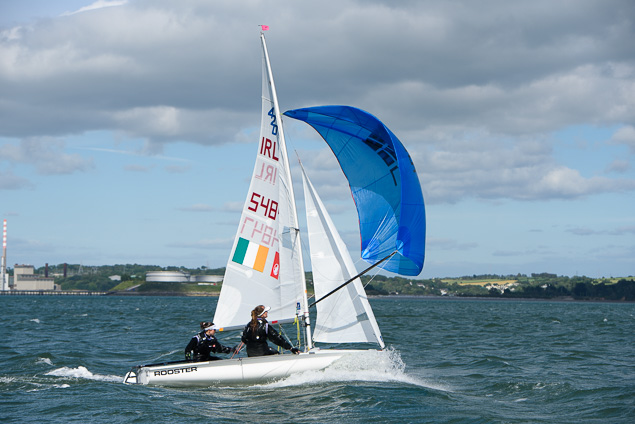
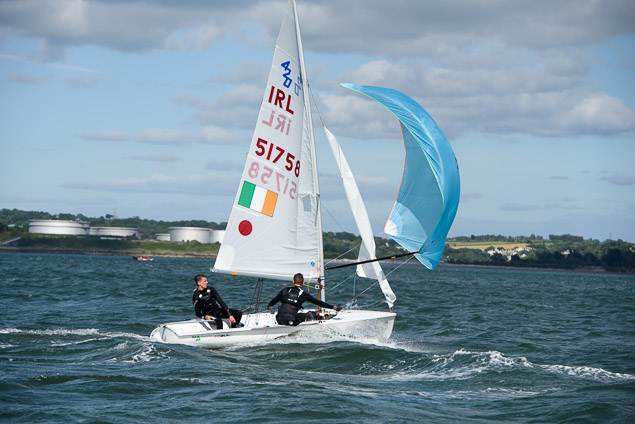
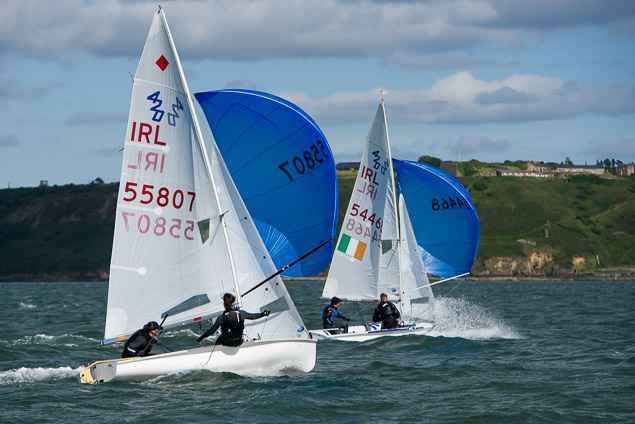
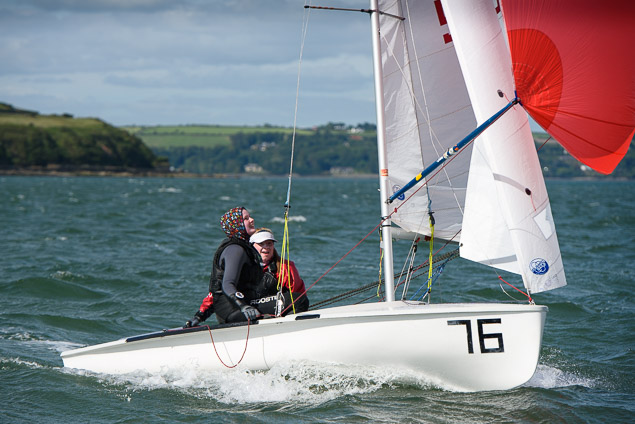
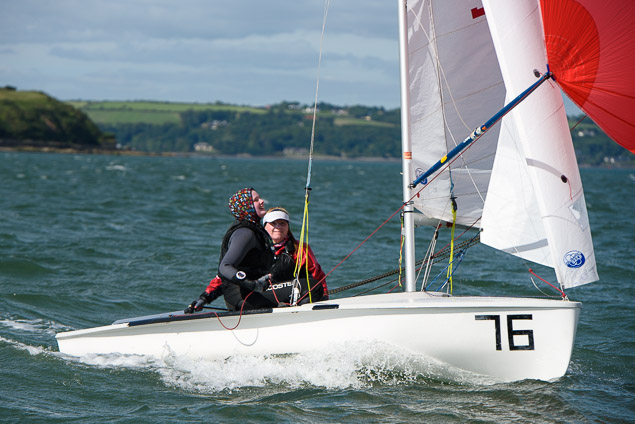
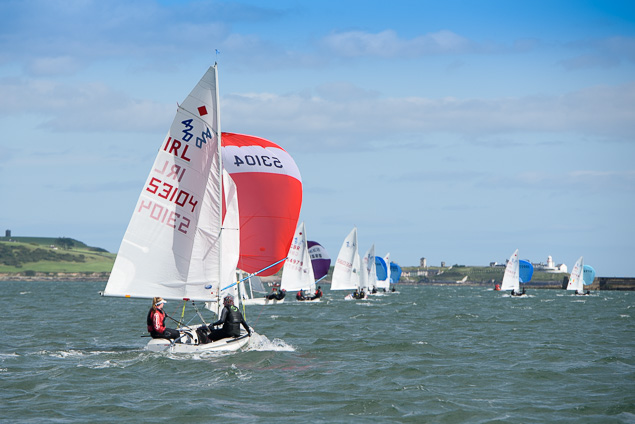
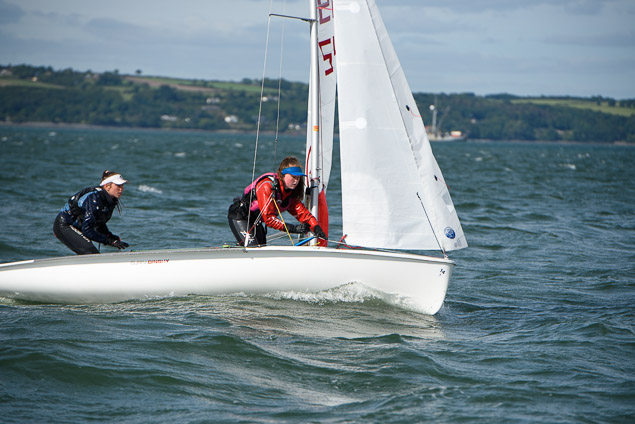
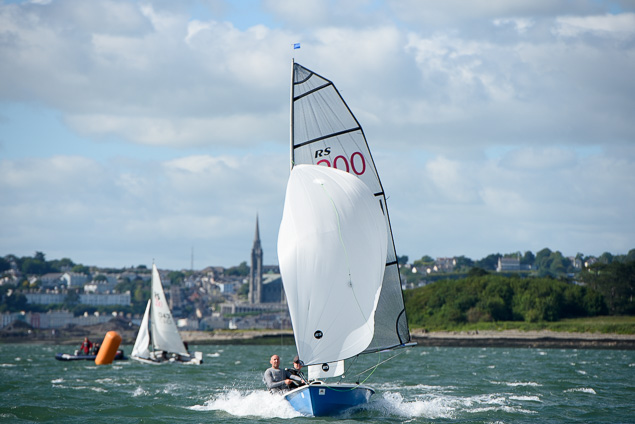
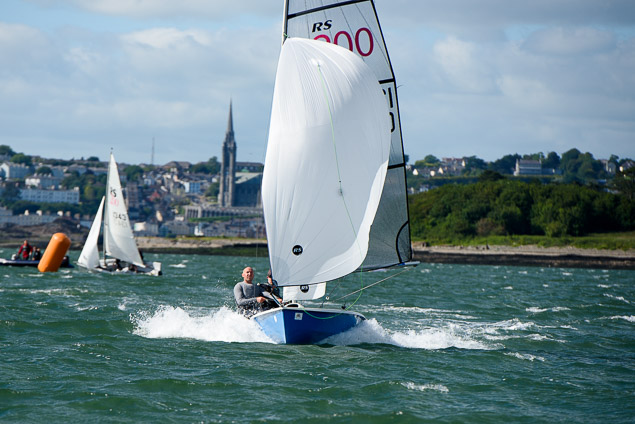
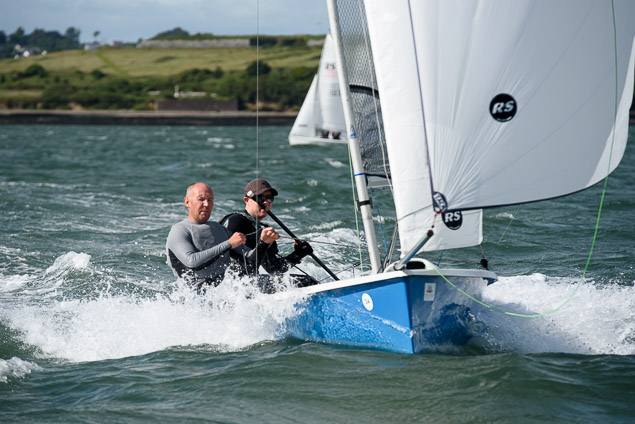

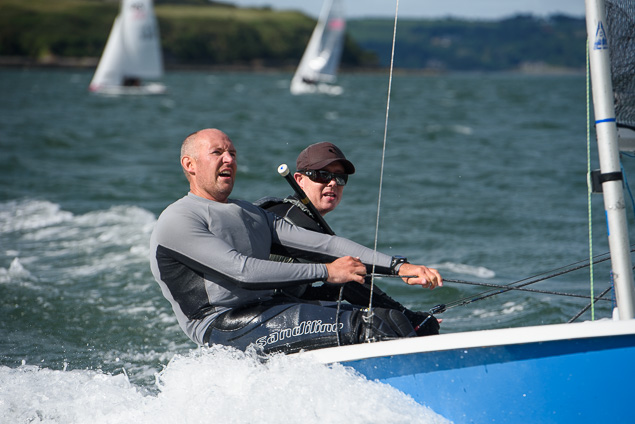
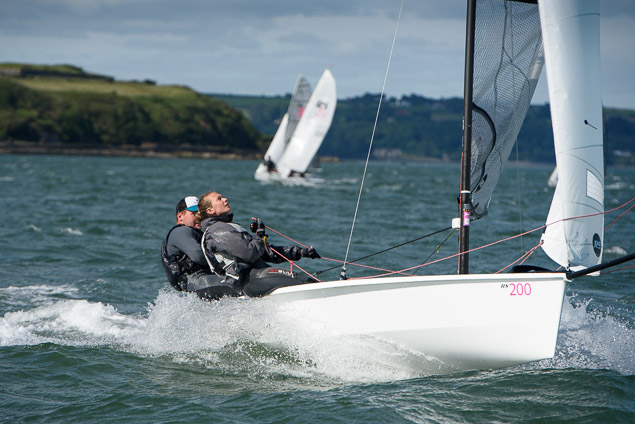
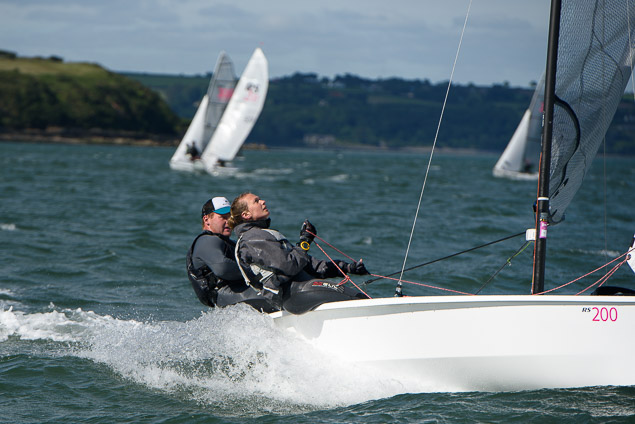
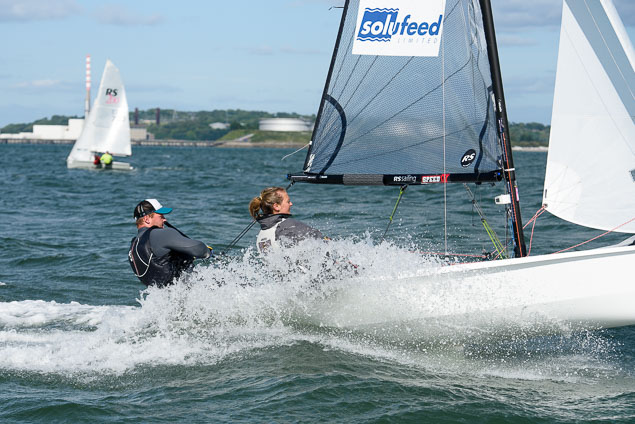
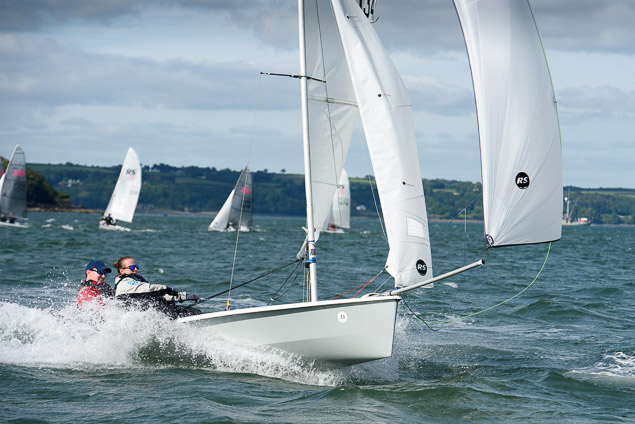
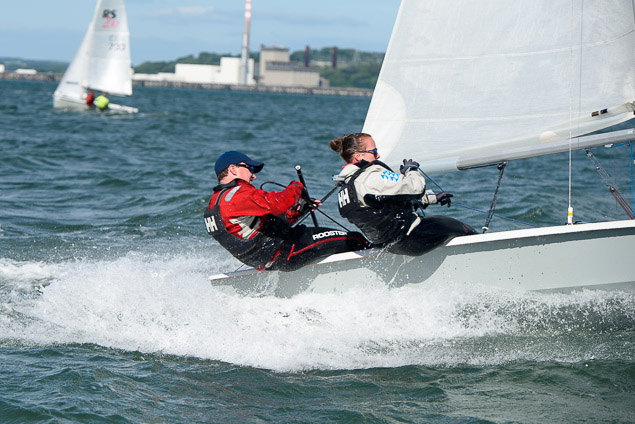
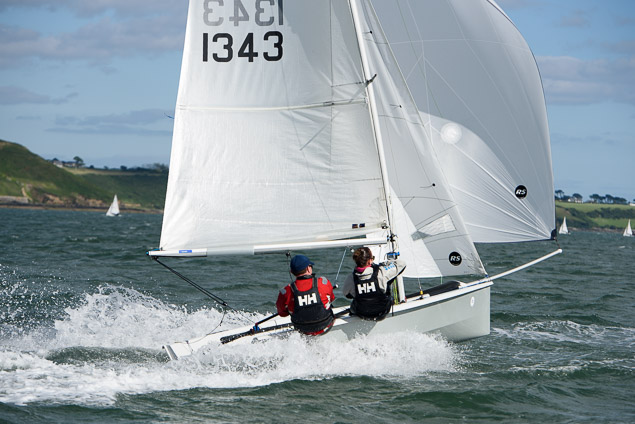
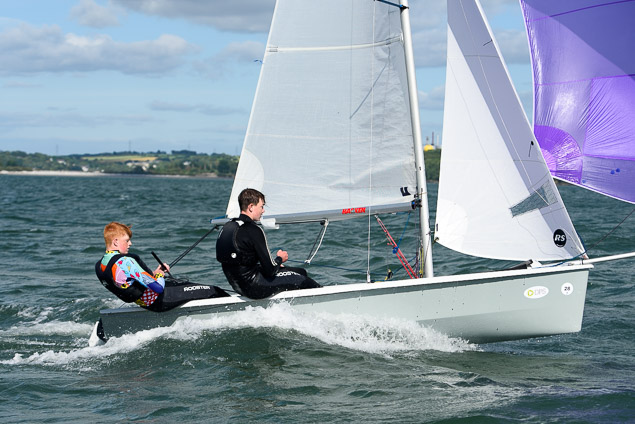
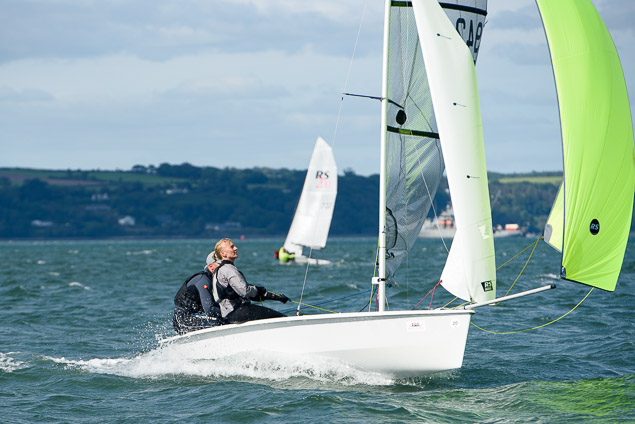
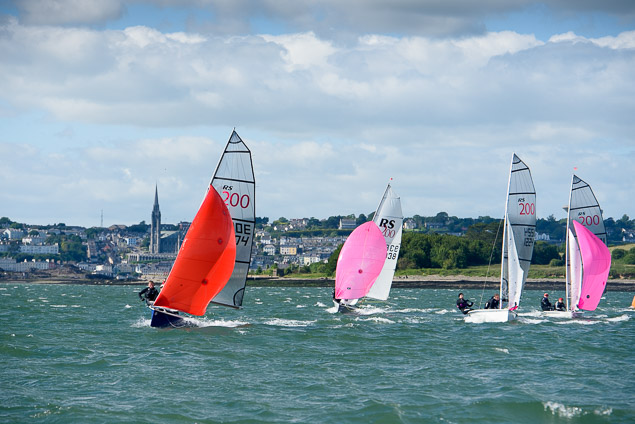
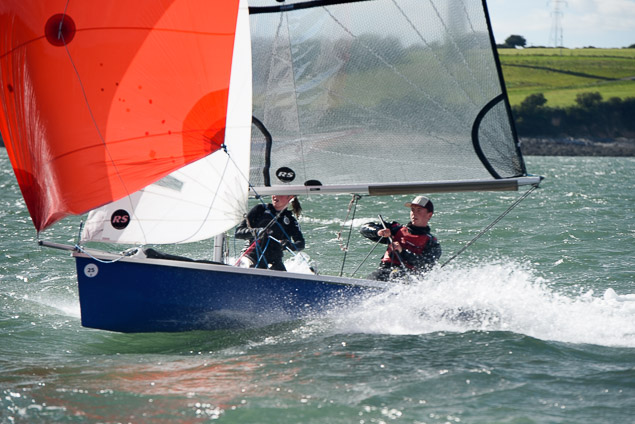
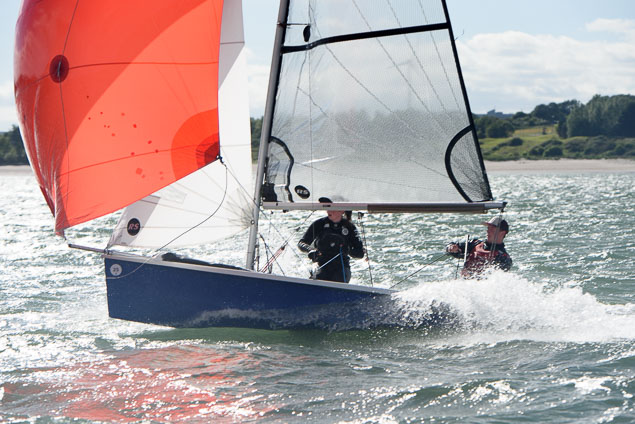
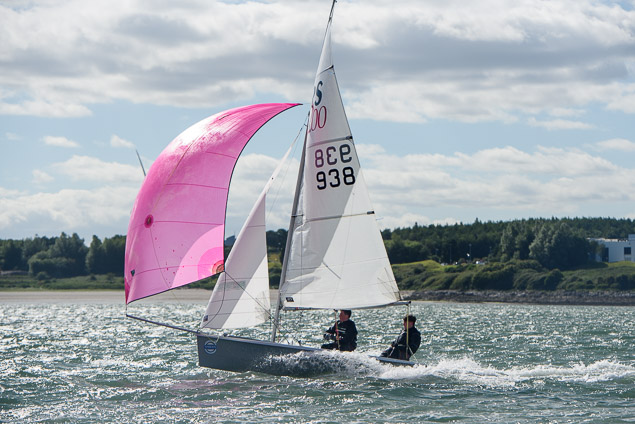
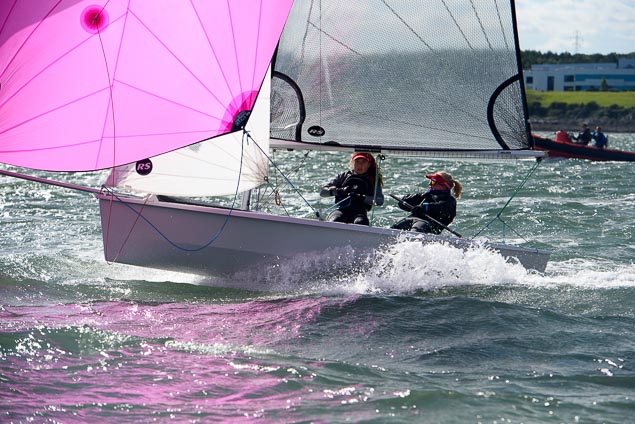
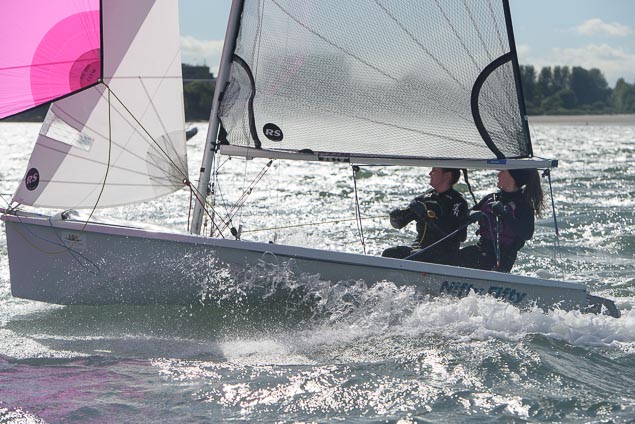
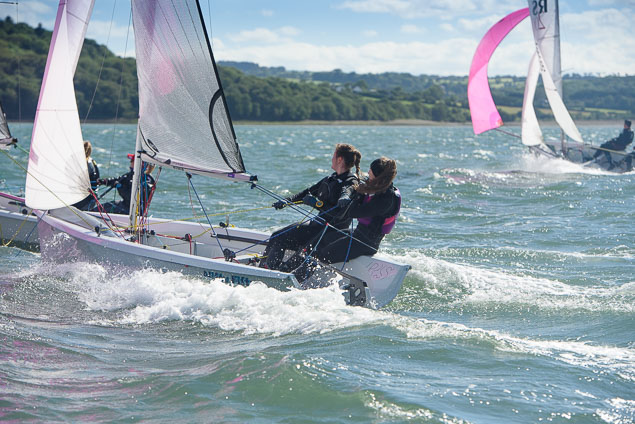
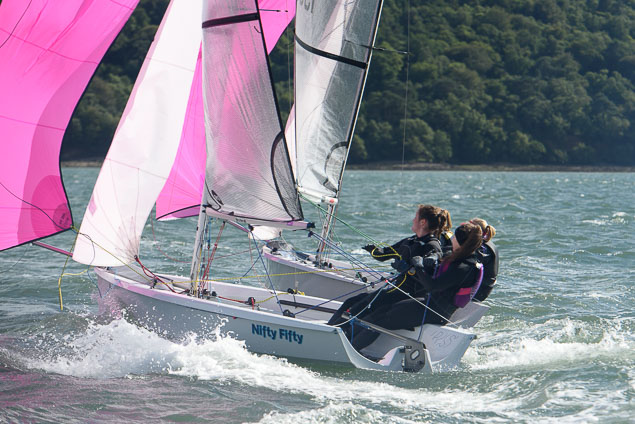
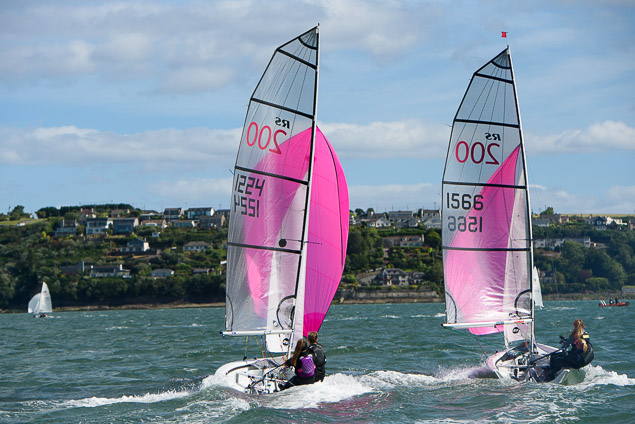
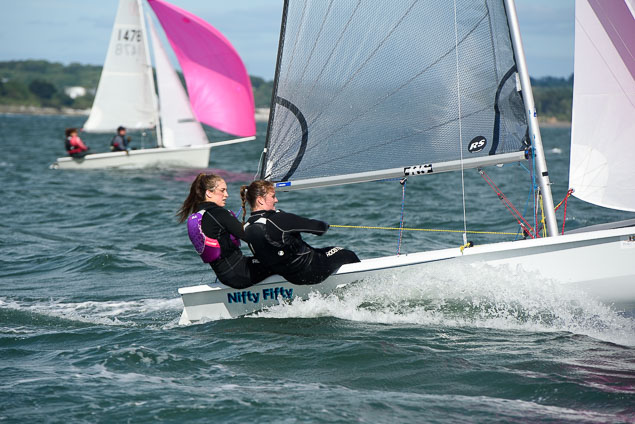
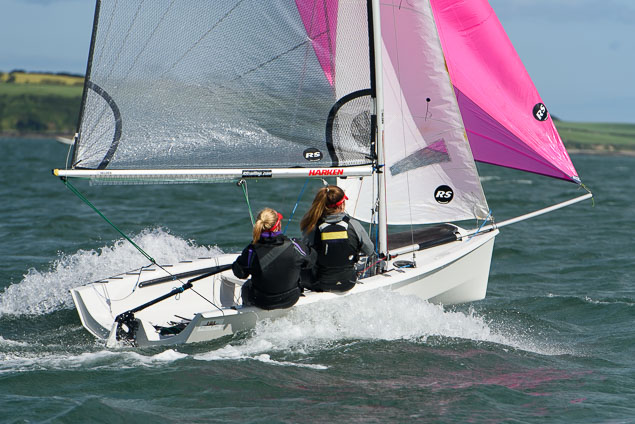
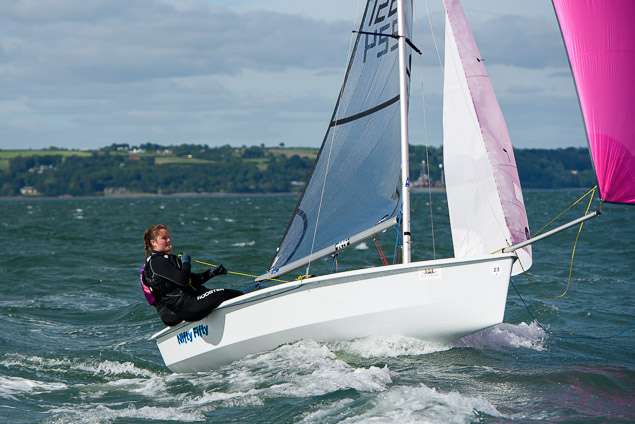
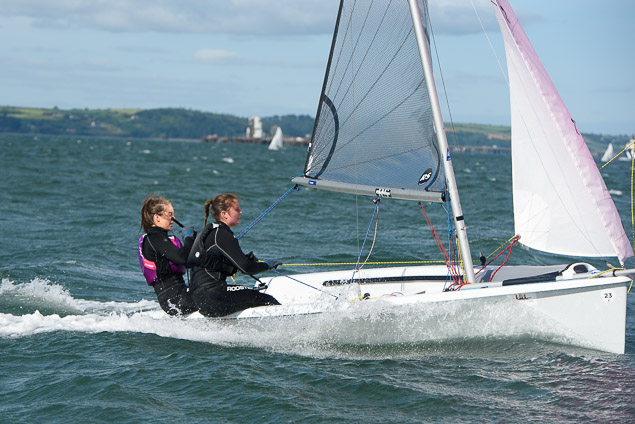
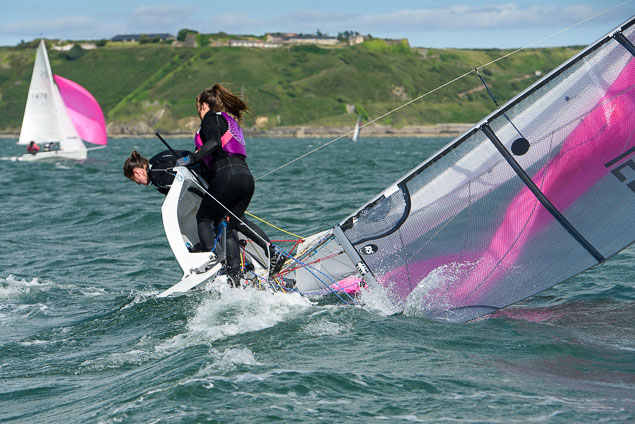
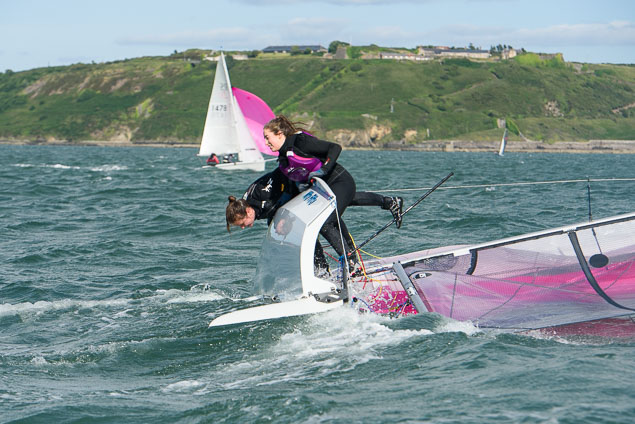
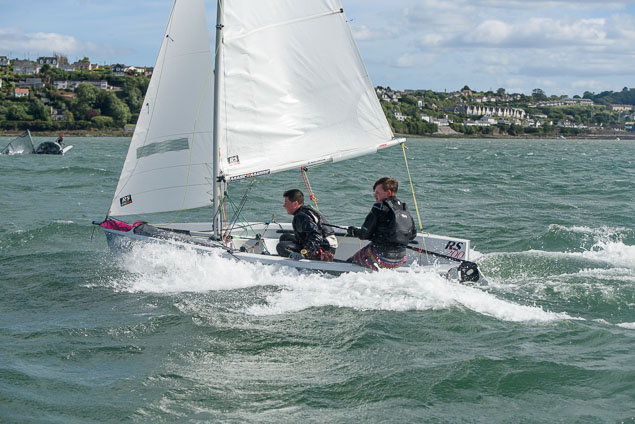
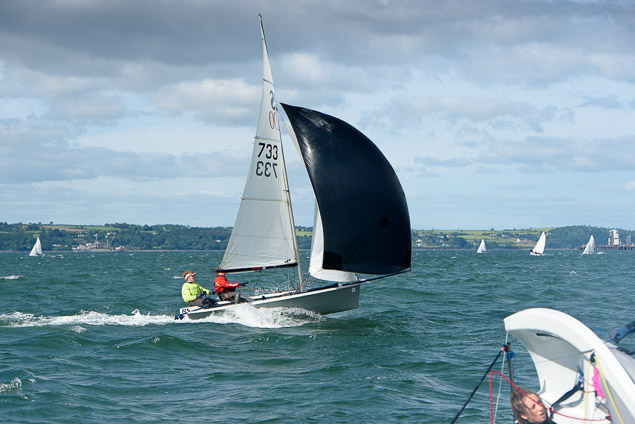
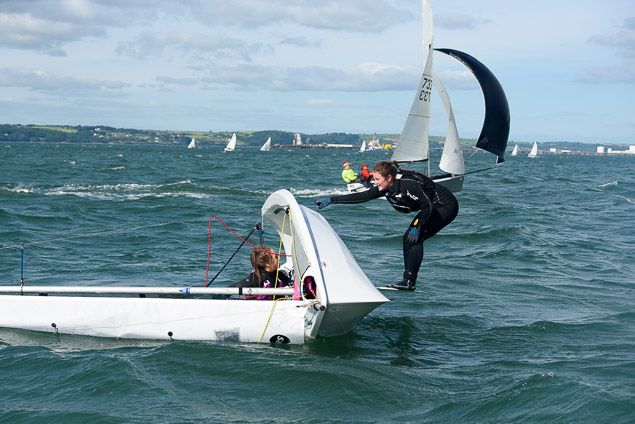
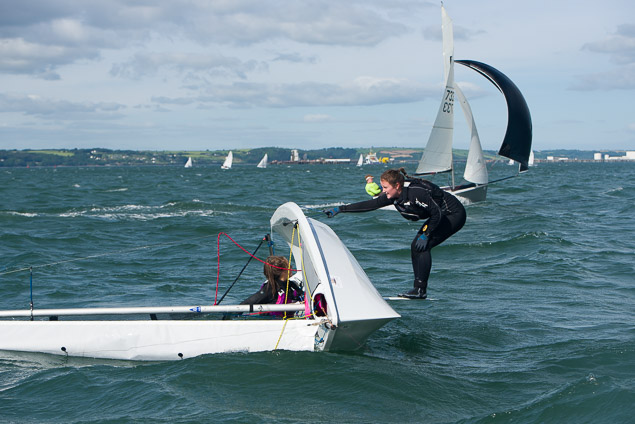
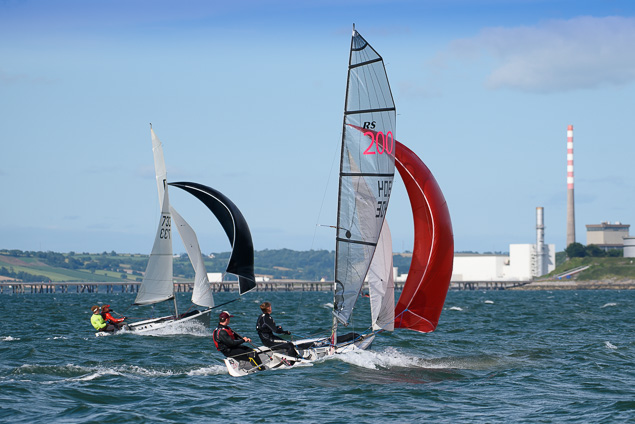
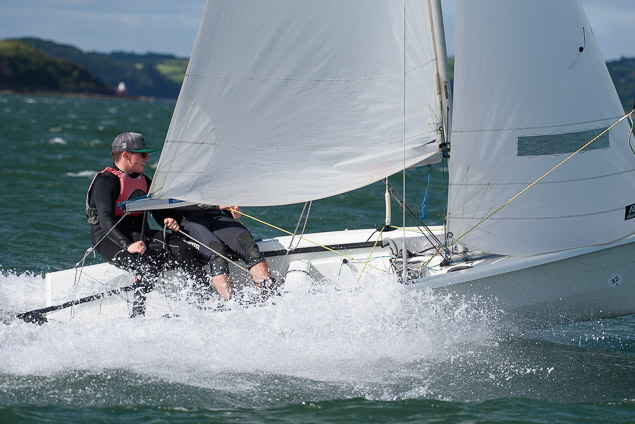
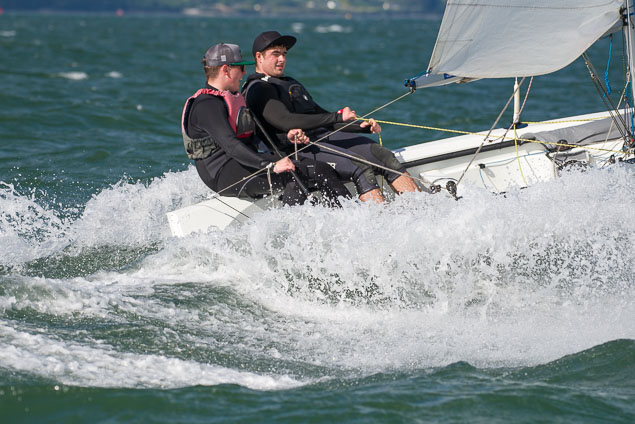
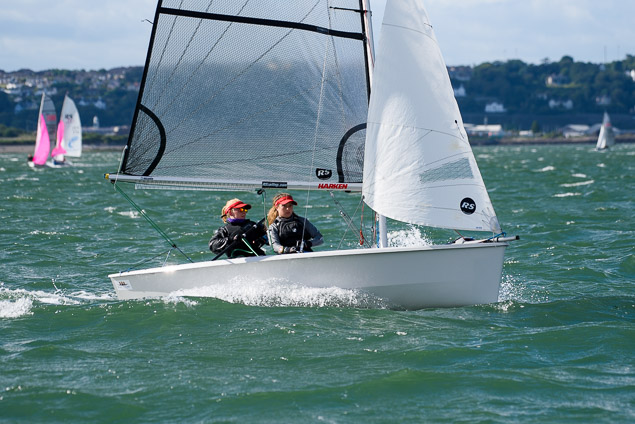
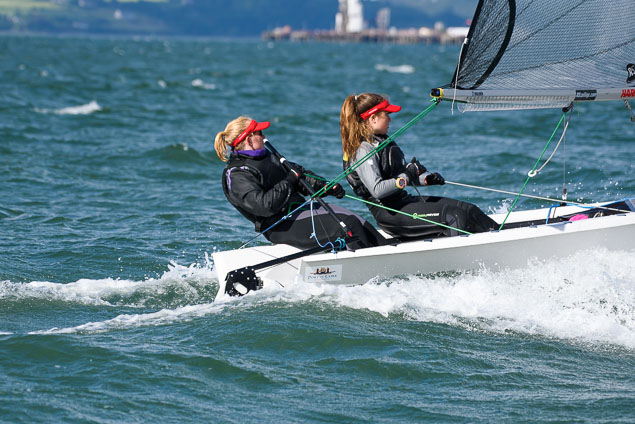
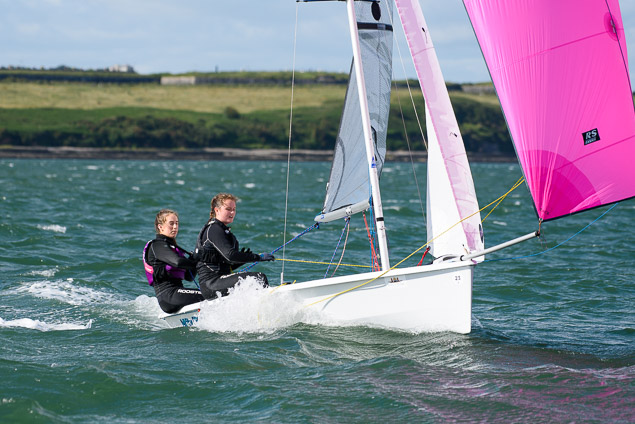
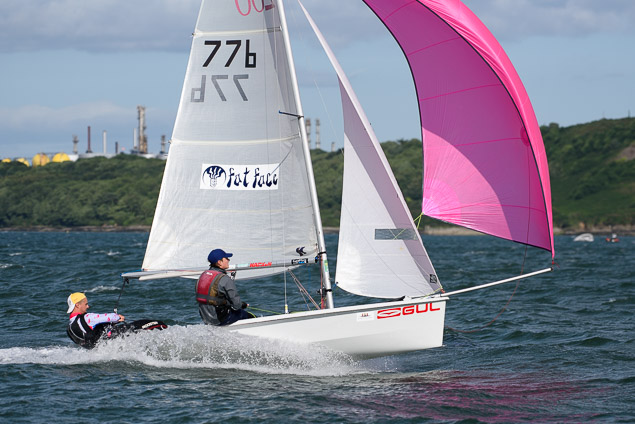
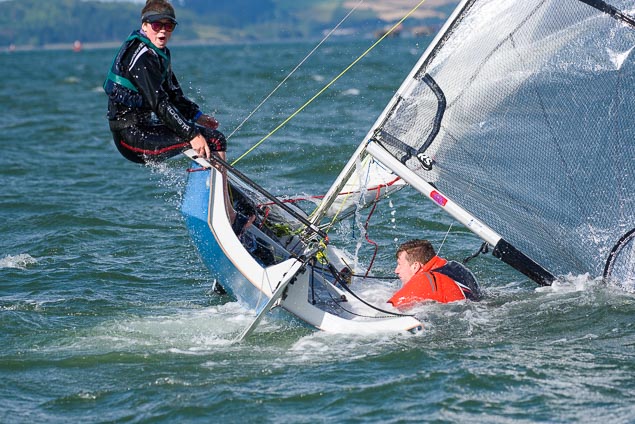
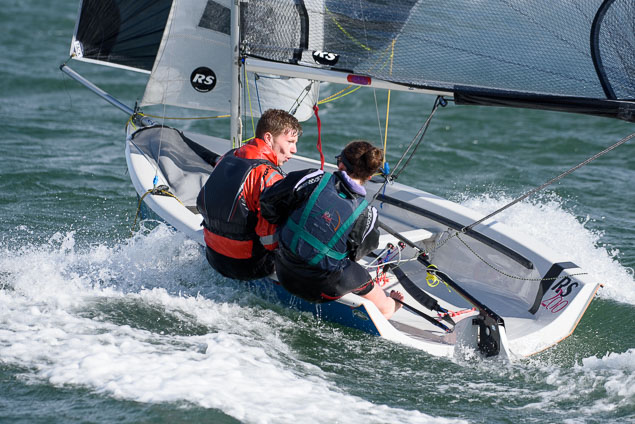
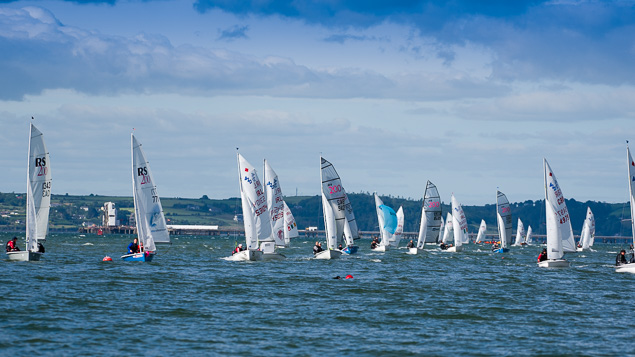
Royal Cork Dinghy Fest Attracts Multiple Championships for Weekend of Centreboard Action
Cork Harbour's own Alex Barry will be out to retain his southern title in the RS400 class as part of Royal Cork's Dinghyfest that starts tomorrow. It's one of a number of championships being staged as part of the Crosshaven initiative to foster dinghy sailing.
Barry, the current holder of the ISA's All Ireland Sailing title is also a keen National 18 sailor but campaigning his RS400 takes priority this weekend. The passionate centreboard sailor has spoken previously to Afloat.ie about plans to keep dinghy sailing alive. 'Friendships Through RS Sailing is the key to future of dinghy classes', the All Ireland Champ told Afloat.
Running as part of the weekend – that looks certain to attract over 100 boats – is the RS 200 Euro Cup & Irish National Championships, the National 18 National Championships, the RS Feva and RS 400 Southern Championships plus a PY fleet and an Optimist fun Fleet.
In the RS400, Ballyholme's Gareth Flanigan leads the challengers with Baltimore's top Laser sailor Fionn Lyden also entered in the double–hander.
There will be four course areas with two inside Roche’s Point at Cuskinny and the Curlane Banks while two more course areas will be in the outer harbour between Roche’s Point and Power Head.
The RS200 and the larger RS400 will sail together while the International 420s and the National 18s will be in the same group on an outer courses. The Irish 420 fleet is buoyed up by some international results scored last week at Kiel Regatta, Germany.
Prizes are provided by event sponsors CH Marine and their Zyck range of sailing gear.
Racing gets underway on Friday for the start of the national championships in the RS200 and 420 classes while the total DinghyFest will be afloat over the weekend including the foiling Moth class from 2.30pm on Saturday where John Chambers is also expected to debut his Waszp dinghy too.
Govt Dept Doesn't Recognise RCYC As ‘Oldest in the World’
Apparently someone in the Department of the Marine doesn’t accept that the Royal Cork Yacht Club at Crosshaven is correct when the club says it is “the oldest in the world...” writes Tom MacSweeney.
On behalf of Marine Minister Michael Creed the Department issued a press release today congratulating Cork on being chosen as the city to host European Maritime Day in 2020. The press release said: “European Maritime Day 2020 will also coincide with the 300 year anniversary of the Royal Cork Yacht Club (RCYC), one of the oldest yacht clubs in the world.”
The RCYC has always stated itself to be “the oldest yacht club in the world.....” The club describes itself as: “The Royal Cork Yacht Club is based in Crosshaven, Cork, Ireland and is the world's oldest yacht club founded in 1720.”
Cork City Council repeated the Department statement in its press release. A few years ago at the opening of Sea Fest in the National Maritime College in Ringaskiddy a Junior Minister used the same Department description of the RCYC. Seems somebody up there in Dublin doesn’t appreciate the RCYC!!! My information is that it the Department disputes the RCYC claim and references the Neva Yacht Club in St Petersburg!!!! Whatever about the Department, does Cork City Council take the same view, I wonder?
The Neva Yacht Club, is a sailing club located in Saint Petersburg, close to the Neva River. Wikipedia says it that was founded in 1718, and was re-established as a club in 1958. There is no evident claim to this on its own club website. Could Putin have his eye on the RCYC’s claim?
Tom MacSweeney is a member of RCYC
Cork Announced as Host City for European Maritime Day 2020, Coincides With Royal Cork Yacht Club 300th Anniversary
The Minister for Agriculture, Food and the Marine, Michael Creed T.D., has congratulated Cork City on being designated as the host city for European Maritime Day in 2020 by the Council of the European Union. European Maritime Day is the flagship event in the European Union’s maritime calendar, consisting of a two day conference with over 1,000 stakeholders from across the European Union coming together to discuss the development of this sector.
This will be the first time that Ireland has hosted this flagship event. SeaFest, Ireland’s national maritime festival, will take place in Cork Harbour in conjunction with the conference.
Speaking on foot of the announcement, Minister Creed said “My congratulations to Cork City on securing this prestigious event for the city. Cork is the ideal location for European Maritime Day and it was my honour to support the nomination. Cork is a vibrant, bustling port city with a dynamic and energetic marine community, as well as rich maritime history.”
The Minister continued ”European Maritime Day in 2020 will coincide with the 300th anniversary of the Royal Cork Yacht Club, one of the oldest yacht clubs in the world. 2020 also coincides with a target date set in our national integrated maritime plan, Harnessing Our Ocean Wealth, and so presents an opportunity to demonstrate to our European colleagues how Ireland has developed this vital sector of our economy. In conjunction with the conference our national maritime festival, SeaFest, will take place in Cork. This festival has truly captured the public imagination with an attendance of 60,000 in Galway in July in 2016. It is this enthusiasm, this embracing of our maritime culture that we can bring to the hosting of European Maritime Day in 2020.”


























